
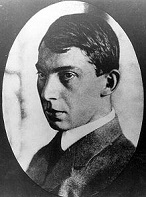
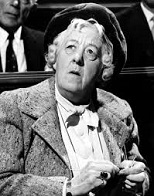
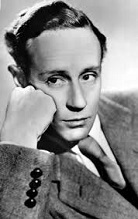
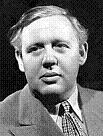
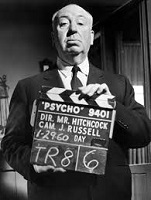
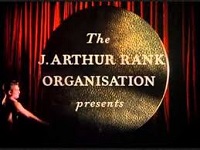
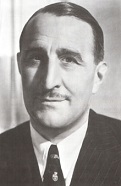
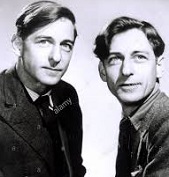
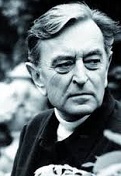
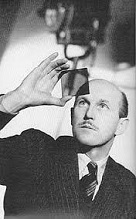
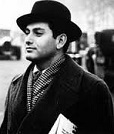
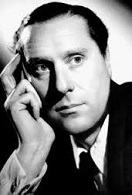
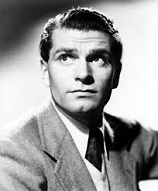

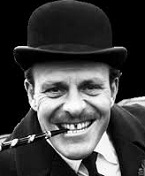
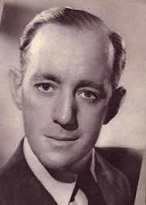
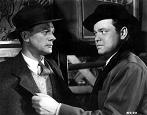


















TLW's British Cinemascope™ (British Cinemascope) |
By T.L. Winslow (TLW), the Historyscoper™ |
© Copyright by T.L. Winslow. All Rights Reserved. |
Original Pub. Date: Nov. 14, 2016. Last Update: July 24, 2025. |
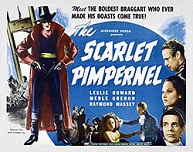
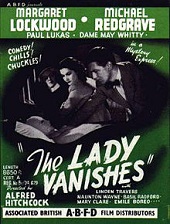
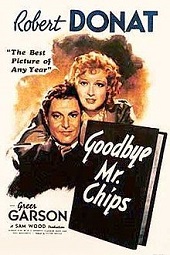
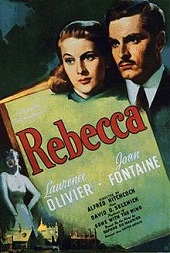
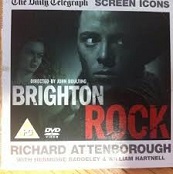
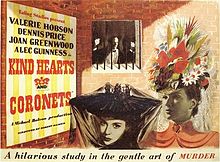
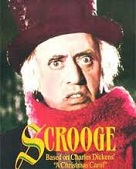

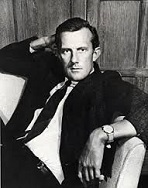
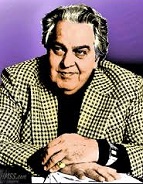
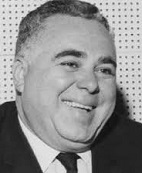
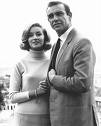
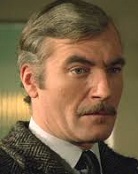
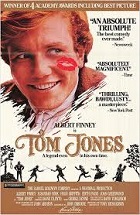
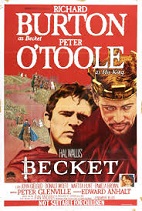


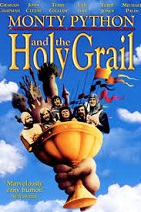

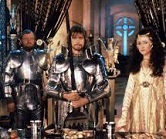
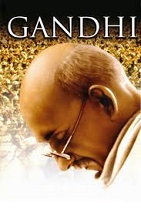
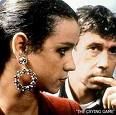
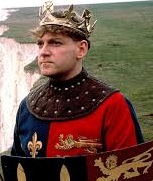
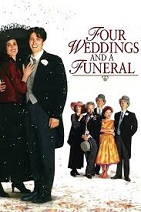

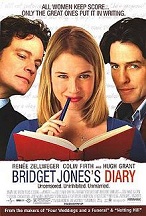
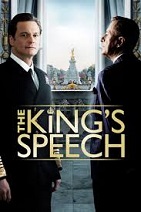
Westerners are not only known as history ignoramuses, but double dumbass history ignoramuses when it comes to British cinema history. Since I'm the one-and-only Historyscoper (tm), let me quickly bring you up to speed before you dive into my Master Historyscope.
The British film industry developed separately from Hollywood, a love-hate relationship, with several top talents abandoning Britain for Hollywood incl. Charlie Chaplin, Bob Hope, Cary Grant, Elizabeth Taylor, and Richard Burton; the lack of a U.S.-style First Amendment forever holds the British film industry back?
In Apr. 1737 Henry Fielding's political satire The Historical Register for the Year 1736 debuts, knocking the admin. of PM (1721-42) Robert Walpole and causing so much alarm among English authorities that they pass the Licensing Act of 1737, putting theaters under the direct control of the Lord Chamberlain (until 1968), ending Fielding's dramatic career; the number of London theaters is restricted; modified by the Theatres Act of 1934, and repealed by the Theatres Act of 1968.
In 1843 the Theatres (Regulation) Act of 1843
is passed in Britain, amending the 1737 Licensing Act by restricting the Lord Chamberlain's power to only prohibit the licensing of
plays that in his opinion "is fitting for the preservation of good manners, decorum or of the public peace", giving powers to
local authorities to license theaters, breaking the monopoly of the patent theaters and encouraging the building of saloon theaters
and music halls; it is repealed by the Theatres Act of 1968.
In 1852 the 700-seat Canterbury Music Hall
is founded on the site of a former skittle alley next to the Canterbury Tavern at 143 Westminster Bridge Rd., Lambeth, London
by Hackney, London-born impresario Charles Morton (1819-1904),
becoming the first purpose-built music hall (term coined by Morton)
in Britain, spawning hundreds of imitators and causing Morton to become known as "the Father of the Halls"; it is destroyed by Nazi bombing in 1942.
On June 21, 1889 after making the first moving pictures on celluloid film last year in Hyde Park, London,
Bristol-born English portrait photographer William Freeze-Frame, er,
William Friese-Greene (1855-1921)
receives patent #10,131 for his Chronophotographic Camera, which can take 4-5 (up to 10?) photographs per sec.
using peforated celluloid film, and sends info. on it to Thomas Edison, who is busy developing his Kinetoscope;
too bad, the low frame rate causes it to become a flop, and he goes bankrupt in 1891; he then invents
Biocolour,
using B&W film with two different colored filters, and alternate frames of the monochrome print stained red or green.
In 1897 Warwick Trading Co.
in London, England, managed by Cincinnati, Ohio-born Charles Urban (1867-1942)
acquires the rights to films by the Lumiere brothers; in 1903 Urban founds the
Charles Urban Trading Co. in Brighton
to produce educational, scentific, and travel films, incl. coverage of the 1904-5 Russo-Japanese War, expanding
to fiction and sci-fi; in May 1908 Urban introduces the Kinemacolor
2-color red-green additive motion picture system, which becomes a worldwide success; too bad, in 1915 after a lawsuit
by rival William Friese-Greene, inventor of the Biocolour System invalides his patent, the co. folds.
In 1898 Bamforth & Co. Ltd.
in West Yorkshire, England, maker of lantern slides begins producing silent monochrome films, often featuring a char. named Winky,
inventing film editing with "The Kiss in the Tunnel" (1899); in 1910 they begin producing dirty seaside postcards, which become
so popular that they end their filmmaking in 1915 after 100+ films.
In 1898 Gaumont British Picture Corp.
is founded as a subsidiary of the French Gaumont Film Co., opening
Lime Grove Studios
in Shepherd's Bush, West London in 1915, becoming the first bldg. built in Britain solely for film production;
in 1920 it opens Islington (Gainsborough) Studios,
where Alfred Hitchcock gets his start as an intertitle writer, going independent in 1922 before being acquired in 1927 by
Gainsborough Pictures; it is acquired by the BBC in 1949 and used for TV.
In 1898 Hepworth Studios
is founded in Walton-on-Thames, Surrey, England by
Cecil Milton Hepworth (1874-1953),
going on to produce "The Beggar's Deceit" (1900) followed by 25 more films incl. "Comin' Thro the Rye" (1923),
which are all lost when the negatives are melted down to sell the silver; on Oct. 17, 1903 he releases
Alice in Wonderland,
becoming the first film adaptation of the Lewis Carroll book, featuring special effects incl. Alice shrinking in the Hall of Many Doors,
getting stuck in the White Rabbit's house, and reaching for help through a window; in 1926 it becomes Nettlefold Studios; it closes in Mar. 1961.
In 1902 Ealing Studios
is founded in the White Lodge in Ealing Green, W London, England by
William George "Will" Barker (1868-1951),
going on to become the oldest continuously-operating film studio on Earth; in 1931 it begins filming talkies; after WWII it releases
a series of classic films incl. "Kind Hearts and Coronets" (1949), "Passport to Pimlico" (1949), "The Lavender Hill Mob" (1951), and
"The Ladykillers" (1955); in 1955-95 it is acquired by the BBC.
In Apr. 1903 Frank Mottershaw (1850-1932)
of Sheffield, Yorkshire, England produces the film
A Daring Daylight Burglary,
followed in Sept. by "The Robbery of the Mail Coach", pioneering the chase movie.
In 1909 after a number of nitrate film fires, the British Cinematograph Act of 1909
is passed to control film theaters for health and safety reasons; next year the act is extended to the film content, causing filmmakers to hustle
to stave off govt. intervention.
In 1911 Ideal Film Co.
is founded in Soho, London, England by brothers Harry Moses (1875-1951) and Simon Rowson (Rosenbaum) (1877-1950), sons of a Polish Jewish immigrant
butcher, starting out as a film distributor then producing films in 1916, acquiring Elstree Studios in Borehamwood from the Neptune Film Co. in 1917,
merging in 1927 with Gaumont British and distributing films under its own name until 1934, distributing 400 films and producing 80, incl.
its biggest hit The Life Story of David Lloyd George (1918),
which actually isn't a hit since it's bought by the real David Lloyd George for £20K and locked up until 1996.
On Oct. 3, 1912 Sidney Olcott's From the Manger to the Cross; or, Jesus of Nazareth
(Kalem) debuts in London, filmed on location in Palestine, written by Gene Gauntier, who plays Virgin Mary, becoming a hit in the U.K. and U.S.,
doing $1M+ box office on a $35K budget; too bad, the London Daily Mail pub. the headline "Is nothing sacred to the film maker?", causing
the British Board of Film Censors to be founded in London in Dec.
by members of the film industry to classify and censor films in the U.K. to stave off govt. intervention, with filmmakers having to pay to have their
films reviewed after it begins operation on Jan. 1, 1913; in 1984 it changes its name to British Board of Film Classification, expanding to
home videos and video games.
In 1913 Stockton-on-Tees, England-born stage dir.
Maurice Elvey (1887-1967)
switches to films, starting with "The Great Gold Robbery" (1913), followed by "The Suicide Club" (1914), "Love in a Wood" (1916),
"The Man Who Saved the Empire" (1918), "The Hound of the Baskervilles" (1921), going on to mentor dirs. Carol Reed, David Lean,
and Ronald Neame and discover singer Petula Clark in 1944 at the Royal Albert Hall, giving her a part in "Medal for the General" (1944);
he goes on to dir. almost 200 films by 1957 and produce 50+ films, becoming the most prolific film dir. in British history (until ?).
On Aug. 4, 1914 - Nov. 11, 1918 the horrific World War I
causes 15M deaths and 39M military casualties, and destroys the Old Order of white formerly Christian Europe; Charlie Chaplin is eligible to be called up
for war duty by both the U.S. and Britain, but never is.
In 1914 Elstree Studios
is founded in Borehamwood and Elstree, Hertfordshire, England by Neptune Film Co., which closes in 1917 after selling-out to
Ideal Film Co., who sells-out in 1928 to German inventor
Ludwig (Louis) Blattner (1881-1935),
who installs electricity and introduces his Blattnerphone magnetic steel tape sound recording system, which is adopted by the BBC in 1930; in
1934 after competition from rival talking picture systems, it is taken over by Am. producer
Joe Rock (Simburg) (1893-1984),
producing "Strictly Illegal" (1935), "The Man Behind the Mask" (1936), "Boys Will Be Girls" (1937), and "The Edge of the World" (1937); in
1939-48 it is acquired by British Nat. Films Co.; in 1984 it becomes the BBC Elstree Centre.
In 1919 Astra Films
is founded in Leeds, England by Herbert Sydney Wilcox (1890-1977),
producing "The Breed of the Treshams" (1920), "Cherry Ripe" (1921), "The Street of Adventure" (1921), "The Double Event" (1921),
"The Wonderful Story (1922), "Paddy the Next Best Thing" (1923), "Southern Love" (1924), and "Decameron Nights" (1924),
becoming one of the top British film studios until the Big Slump of 1924.
In 1919 Kew Bridge Studios
is founded in Kew Bridge, Brentford, West London in a converted theater, hosting independent filmmakers incl. Guy Newall and Walter West;
it closes in 1914.
On May 30, 1920 Chester Withey's Romance
(United Artists) debuts, based on the 1913 Edward Sheldon play, starring St. Joseph, Mich.-born
Doris Keane (1881-1945) as opera singer Madame Cavallini, and her hubby (1918-25),
St. Osyth, Essex, England-born Basil Sydney (1894-1968)
in his film debut as Bishop Armstrong; he goes on to appear in 50+ films.
In 1920 Cricklewood Studios
is founded in Cricklewood, London, England from a converted airplane factory by Australian-born Sir
Oswald Stoll (1866-1942)
for his cos. Stoll Pictures (founded Apr. 1918) and
Surbiton Studios (founded 1918),
becoming the largest film studio in Britain until ?, hiring dir. Maurice Elvey and producing "The Four Feathers" (1921)
along with Fu Manchu and Sherlock Holmes film series; it closes in 1938.
In 1920 Forest Hill, London-born Leslie Howard (Steiner) (1893-1943)
and Adrian Brunel (1892-1958)
found Minerva Films, with investors incl. H.G. Wells and board members incl. A.A. Milne; too bad, the distributors lowball them and they
go defunct, after which Howard moves to Hollywood and launches a stellar acting carrer which incl. "Of Human Bondage" (1934),
"The Petrified Forest" (1936), which relaunches the career of his lifelong Am. friend Humphrey Bogart, "Pygmalion" (1938), "Intermezzo" (1939),
and "Gone with the Wind" (1939), after which he returns to England, starring in "49th Parallel" (1941) et al. until he his plane is shot
down over the Bay of Biscay on June 1, 1943.
Meanwhile in 1923 Brunel begins directing sophisticated comedy burlesque short films, along with feature films incl.
"The Man Without Desire" (1923), "Blighty" (1927), "The Constant Nymph" (1928), "The Vortex" (1928), "The Crooked Billet" (1929),
"Two Wives for Henry" (1933), "The Laughter of Fools" (1933), "Little Napoleon" (1933), "I'm an Explosive" (1933), "Follow the Lady" (1933),
"Taxi to Paradise" (1933), "Important People" (1934), "Badger's Green" (1934), "Vanity" (1935), "The Invader" (1935),
"City of Beautiful Nonsense" (1935), "While Parents Sleep" (1935), "Prison Breaker" (1936), "The Rebel Son" (1938), and
"The Lion Has Wings" (1939).
In 1922 Alfred Hitchcock's B&W Number 13 (Mrs. Peabody)
is the dir. debut of London-born Alfred Joseph Hitchcock (1899-1980);
too bad, the budget falls through, and it is never finished; Hitchcock goes on to direct 50+ films over six decades, becoming the #1 film director of all time?;
he becomes known for cameo appearances in his own films, innovative movement of the camera, innovative editing, icy blonde female chars., twist endings,
and Freudian sexual overtones, becoming known as "the Master of Suspense".
In 1922 Beaconsfield Film Studios
is founded in Beaconsfield, Buckinghamshire by producer
George Clark (1888-1946) and
actor-dir. Guy Newhall (1885-1937),
selling-out to British Lion Film Corp. in 1929, going on to produce Britain's first talkie, and found a film-TV production school in 1971
that results in the animated chars. Wallace and Gromit.
In 1924 Gainsborough Pictures
is founded in Hoxton, Shoreditch London on the S bank of Regent's Canal by Sir
Michael Elias Balcon (1896-1977);
in 1927 it becomes sister co. to Gaumont British, which acquires Islington Studios; it closes in 1951.
In 1924 the Slump of 1924
in Britain causes many film studios to close.
In Sept. 1927 Herbert Wilcox's Mumsie
(Twickenham Studios), produced by Wilcox, based on a play by Edward Knoblock stars Nelson Keys as WWI coward Spud Murphy, and is the last silent film
of Pauline Frederick as Mumsie; the film debut of London-born stage star
Herbert Brough Falcon Marshall (1890-1966)
(husband of Edna Best in 1928-40, who lost a leg in WWI) (as Col. Armytage), who jumps ship to Hollywood on the film's success, returning to Britain
occasionally but spending most of his career in the U.S.
In Nov. 1927 Victor Saville's The Arcadians
(Gaumont British Picture Corp.) debuts, based on the 1909 Alexander M. Thompson Edwardian comedy musical, filmed at Lime Grove Studios
in Shepherd's Bush, starring Ben Blue as Simplicitas Smith, Jeanne De Casalis as Mrs. Smith and Vesta Sylva as Eileen Cavanaugh; the
dir. debut of Birmingham-born producer Victor Saville (1895-1979),
who directs 39 films in 1927-54, and produces 36 films in 1923-62.
In Nov. 1927 British Lion Films
is founded by Sam W. Smith, releasing 55 films by 1945 incl. "In Which We Serve" (1942);
in 1946 it is acquired by Sir Alexander Korda, who also acquires Shepperton Studios; in Jan. 1955 it declares bankruptcy, and is
reformed with new mgt., and dirs. Frank Launder, Sidney Gilliat, and the Boulting Brothers, cranking out 155 films by 1976, when
it is acquired by EMI.
On Dec. 20, 1927 the Cinematograph Films Act of 1927
is enacted in Britain (effective Apr. 1, 1928), requiring British cinema to show a quota of British films for the next 10 years in
the hopes that the British film industry can match Hollywood in vertical integration; too bad, it results in a host of cheap inferior
"quota quickies"; the Cinematograph Films Act of 1938 removes films shot by British Empire nations outside Britain, and repealed by
the Films Act of 1960.
In 1927 Associated British Picture Corp. (ABPC)
(originally British Internat. Pictures [BIP] until 1933)
is founded by Glasgow-born Scottish atty. John Maxwell (1879-1940)
by the merger of British Nat. Studios, Elstree Studios, and his
ABC (Associated British) Cinemas,
hiring Alfred Hitchcock as their main dir. until 1933, when he leaves to work for rival Gaumont British, which overtakes them as the
largest British film producer by 1937, when it acquires British Pathe, growing to 500 cinemas in Britain by 1943; in 1940-69 Warner Bros.
acquires a part-interest in the studio, along with a stake in its distribution arm Warner-Pathe in 1958-69, vertically integrating with
the Rank Org.; in 1970 it is acquired by EMI.
On Feb. 9, 1928 Sinclair Hill's The Guns of Loos
(Stoll Pictures) debuts, starring Henry Victor as a blind WWI vet who returns to run his family's industrial empire; the film debut of
West Bromwich, Staffordshire-born blonde-blue actress Edith Madeleine Carroll (1906-87) as Diana Cheswick.
In 1928 Union Cinemas
is founded in Britain by wool firm magnate David Bernhard and his son Charles Frederick Bernhard, buying cinemas throughout
Britain and renaming them Ritz; meanwhile in 1928
Odeon Cinemas (Oscar Deutsch Entertains Our Nation?)
is founded in Brierly, Staffordshire, England by Oscar Deutsch (1893-1941),
becoming known for art deco architecture and comfortable accomodations for middle-class customers, growing to 250 theaters by 1937,
joining the Rank Org. after Deutsch's death in 1941.
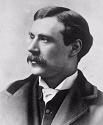
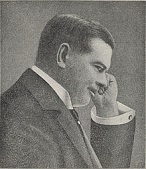
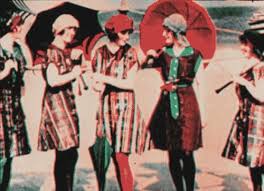
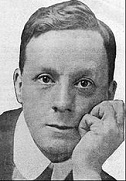
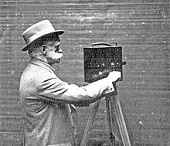
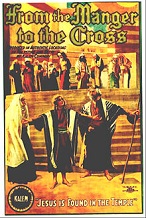
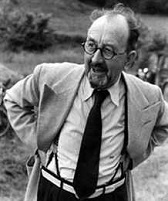
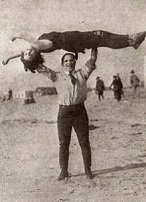
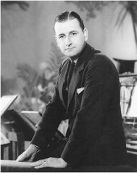

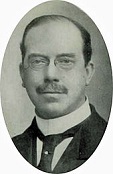

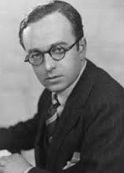

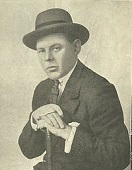

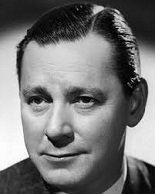
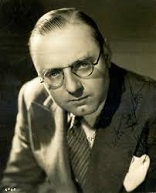
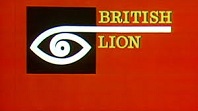
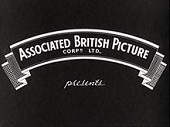
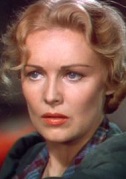
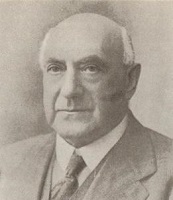
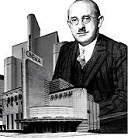

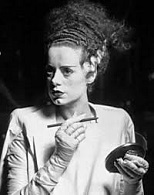
In 1928 Scarborough, North Riding of Yorkshire-born British stage actor Charles Laughton (1899-1962) begins appearing in small roles in British films with his future (1929) Lewisham, London-born wife Elsa Sullivan Lanchester (1902-86), incl. "Burglar", "Lecherous Boarder", and "A Nightclub Diner".
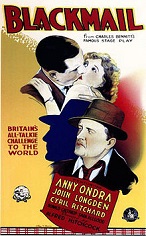
On June 30, 1929 Alfred Hitchcock's Blackmail ("A Romance of Scotland Yard") (British Internat. Pictures) debuts, starring Anny Ondra as Alice White, who kills her rapist with a bread knife, after which her beau Frank Webber (John Longden), a Scotland Yard dick tries to protect her, while a rascal who saw the murder steals the bread knife and tries to blackmail her; Cyril Ritchard plays artist Mr. Crewe; Britain's the first successful British/Euro talkie after being filmed silent and reworked; made at the new British and Dominions Imperial Studios in Borehamwood, Hertfordshire, the first purpose-built sound studio in Europe, which goes on to produce "The Private Life of Henry VIII" (1933) and "Lancashire Luck" (1937) before burning down on Feb. 9, 1936, causing "London Melody" (1937) to be completed at Pinewood Studios.
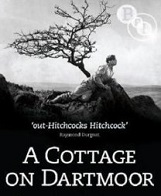

In Oct. 1929 Anthony Asquith's A Cottage on (Escape from) Dartmoor (British Instructional Films) debuts, a silent film starring Norah Baring as Sally, and Uno Henning as Joe, becoming the last of the first four silent films by London-born dir. Anthony Asquith (1902-68), son of Liberal British PM (1908-16) Herbert Henry Asquith (1852-1928), establishing his rep. for meticulous, emotionally-moving frame composition.
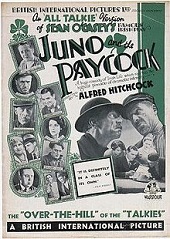
On June 29, 1930 Alfred Hitchcock's Juno and the Paycock debuts, based on the 1924 Sean O'Casey Dublin Trilogy play set in the slums of Dublin during the Irish Civil War of 1922-3, starring Barry Fitzgerald as the Orator, Edward Chapman as loafing boozing Capt. Jack Boyle, and Sara Algood as his wife Juno, who him a "paycock", i.e., peacock for his uselessness.
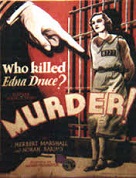
On July 31, 1930 Alfred Hitchcock's B&W Murder! (British Internat. Pictures) (Wardour Films) debuts, based on the novel-play "Enter Sir John" by Clemence Dane and Helen Simpson, starring Norah Baring as traveling stage actress Diana Baring, who is accused of murdering fellow actress Edna Druce, and is convicted after lone holdout juror Sir John Menier (Herbert Marshall) flops, after which he turns detective and discovers the real murderer Handell Fane (Esme Percy); watch movie.
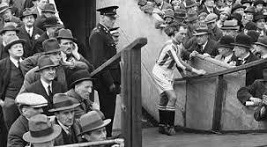

In 1930 Jack Raymond's The Great Game (British Council Films) debuts, becoming the first major British film about British football (soccer), starring Dicky Brown as player John Batten of the Manningford F.C., becoming the first credited film appearance of Huyton, Lancashire-born Sir Reginald Carey "Rex" Harrison (1908-90) as George.
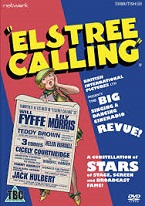
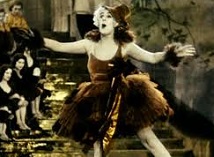
In 1930 Andre Charlot's, Jack Hulbert's, Alfred Hitchcock's, and Paul Murray's Elstree Calling ("A Cine-Radio Review") (British Internat. Pictures) debuts, starring Teddy Brown, Tommy Handley, Jack Hulbert, Anna May Wong et al., becoming Britain's answer to the lavish Hollywood musical film reviews incl. "Hollywood Revue of 1929" (1929) and "Hollywood on Parade" (1930), becoming the first film to directly mention television; too bad, it can't afford Yankee Technicolor, lamely trying to imitate it with the Pathecolor process which uses stencils to color selected areas of B&W prints.

In 1930 Dorking, Surrey-born British stage actor Laurence Kerr "Larry" Olivier, Baron Olivier (1907-89) begins his British film career with small roles in two films, The Temporary Widow and Too Many Crooks, going on to appear in 50+ films.
 In July 1931 Maurice Elvey's Sally in Our Alley
(Associated Talking Pictures) debuts, becoming the film debut of Gracie Fields (Grace Stansfield) (1898-1979),
who sings Henry Carey's 1725 Sally in Our Alley, making her a British film star.
In July 1931 Maurice Elvey's Sally in Our Alley
(Associated Talking Pictures) debuts, becoming the film debut of Gracie Fields (Grace Stansfield) (1898-1979),
who sings Henry Carey's 1725 Sally in Our Alley, making her a British film star.
In 1931 Shepperton Studios (originally Sound Film Producing & Recording Studios) is founded in Shepperton, Surrey, England by Scottish businessman Norman Loudon, going on to produce "Reunion" (1932), "Colonel Blood" (1934), "Lest We Forget" (1934), "Youthful Folly" (1934), "Designing Women" (1934), "Radio Pirates" (1935), and "Rolling Home" (1935); in 1941 the govt. uses it for sugar storage and to manufacture decoy aircraft for the Middle East; in 1945 it is acquired by Sir Alexander Korda; in Jan. 1955 it is put under new mgt. under the name British Lion Films Ltd., going on to produce "I'm All Right Jack" (1959), "The Guns of Navarone" (1961), "Dr. Strangelove" (1964), and "Oliver!" (1968).
In 1931 the British Kinematograph, Sound and Television Society is founded in London, England to serve the British film industry.

In 1932 London Films Productions is founded by Hungarian-born Sir Alexander Korda (Sandor Laszlo Kellner) (1893-1956); in 1936 it is based at Denham Film Studios in Buckinghamshire near London, going on to produce "Wedding Rehearsal" (1932), "The Private Life of Henry VIII" (1933), "Things to Come" (1936), "Rembrandt" (1936), and "The Four Feathers" (1939); in 1939 it is acquired by Rank and merges with Pinewood Studios to form D&P Studios; in 1949 it is based in Shepperton, producing "The Third Man" (1949), and "The Sound Barrier" (1952); it goes defunct after the Jan. 23, 1956 death of Korda.
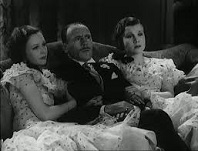
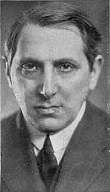
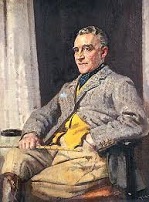
On Oct. 1, 1932 Alexander Korda's B&W Wedding Rehearsal (London Films), produced by Alexander Korda stars Roland Young as carefree bachelor Reggie, marquis of Buckingham, who is given an ultimatum by his grandmother the dowager marchioness of Buckminster (Kate Cutler) to get married or lose his allowance; the first pairing of screenwriters Lajos Biro (Bíró) (Blau) (1880-1948) and Arthur Harold Wimperis (1874-1953).
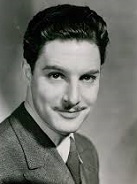
In 1932 Zoltan Korda's and Leontine Sagan's Men of Tomorrow (London Film Co.) (British Paramount) (British & Dominions Film Corp.) debuts, written by Athur Wimperis and Anthony Gibbs, starring Maurice Braddell as Oxford U. grad Allen Shepherd, who becomes a successful novelist and marries Jane Anderson (Joan Gardner), then freaks when she accepts a teaching job at Oxford U.; the film debut of Friedrich Robert Donat (1905-58) as Julian Angell, who gained the nickname "Screen Test Donat" because of his many unsuccessful auditions until he was about to flunk another one for Alexander Korda before breaking into a great laugh that gets him the job; too bad, he suffers from chronic asthma, appearing in only 20 films.
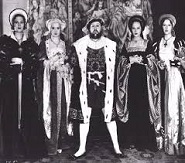
On Aug. 17, 1933 Alexander Korda's B&W The Private Life of Henry VIII (London Film Productions) debuts, starring Charles Laughton and a cast of thousands of bimbos, headed by Merle Oberon as Anne Boleyn, Wendy Barrie as Jane Seymour, Elsa Lanchester as Anne of Cleves, Binnie Barnes as Catherine Howard, and Everley Gregg (film debut) as Catherine Parr; first British film to be nominated for best picture Oscar; a best actor Oscar makes Laughton a star who gets all the parts he wants; does £750K box office on a £65K budget; "Six wives, and the best of them's the worst"; watch movie.
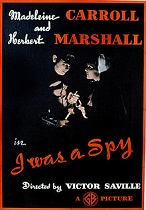
On Sept. 4, 1933 Victor Saville's B&W I Was a Spy (Gaumont British Pictue Corp.) (Fox Film Corp.) debuts, based on the 1932 memoir by Marthe Cnockaert, starring Madeleine Carroll as a Belgian nurse in occupied Belgium in 1914 who passes intel to the British and falls for German Commandant Oberaertz (Conrad Veidt); Herbert Mashall co-stars as Stephan; watch trailer.
In 1933 the British Film Inst. is founded to preserve and promote British films, establishing the Nat. Film Library in 1935, which becomes the Nat. Film Archive in 1955, Nat. Film and Television Archive in 1993, and BFI Nat. Archive in 2006; in 1951-2007 it runs the BFI Southbank (Nat. Film Theatre); on Oct. 16-26, 1953 it holds the first BFI London Film Festival; in spring 1986 it holds the first BFI Flare: London LGBT Film Festival.
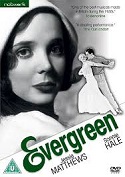
In Apr. 1934 Victor Saville's B&W Evergreeen (Gaumont British) debuts, produced by Michael Balcon based on the 1930 Rodgers-Hart musical "Ever Green", starring Jessie Margaret Matthews (1907-81) as Harriet Green singing Over My Shoulder, which becomes her theme song ("Over my shoulder goes one care/ Over my shoulder goes two cares/ Why should I cry? It's blue above/ I'm free at last and I'm in love."); watch movie.
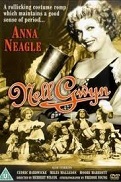
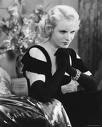
On Aug. 1, 1934 Herbert Wilcox's Nell Gwynn (United Artists) debuts, about English actress Nell Gwyn (1650-87), starring Cedric Hardwicke as her lover Charles II, making a British box-office star of blonde English dancer-actress Anna Neagle (Florence Marjorie Robertson) (1904-86), who ends up doing the rest of her flicks (until 1959) with Wilcox, marrying him in 1943.

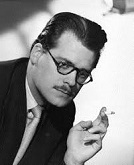
In Nov. 1934 Hammer Film Productions is founded in London, England by Hammer and Smith comedian William "Will" Hinds (1887-1957) AKA Will Hammer (named after Hammersmith, London), who produces a stream of schlock films until he loses interest and it folds in 1937; in 1946 Will's son Anthony Frank "Tony" Hinds (1922-2013) (AKA John Elder) joins Hammer Film Productions, founding Bray Studios in 1952 out of the run-down Down Place manor house on the Thames River near Bray, Berkshire, acquiring the rights to the Alan Quatermass sci-fi serial from BBC-TV in 1953 and producing "The Quatermass Experiment (Xperiment)" in 1955, which is a hit, going on to start producing Hammer Horror, vivid color versions of old B&W Gothic horror films along with some low-budget B&W "mini-Hitchcock" thrillers, becoming Britain's most successful film producer by 1964 until his 1970 retirement; films incl. "The Curse of Frankenstein" (1957) (starring Peter Cushing), "The Revenge of Frankenstein" (1958), "(Horror of Dracula" (1958) (starring Christopher Lee), "The Mummy" (1959), "The Brides of Dracula" (1960), "The Two Faces of Dr. Jekyll" (1960), "The Curse of the Werewolf" (1961), "Taste of Fear" (1961), "The Phantom of the Opera" (1962), "The Kiss of the Vampire" (1963), "The Evil of Frankenstein" (1964), "The Curse of the Mummy's Tomb" (1964), "The Gorgon" (1964), "She" (1965) (starring Ursula Andress), "Dracula: Prince of Darkness" (1966), "One Million Years B.C." (1966) (starring Raquel Welch), "The Witches" (1966) (starring Joan Fontaine), "Frankenstein Created Woman" (1967), "The Mummy's Shroud" (1967), "Dracula Has Risen from the Grave" (1968), "Frankenstein Must Be Destroyed" (1969), "The Horror of Frankenstein" (1970), "Taste the Blood of Dracula" (1970), "Scars of Dracula" (1970), "The Vampire Lovers" (1970), "Lust of a Vampire" (1971), "Blood from the Mummy's Tomb" (1971), "Vampire Circus" (1971), "Twins of Evil" (1971), "Dracula A.D. 1972" (1972), "The Satanic Rites of Dracula" (1973), "Frankenstein and the Monster from Hell" (1974), and "The Legend of the 7 Golden Vampires" (1974), ceasing production in 1979 after 295 films, then passing through a series of investors who finally begin producing more films in 2010, starting with "Let Me In" (2010), "The Resident" (2011), "The Woman in Black" (2012), and "The Quiet Ones" (2014). View clip.

On Dec. 23, 1934 Harold Young's The Scarlet Pimpernel (London Films) debuts, based on the 1905 play and 1908 novel by Baroness Orczy and produced by Alexander Korda, starring Leslie Howard as English dandy Sir Percy blakeney, leader of the Band of the Scarlet Pimpernel of 20 English aristocrats, "One to command, nineteen to obey", who wears a mask while aiding "innocent" French aristocrats fleeing the guillotine during the French Rev.; "They seek him here, they seek him there,/ Those Frenchies seek him everywhere./ Is he in Heaven? Is he in Hell?/ That damned, elusive Pimpernel."
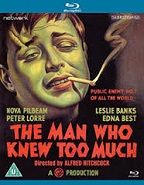
On Dec.9, 1934 Alfred Hitchcock's B&W The Man Who Knew Too Much (Gaumont-British Picture Corp.) debuts, named after the 1922 G.K. Chesterton detective story book, starring Leslie Banks and Edna Best as British couple Bob and Jill Lawrence on vacation in Switzerland, when their French friend Louis Bernard (Pierre Fresnay) is killed in their hotel while dancing with Jill, leaving a note with details of an internat. crime ring l ed by Abbott (Pierre Lorre), who kidnap their daughter Betty (Nova Pilbeam, who in 1939 marries Pen Tennyson, great-grandson of Alfred, Lord Tennyson), after which they return to England to search for her, get held hostage too after foiling the assassination of a Euro head of state at the Royal Albert Hall, and get in the middle of a giant police shootout, modeled after the 1911 Sydney St. Siege; remade in 1956 starring James Stewart and Doris Day; does ? box office on a £40,000 budget. watch movie.
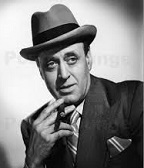
In Mar. 1935 Albert Parker's The Riverside Murder debuts, a British crime film based on "Les Six Hommes Morts" by Stanislas-Andre Steeman, starring Basil Sydney as Inspector Philip Winton, Judy Gunn as Claire Hanes, Zoe Davs as Mrs. Harris, Ian Fleming as Henry Sanders, and Edinburgh, Scotland-born West End stage star Alastair George Bell Sim (1900-76) in his film debut as Police Sgt. Mac McKay, who goes on to appear in 50+ British films.
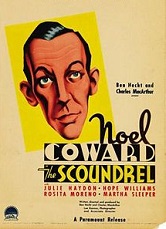
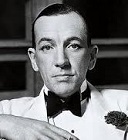
On Apr. 30, 1935 Ben Hecht's The Scoundrel (Paramount Pictures) debuts, written by Hecht and Charles MacArthur based on the life of hated alcoholic publisher-producer Horace Liveright (1884-1933), starring Teddington, London-born closet gay actor-playwright Sir Noel (Noël) Peirce Coward (1899-1973) in his film debut as Anthony Mallare, a mean publisher who ruins author Paul Decker (Stanley Ridges), then dies in a plane crash and whose ghost must walk the Earth until somebody sheds a tear for him, which turns out to be Cora Moore (Julie Haydon), Decker's girlfriend.
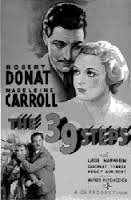

On June 6, 1935 Alfred Hitchcock's The 39 Steps (Gaunmont British Picture Corp.) debuts, based on the 1915 John Buchan novel "The Thirty-Nine Steps", starring Robert Donat (the English Cary Grant?) as Canadian Richard Hannay, a man mistakenly caught in an intrigue over a foreign spy org. in Scotland named you know what, ending up on the run from the police handcuffed to good-looking blonde babe Pamela (Madeleine Carroll), the dame who double-crossed him; Wylie Watson plays Mr. Memory, whose theme music gives him away; voted best British film of 1935, and 4th best of the 20th cent.; "It's not much of an exaggeration to say that all contemporary escapist entertainment begins with 'The 39 Steps'" (Robert Towne)'; makes Hitchcock an internat. star, and introduces horny Hitchcock's " ice cold blonde", with West Bromford, Staffordshire-born Madeleine Carroll (Marie-Madeleine Bernadette O'Carroll) (1906-87) becoming a star, after which she gets a major Am. film contract with Paramount Pictures, becoming the highest paid actress in the world in 1938 ($250K/year) before quitting to work in field hospitals as a Red Cross nurse after her sister Marguerite is killed in the London Blitz, becoming a U.S. citizen in 1943 and working at the U.S. Army Air Force 61st Station Hospital in Foggia, Italy in 1944; "The female characters in his films reflected the same qualities over and over again. They were blonde. They were icy and remote. They were imprisoned in costumes that subtly combined fashion with fetishism. They mesmerised the men, who often had physical or psychological handicaps. Sooner or later, every Hitchcock woman was humiliated" (Roger Ebert); Orson Welles' favorite Hitchcock film?; first of a trio of Hitchcock films about an innocent man going on the run, incl. "Saboteur" (1942) and "North by Northwest" (1959); watch movie.
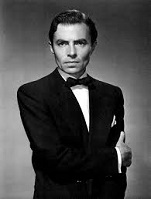
On Nov. 19, 1935 Albert Parker's Late Extra (Fox Film Co.) debuts, starring Alastair Sim and Virginia Cherrill, becoming the film debut of James Neville Mason (1909-84), who registers as a conscientious objector during WWII, gaining an exemption for film work to star in a series of quota quickies.

On Feb. 20, 1936 William Cameron Menzies' B&W Things to Come (London Film Productions) (United Artists) debuts, produced by Alexander Korda and written by H.G. Wells based on his 1933 novel "The Shape of Things to Come", starring Raymond Massey and Margaretta Scott as John and Rowena Cabal in an optimistic prediction of a future world being rebuilt in 1970-2036 after a long war in 1940; music by English composer Sir Arthur Bliss; a flop, causing studios to shun expensive futuristic flicks until the 1950s; "If we're no more than animals, we must snatch at our little scraps of happiness and live and suffer and pass, mattering no more than all the other animals do or have done. It is that, or this? All the universe, or nothingness Which shall it be?"
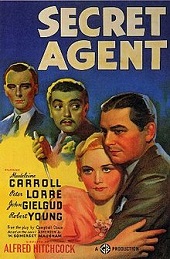
In May 1936 Alfred Hitchcock's Secret Agent debuts, based on "Ashenden: Or the British Agent" by W. Somerset Maugham, starring John Gielgud as British novelist Capt. Edgar Brodie, who goes on a secret mission to Switzerland under the alias Richard Ashenden to eliminate German agent Robert Marvin (Robert Young) before he can get to Arabia to stir up trouble, aided by the Hairless Mexican (AKA the General) Peter Lorre and fake wife Elsa Carrington (Madeleine Carroll), who falls for Marvin; the uncredited film debut of Michael Rennie.

On Sept. 10, 1936 Bernard Vorhaus' Dusty Ermine (Hideout in the Alps) debuts, produced by Julius Hagen and Twickenham Studios, a British crime film based on the Neil Grant play, starring Ronald Square as forger Jim Kent, who is released from prison and tries to go straight, discovering that his nephew is working for an internat. counterfeiting right and going to Switzerland to save him, causing Scotland Yard to believe he's their leader; the film debut of Balham, London-born character actress Margaret Taylor Rutherford (1892-1972) as Evelyn Summers.
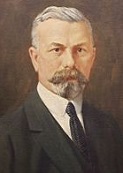


On Sept. 30, 1936 Pinewood Studios is founded by real estate tycoon Charles Boot (1874-1945) and Methodist flour tycoon Joseph Arthur Rank, 1st Baron Rank (1888-1972), named after Hollywood plus the local trees; in Apr. 1937 Rank founds the Rank Org., going on to become the most vertically integrated film co. in Britain incl. Gen. Film Distributors (1935-96), which uses the Gongman Logo.
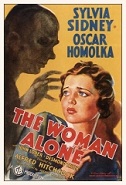
On Dec. 2, 1936 Alfred Hitchcock's Sabotage (The Woman Alone) (Gen. Film Distributors) debuts, based on the 1907 Joseph Conrad novel "The Secret Agent" is a British spy thriller film about London cinema owner Karl Anton Verloc (Oskar Homolka) (after the name in the novel, Adolf, is changed to avoid Nazi entanglements), a foreign agent of an unknown power, who hides a time bomb in a canary cage to blow up London, causing Scotland Yard to send Sgt. Ted Spencer (John Loder, after Robert Donat proves unavailable) to stop him; Sylvia Sidney plays Mrs. Verloc, and Desmond Tester (after Robert Rietti proves unavailable) plays Mrs. Verlock's little brother Stevie, who gets blown up unknowingly transporting the bomb to Piccadilly Circus; watch movie.
In 1936 British film production peaks.


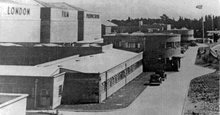
In 1936 Walter Gropius (1883-1969) and his partner Edwin Maxwell Fry (1899-1987) design the Denham Film Studios in Denham, Buckinghamshire, England, becoming the largest in the U.K.
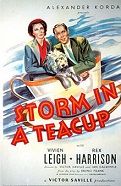
On Jan. 12, 1937 Ian Dalrymple's and Victor Saville's Storm in a Teacup (London Films) (United Artists) debuts, based on the 1930 play by Bruno Frank, starring Rex Harrison in his first starring role as fearless English reporter Frank Burdon, who takes on Provost William Gow (Cecil Parker), autocratic mayor of a town who tries to get a poor woman's sheepdog Patsy put to sleep, while romancing his daughter Victoria Gow (Vivien Leigh).
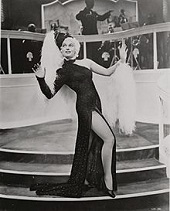
On Feb. 4, 1937 Herbert Wilcox's London Melody (Gen. Film Distributors) debuts, a musical starring Anna Neagle as Cockney street singer Jacqueline, who hooks up with Italian diplomat Marius Andreani (Tullio Carminati) and rises to the top of show biz; Robert Douglas plays Jacqueline's secy. Nigel Taplow, and Horace Hodges plays loveable Father Donnelly.
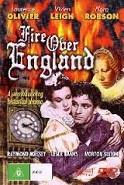
On Mar. 15, 1937 William K. Howard's B&W Fire Over England (Gloriana) (London Film Productions) (United Artists) debuts, based on the 1936 novel by A.E.W. Mason about the 1588 Spanish Armada in England, becoming the first pairing of Laurence Olivier as Michael Ingolby, and Darjeeling, Bengal, British India-born Vivien Leigh (Vivian Mary Hartley) (1913-67) as Cynthia, which helps get her the lead role in "Gone With the Wind"; so-ugly-she's-beautiful Flora McKenzie Robson (1902-84) plays Elizabeth I, reprising the role in "The Sea Hawk" (1940); Raymond Massey plays Philip II of Spain; watch movie.
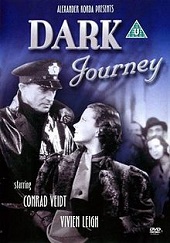
On Mar. 28, 1937 Victor Saville's B&W Dark Journey (London Film Productions) (United Artists) debuts, produced by Alexander Korda and written by Lajos Biro anud Arthur Wimperis, starring Vivien Leigh as Swiss dress shop owner Madeleine Goddard, who is also a German spy, who transports spy info. in gowns purchased in Paris, but is actually a French double agent, and hooks up with disabled German naval veteran Baron Karl von Marwitz (Conrad Veidt), who turns out to be a German spy, not letting that stand in the way of their love; watch movie.
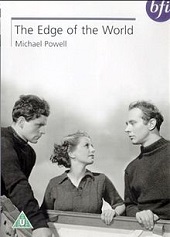
On July 6, 1937 Michael Powell's B&W The Edge of the World (Powell's dir. debut), a reference to Ultima Thule debuts, about the depopulation of the Scottish archipelago of St. Kilda by the young, filmed on Foula Island in the Shetland Islands, starring Eric Berry as Robbie Manson, Niall MacGinnis as his friend Andrew Gray, Belle Crystall as his sister Ruth Manson, John Laurie as his father Peter Manson, and Finlay Currie as James Gray; in 1978 Powell makes the film "Return to the Edge of the World" with surviving cast and crew.
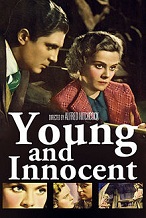
In Nov. 1937 Alfred Hitchcock's B&W Young and Innocent (The Girl Was Young) (Gaumont Film Co.) debuts, based on the 1936 Josephine Tey novel "A Shilling for Candies", a British crime thriller starring Nova Pilbeam as Erica Burgoyne, who helps Robert Tisdall (Derrick De Marney) run from a murder charge; an elaborate crane shot at the end identifies the real murderer; watch movie.
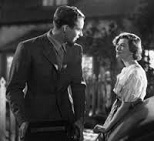
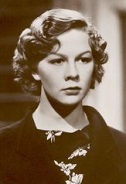
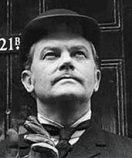
In 1937 Henry Cass' Lancashire Luck (British and Dominions Film Corp.) debuts, starring George Carney as George Lovejoy, who wins the lottery and buys a tea shop in the upper-class side of town; the film debut of "Love on the Dole" stage actress Wendy Margaret Hiller (1912-2003) as Betty Lovejoy, and Nigel Hector Munro Stock (1919-86) as Joe Lovejoy; Hiller goes on to become George Bernard Shaw's favorite actress, who casts her in his plays "Saint Joan", "Pygmalion", "Major Barbara" et al.

In 1937 Charter Film Productions is founded in England by twin brothers John Edward Boulting (1913-85) and Roy Alfred Clarence Boulting (1913-2001), going on to produce "Brighton Rock" (1947), "Seven Days to Noon" (1950), "Private's Progress" (1956), "Lucky Jim" (1957) and "I'm All Right Jack" (1959), recycling actors Richard Attenborough, Ian Carmichael, Terry-Thomas, Dennis Price, John Le Mesurier, Irene Handl, and Miles Malleson.
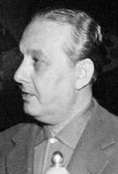
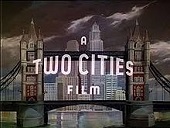
In 1937 Two Cities Films is founded in London, England and Rome, Italy by Filippo Del Giudice (1891-1962) and Mario Zampi (1903-63), going on to produce "quinessentially English" film classics incl. "French Without Tears" (1939), "In Which We Serve" (1942), "The Gentle Sex" (1943), "The Lamp Still Burns" (1943), "This Happy Breed" (1944), "The Way Ahead" (1944), "Henry V" (1944), "Blithe Spirit" (1945), "The Way to the Stars" (1945), "Men of Two Worlds" (1946), "Odd Man Out" (1947), "Vice Versa" (1948), "Mr. Perrin and Mr. Traill" (1948), "Hamlet" (1948), "Trottie True" (1948), "Madness of the Heart:" (1949), "Prelude to Fame" (1950), "Personal Affair" (1953), and "Trouble in Store" (1953); in 1946 it joins the Rank Org.
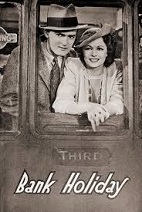
On Jan. 27, 1938 Carol Reed's Bank Holiday (Gainsborough Pictures) debuts, starring John Lodge as Stephen Howard, and Margaret Lockwood as Catherine Lawrence in a comedy about the weekly summer you know what that begins on midday Sat. with a rush for the seaside trains; makes a star of Margaret Mary Day Lockwood (1916-90).
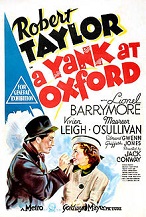
On Feb. 18, 1938 Jack Conway's A Yank at Oxford (MGM's first British production) debuts, starring Robert Taylor as Yank athlete Lee Sheridan, who attends Cardinal College, Oxford U. on scholarship, and hooks up with hot babe Elsa Craddock (Vivien Leigh), becoming their first screen pairing, proving Taylor's masculinity and ending rumors that he might be gay like his late rival Rudolph Valentino, saving his career; does $2.7M box office on a $1.4M budget.
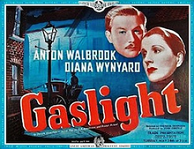
On June 25, 1938 Thorold Dickinson's Gaslight (British Nat. Films) (Anglo-Am. Film Corp.) debuts, based on the 1938 play "Gas Light" by Patrick Hamilton, starring Anton Walbrook as calculating Brit Paul Mallen, who tries to drive his rich wife Bella Mallen (Diana Wynyard) nuts to get at her family nuts, er, jewels, while Scotland Yard dick B.G. Rough (Frank Pettingell) tries to protect her; meanwhile her only clue to him is the frequent dimming of the you know what?; refilmed in 1944 by MGM starring Ingrid Bergman; causes the term gaslighting to become popular.
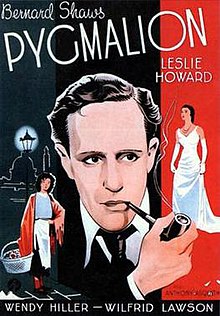
On Oct. 6, 1938 Anthony Asquith's and Leslie Howard's Pygmalion debuts, a George Bernard Shaw-assisted rewrite of his play, causing him to become the first to win both an Oscar (screenplay) and a Nobel (next ?); first British film to contain the swear word "bloody" by Hiller: "Not bloody likely"; does $1.4M box office on an £87K budget.

On Oct. 7, 1938 Alfred Hitchcock's B&W The Lady Vanishes (original title: The Lost Lady) (Gaumont British) (United Artists) debuts, based on the 1936 novel "The Wheel Spins" by Ethel Lina White, starring Margaret Lockwood as Iris Henderson, Michael Redgrave (his film debut) as Gilbert, Paul Lukas as evil Dr. Hartz, and Dame May Whitty as disappeared Miss Froy in Hitchcock's first movie success before moving to Hollyweird; Catherine Lacey plays the nun; refilmed in 1979 by Anthony Page, and in 2005 as "Flightplan" starring Jodie Foster.
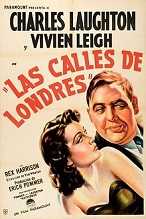
On Oct. 18, 1938 Tim Whelan's B&W Sidewalks of London (St. Martin's Lane) (London After Dark) (Partners of the Night) (Mayflower Pictures) (Paramount Pictures) debuts, starring Charles Laughton as busker Charles Staggers, who protects pickpocet Liberty (Libby) (Vivien Leigh) until she is caught stealing a gold cigarette case fom songwriter Harley Prentiss (Rex Harrison), who falls for her and gets her a Hollywood contract, causing her to ditch Charles cruelly; offscreen they detest each other anyway?
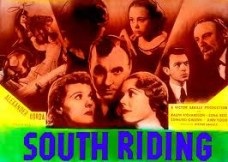
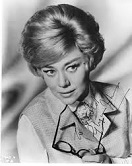
In 1938 Victor Saville's B&W South Riding (Devonshire Films) debuts, produced by Alexander Korda and written by Ian Dalrymple based on the 1936 Winifred Holtby novel, starring Ralph Richardson as Yorkshire country squire Robert Carne, whose mentally-ill wife almost bankrupts him and gets him involved in local politics; also stars Edna Best as Robert's foe-turned-lover Sarah Burton, Edmund Gwenn as Councillor Alfred Huggins, John Clements, as Councillor Astell, and Ann Todd as Robert's daughter Madge Carne; the credited film debut of Pretoria, South Africa-born Welsh actress-singer Glynis Johns (1923-) as Midge Carne; watch trailer.

On May 15, 1939 Sam Wood's Goodbye, Mr. Chips (MGM, Denham Studios) debuts, written by Robert Cedric Sherriff based on the 1934 James Hilton novel and set in 1933, starring mustachioed Friedrich Robert Donat (1905-58) as shy Latin prof. Charles Edward Chipping (b. 1845), who marries vivacious Kathy Ellis (Greer Garson in her screen debut) only to tragically lose her and then lose himself in his work, being granted permission to teach until he reaches 100 and pronounce Cicero as sis-er-o not kee-kir-o; does $3.25M box office on a $1M budget; "Pity he had no children. - Oh, but I have. Thousands of them. And all boys." (on his deathbed)

On May 15, 1939 Alfred Hitchcock's Jamaica Inn (Mayflower Pictures) debuts, based on the 1936 Daphne du Maurier novel (first of three, followed by "Rebecca", and "The Birds"), set in 1820 Cornwall on the edge of Bodmin Moor, starring ridiculously-overdressed Charles Laughton as justice of the peace Squire Sir Humphrey Pengallan; film debut of fiery-eyed Irish redhead Maureen O'Hara (FitzSimons) (1920-2015) as Irish orphan Mary, who moves in with Aunt Patience (Marie Ney) and Uncle Joss (Leslie Banks) at you know where, then discovers it's the HQ of a nest of pirates who lure ships to wreck on the Cornish coast and kill the crew and steal their cargo, and tries to save escaping whistleblowing pirate Jon Trehearne (Robert Newton) by bringing him to Pengallan, only to discover that Jon is actually a secret govt. agent, and later, that Pengallan is the secret pirate leader; Emlyn Williams plays pirate Harry the Pedlar; does $3.7M box office despite critics panning it because it changes the original plot to make a ham of Laughton, which caused du Maurier to almost refuse to grant film rights; Hitchcock's last British film before he moves to Hollywood in Mar. to work for David O. Selznick, taking O'Hara with him to make "The Hunchback of Notre Dame", which makes her a star; watch movie.



On Sept. 1, 1939 - Sept. 2, 1945 the horrific $3.5T World War II resulted in 24M military and 49M civilian deaths, and featured the low point of the Jewish Holocaust (Shoah) by the German Nazis, I guess it was the Jews' fault for not ransoming themselves to go to Israel before they could round them up for the camps. The whole experience turned Jews from lovers into fighters, ramping up the Zionist movement with full world sympathy and support by new world superpower U.S., which had its own guilt trip because on Nov. 24, 1942 Budapest-born Am. Zionist leader Rabbi Stephen Samuel Wise (1874-1949) announced in a press conference in Washington, D.C. that he was authorized by the U.S. State Dept. to confirm that the Nazis had murdered 2M Jews as part of a plan to exterminate all Jews in Europe; too bad, the nat. newspapers didn't consider it front page news, and the U.S. govt. did nada. After the war ended and Americans toured the concentration camps in horror, Polish-born Jewish scholar Raphael Lemkin (1900-59), who single-handedly led an unsuccessful campaign to get the League of Nations to give internat. protections against genocide starting in 1933 finally got what he wanted after his own people got it, namely the Dec. 9, 1948 U.N. Convention on the Prevention and Punishment of the Crime of Genocide (Gen. Assembly Resolution 260), which didn't come in force until Jan. 12, 1951, and which the U.S. still didn't ratify until 1988.




In the 1940s the Golden Age of British Cinema sees dirs. Sir David Lean (1908-91), Michael Latham Powell (1905-90), Emeric Pressburger (1902-88), and Sir Carol Reed (1906-76) produce their best work; in 1939 Powell and Pressburger form The Archers film production co., with Pressburger creating the original stories, and Powell doing the directing, cranking out 24 films by 1972 incl. "The Life and Death of Colonel Blimp" (1943), "A Matter of Life and Death" (1946), "Black Narcissus" (1947), and "The Red Shoes" (1948).

On Apr. 12, 1940 Alfred Hitchcock's Rebecca (United Artists) debuts, based on the 1938 Daphne Du Maurier novel, starring Laurence de Olivier as widower Maxim de Winter, who moves 2nd wife Joan Fontaine into his Manderley country mansion in Cornwall only to find that the memory of his first wife Rebecca still rules it; Judith Anderson plays housekeeper Mrs. Danvers; features the famous opening line by poor unsophisticated country girl Joan Fontaine: "Last night I dreamed I went to Manderley again"; Florence Bates plays Mrs. Edythe Van Hopper, who utters the line: "Most girls would give their eyes to see Monte", to which Olivier replies: "Wouldn't that rather defeat the purpose?"; also stars George Sanders as caddish cousin Jack Favell, who utters the immortal soundbyte "I say, marriage with Max is not exactly a bed of roses, is it?"; Hitchcock's first Am. film and only Best Picture Oscar; does $6M box office on a $1.288M budget; watch movie.
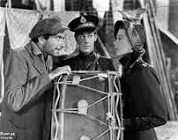
On Aug. 2, 1941 Gabriel Pascal's B&W Major Barbara (Gen. Film Distributors) debuts, based on the 1905 George Bernard Shaw play, edited by David Lean and starring Wendy Hiller as Major Barbara Undershaft, Robert Morley as her wealthy munitions manufacturer father Andrew Undershaft, and Rex Harrison as foundling Adolphus Cusins; parts were filmed during the 1940 London Blitz.
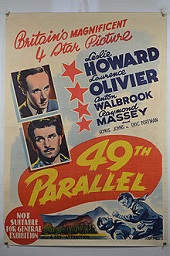
On Oct. 8, 1941 Michael Powell's and Emeric Pressburger's 49th Parallel (The Invaders) (Gen. Film Distributors) (Columbia Pictures) debuts, an attempt to scare the neutral U.S. into joining WWII, about six Nazis trying to escape to the U.S. across non-neutral Canada, starring Laurence Olivier as Johnnie the Trapper, Leslie Howard as writer Philip Armstrong Scott, Raymond Massey as AWOL Canadian soldier Andy Brock, and Eric Portman as German Lt. Ernst Hirth; the U.S.-Canadian border is at the 49th parallel, but the film ends up in Niagara Falls, which is farther S; does £250K U.K. and $5M U.S. box office on a £120K budget.
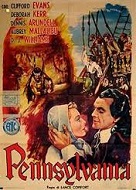
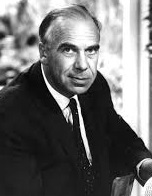
In 1941 Lance Comfort's B&W Penn of Pennsylvania (Courageous Mr. Penn) (British Nat. Films) (Anglo-Am. Film Corp.) debuts, starring Clifford Evans as William Penn, Deborah Kerr as his first wife Gulielma Maria Springett, and Dennis Arundell as Charles II; the film is a flop, but the music is a hit, composed by Northampton, England-born composer William Alwyn (Smith) (1905-85), who goes on to compose scores for 60+ films incl. "Odd Man Out" (19456), "Escape" (1948), "The Fallen Idol" (1948), "The Winslow Boy" (1948), "The Rocking Horse Winner" (1949), "Madeleine" (1949), "State Secret" (1950), "The Magic Box" (1951), "Malta Story" (1953), "The Black Tent" (1956), "Shake Hands with the Devil" (1959), "Swiss Family Robinson" (1960), "The Naked Edge" (1961), and "The Running Man" (1963); watch movie.
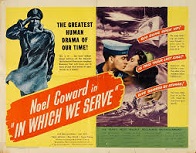
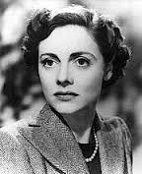

On Sept. 17, 1942 Noel Coward's and David Lean's B&W In Which We Serve (British Lion Film Corp.) (United Artists) debuts, produced by Coward, a British patriotic war propaganda film made with the assistance of the Ministry of Info., inspired by the exploits of Lord Louis Mountbatten, whose destroyer HMS Kelly was sunk on May 23, 1941 in the Battle of Crete; stars Coward as Capt. E.V. Kinross, John Miles as Seaman Shorty Blake, and Benard Miles as Chief Petty Officer Walter Hardy of the HMS Torrin (played by the HMAS Nepal), and stage actress Celia Elizabeth "Betty" Johnson (1908-82) (wife of writer Peter Fleming, elder brother of James Bond 007 author Ian Fleming) in her feature film debut as Noel's wife Alix Kinross; Richard Attenborough plays Young Stoker; does £300K in the U.K. and $2M in the U.S. on a £240K budget; the debut of Croyden, Surrey-born dir. Sir David Lean (1908-91); first of four collaborations between dir. Lean and producer-writer Coward, incl. "This Happy Breed" (1944), "Blithe Spirit" (1945), and Brief Encounter (1945).
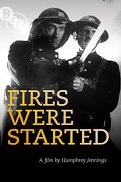
On Apr. 12, 1943 Humphrey Jennings' B&W Fires Were Started (I Was a Fireman) (Crown Film Unit) debuts, produced by Ian Dalrymple, a documentary-style film about British firefighters (Cyril Demarne et al.) during the London Blitz; watch clip.
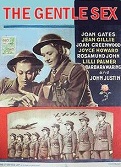
On Apr. 15, 1943 Leslie Howard's B&W The Gentle Sex (Gen. Film Distributors) debuts, produced by Derrick De Marney, a war propaganda film about seven women from different backgrounds who join the British Auxiliary Territorial Services; narrator Howard's last film before his untimely death on June 1, 1943.
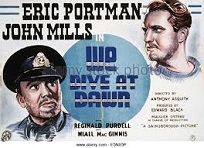
On May 20, 1943 Anthony Asquith's B&W We Dive at Dawn (Gaumont British Picture Corp.) (Gainsborough Pictures) (Gen. Film Distributors) debuts, produced by Edward Black, starring John Mills as Lt. Taylor, and Eric Portman as Seaman James Hobson on the Royal Navy Sea Tiger submarine in WWII on a mission to sink new German battleship Brandenburg; watch movie.
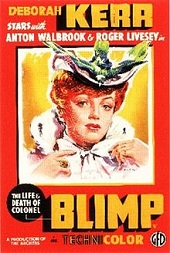
On June 10, 1943 Michael Powell's and Emeric Pressburger's The Life and Death of Colonel Blimp (Gen. Film Distributors) (United Artists), debuts, a satire on the British Army based on the David Low comic strip, starring Roger Livesey (after Laurence Oliver is unavailable) as Maj.-Gen. Clive Wynne-Candy of the British Home Guard in WWII, who is captured in a Turkish bath in a premptive attack, shouting "War starts at midnight", after which he flashbacks to the Boer War, reliving his career; Deborah Kerr plays his early babe Edith Hunter after first choice Wendy Hiller is pregnant; after Winston Churchill hears that it's a parody of himself and tries to suppress it, keeping it from being released in the U.S. until 1945 in a cut-down version; does $275K box office on a $2M budget; pioneers use of Technicolor; "England's greatest film ever". On June 10, 1943 Michael Powell's and Emeric Pressburger's The Life and Death of Colonel Blimp Gen. Film Distributors) (United Artists) debuts, based on the David Low comic strip, starring Roger Livesey (after Laurence Oliver is unavailable) as Maj.-Gen. Clive Wynne-Candy of the British Home Guard in WWII, who is captured in a Turkish bath in a premptive attack, shouting "War starts at midnight", after which he flashbacks to the Boer War, reliving his career; Deborah Kerr plays his early babe Edith Hunter after first choice Wendy Hiller is pregnant; does $275M box office on a $2M budget.
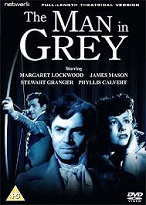
On Aug. 23, 1943 Leslie Arliss' The Man in Grey (Gainsborough Pictures) debuts, starring Phyllis Calvert as British Wren Clarissa Richmond, who marries the fake, er, rake marquis of Rohan (James Mason) (the man in grey), after which her scheming actress friend Heather Snow (Margaret Lockwood) moves in and tries to ruin her life; does £300K box office on a £90K budget; the film debut (as acid-tongued Rokeby) of English actor Stewart Granger (James Lablache Stewart) (1913-93), who was released last year from military service for stomach ulcers, and becomes an overnight star in England, and their top box office draw in 1945-9 before moving to Hollywood; first of the Gainsborough Melodramas, a series of period costume dramas usually starring Lockwood, Calvert, Granger, and Mason, incl. "Love Story" (1944), "Fanny by Gaslight" (1944), "Madonna of the Seven Moons" (1945), "A Place of One's Own" (1945), "They Were Sisters" (1945), "The Wicked Lady" (1945), and "Caravan" (1946); in 1944-5 Mason becomes the top box office draw in Britain.
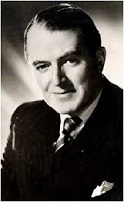
On Oct. 25, 1943 Oswald Mitchell's The Dummy Talks (British Nat. Films) (Anglo-Am. Film Corp.) debuts, a British crime film starring Claude Hulbert and Berle Orde, becoming the film debut of Bromley-by-Bow, Poplar, London-born Jack Warner (Horace John Waters) (1895-1981).
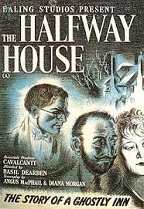
On Apr. 14, 1944 Basil Dearden's B&W The Halfway House (Ealing Studios) debuts, based on the play "the Peaceful Inn" by Dennis Ogden about 10 people in an old hotel in a remote Welsh village that contains many secrets, starring Mervyn Johns as Rhys, his daughter Glynis Johns as Gwyneth, Tom Walls as Capt. Harry Meadows, and Francoise Rosay as Alice Meadows; sets the style for Ealing Studios; "The story of a ghostly inn"; watch movie.
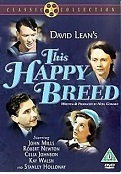
On June 1, 1944 David Lean's B&W This Happy Breed (Eagle-Lion Distributors) debuts (Lean's solo dir. debut), based on the 1939 play by Noel Coward about the middle-class Gibbons family in 1919-39 Clapham, South London, starring Robert Newton as Frank Gibbons, Celia Johnson as Ethel Gibbons, Kay Walsh as Queenie Gibbons, Stanley Holloway as Bob Mitchell, John Mills as Billy Mitchell, and Alison Leggatt as Aunt Sylvia; title from Shakespeare's "Richard II", Act 2, Scene 1; features London Pride, performed by Muir Mathieson and the London Symphony Orchestra; watch movie.
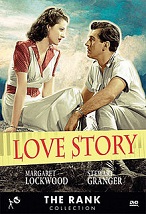
On Nov. 20, 1944 Leslie Arliss' B&W Love Story (Gainsborough Pictures) (Eagle-Lion Distributors) (Universal Pictures) debuts, based on a short story by J.W. Drawbell, starring Margaret Lockwood as concert pianist Lissa Campbell, who is dying of heart failure and decides to spend her last days in Cornwall, where she meets a former RAF pilot Kit Firth (Stewart Granger), who is going blind, hooking up with him while bumping into his fiance Judy (Patricia Roc); "We're all living dangerously. There isn't any certainty anymore. It's just today, and the hope of tomorrow. Oh, darling, please, let's take all the happiness we can, while we can. Don't be afraid."

On Nov. 22, 1944 Laurence Olivier's Henry V (Two Cities Films) debuts, based on the Shakespeare play, starring Olivier as Henry V, Renee Asherson as Princess Katherine, Leslie Banks as the Chorus (after Robert Donat unsuccessfully lobbies for the role), and Felix Aylmer as the Archbishop of Canterbury, taking actor-dir. Laurence Kerr "Larry" Olivier (1907-89) to the #1 slot among actors with a cool score by composer Sir William Walton, becoming the first Shakespeare play that is both artistically and commercially successful; does $2M box office; "Dedicated to the Commandos and Airborne Troops of Great Britain, the spirit of whose ancestors it has been humbly attempted to recapture."
In 1944 Cineguild Productions is founded by dir. David Lean, producer Anthony Havelock-Allan, and cinematographer Ronald Neame, going on to produce several major British films in the 1940s, incl. "This Happy Breed" (1944), "Blithe Spirit" (1945), "Brief Encounter" (1945), "Great Expectations" (1946), "Take My Life" (1947), "Oliver Twist" (1948), "Blanche Fury" (1948), "The Passionate Friends" (1949), and "Madeleine" (1950).
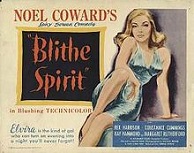
On May 13, 1945 David Lean's Blithe Spirit (Gen. Film Distributors) debuts, based on the 1941 Noel Coward play, starring Rex Harrison as novelist Charles Condomine of Lympne, Kent, Constance Cummings as his wife Ruth Condomite, and Margaret Rutherford as 200 lb. trance medium Madame Arcati, who conjures up his dead wife Elvira (Kay Hammond), making Ruth jealous; too bad, it flops.
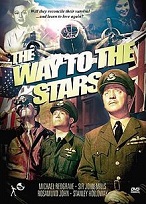
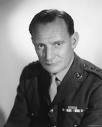
On June 16, 1945 Anthony Asquith's B&W The Way to the Stars (Johnny in the Clouds) (Two Cities Films) (Rank Org.) (United Artists) debuts, produced by Anatole de Grunwald and co-written by Terence Rattigan based on his 1942 play "Flare Path", a British war drama starring John Mills as Pilot Officer Peter Penrose of the 720th Squadron at RAF Station Halfpenny Field, who is assigned as co-pilot to Flt. Lt. David Archdale (Michael Redgrave), who took over when Squadron Leader Carter, played by Kent-born Trevor Wallace Howard (Howard-Smith) (1913-88) (his first credited film role) was KIA.
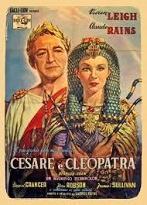
On Sept. 6, 1945 Gabriel Pascal's Caesar and Cleopatra (Eagle-Lion Films) (United Artists) debuts, produced by Pascal based on the 1901 George Bernard Shaw play, starring chicken-legged flat-chested Claude Rains as Julius Caesar (who is rumored to become the first actor to receive a $1M salary, but actually only receives $100K), typecast Scarlett O'Hara Vivien Leigh as Cleopatra, and Flora Robson as her murderous slave Ftatateeta;Stewart Granger plays dashing Apollodorus, Basil Sydney plays Rufio, and Francis L. Sullivan plays eloquent slave Pothinus; 17-y.-o. Roger Moore has a bit part; a flop despite the Technicolor and lavish sets, it does £1.4M box office on a £1.3M budget, almost ending Pascal's career; the first Shaw film released in color, and the last film version of his plays released during his lifetime; watch trailer; watch movie.
In 1945 Anglo-Amalgamated Productions is founded in Britain by Nat Cohen and Stuart Levy to produce B-films, incl. "Wide Boys" (1952), "The Drayton Case" (1954), "Carry On Sergeant" (1958), "Carry On Nurse" (1959), "Carry on Teacher" (1959), "Horrors of the Black Museum" (1959), "Carry on Constable" (1960), "Peeping Tom" (1960), "Circus of Horrors" (1960), "The Criminal" (1960), "Carry On Regardless" 1961), "Carry On Cruising" (1962), "Carry On Cabby" (1963), "Carry On Jack" (1963), "Billy Liar" (1963), "Carry On Spying", "The Masque of the Red Death" (1964), "Catch Us if You Can" (1964), "Carry On Cowboy" (1965), "Carry On Cleo" (1965), "Carry On Screaming" (1966), "Five Golden Dragons" (1967), "The Million Eyes of Sumuru" (1967), and "Poor Cow" (1967); in 1962 Associated British Picture Corp. acquires a 50% share, followed in 1967 by 74%; it closes in 1971.
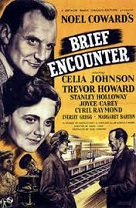
On Nov. 26, 1945 David Lean's Brief Encounter (Denham Studios) debuts, based on Noel Coward's 1936 play "Still Life" about a married housewife who discovers how real love is a "violent" thing, starring Celia Johnson as Laura Jesson, Trevor Howard as Dr. Alec Harvey, Stanley Holloway as Albert Godby, Joyce Carey as Myrtle Bagot, and Everley Gregg as Dolly Messiter; the soundtrack features Eileen Joyce playing Sergei Rachmaninoff's Piano Concerto No. 2; makes a star of gravelly-voiced English actor Trevor Howard (1913-88).
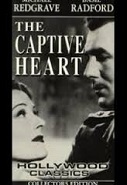
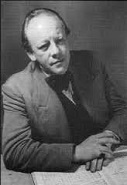
On Apr. 29, 1946 Basil Dearden's The Captive Heart (Ealing Studios) debuts, a British war drama starring Michael Redgrave as Czech soldier Capt. Karel Hasek, who escapes from Dachau in summer 1940 and assumes the identity of dead British Capt. Geoffrey Mitchell only to get caught again during the fall of France and shipped to another camp, where fellow British soldiers see through his story and suspect him of being a spy; meanwhile he attempts to keep the deception going by sending love letters to Michell's wife Celia (Rachel Kempson), rekindling her love; also stars Jimmy Hanley as Pvt. Matthews, Mervyn Johns as Pvt. Di Evans, Rachel Thomas as his wife Dilys, and Jack Warner as his friend-business partner Cpl. Ted Horsfall; score by Lancashire-born Alan Rawsthorne (1905-71), who goes on to compose scores for "School for Secrets (1946), "Uncle Silas" (1947) "Saraband for Dead Lovers" (1948), "Pandora and the Flying Dutchman" (1951), "Where No Vultures Fly" (1951), "The Cruel Sea" (1953), "West of Zanzibar" (1954), "The Man Who Never Was" (1956), and "Floods of Fear" 1958). watch clip.

On Sept. 30, 1946 Wesley Ruggles' B&W London Town (Eagle-Lion) debuts, starring Sid Field as Jerry Sanford and Petula Clark as Peggy Sanford is the first British Technicolor musical extravanganza, and one of the biggest flops in British film history wasting its budget of £1M and forcing the cancellation of a planned film about the Rolls-Royce family; the film debut of Susan Shaw; after flopping in the U.S., a half-hour cut of Field's comedy routines becomes a cult hit in Hollywood, with Frank Sinatra having special showings.
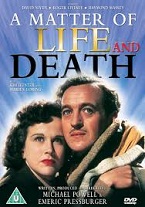
On Nov. 1, 1946 Michael Powell's and Emeric Pressburger's B&W A Matter of Life and Death (Stairway to Heaven) (Rank Org.) (Eagle-Lion Films) debuts, featuring an escalator linking Heaven and Earth, with heavenly scenes filmed in B&W using underdeveloped Technicolor to give a pearly hue; stars David Niven as RAF Squadron Leader Peter Carter, who flies his badly damaged Lancaster back to England from Germany, and jumps sans parachute, waking up on the beach near the English Channel, falling in love with June (Kim Hunter), while Heavenly Conductor 71 (a French aristocrat guillotined in the French Rev.) tries to explain to him that he missed him as he was falling and should come with him, causing him to appeal, facing prosecutor Abraham Farlan (Raymond Massey), first casualty of the Am. Rev. War; "Nothing is stronger than the law in the Universe, but on Earth, nothing is stronger than love"; does $1.75M box office on a £650K budget.
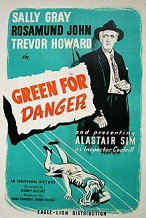
On Dec. 7, 1946 Sidney Gilliat's Green for Danger (Gen. Film Distributors) debuts, a British thriller film based on the 1944 Christianna Brand novel, starring Alastair Sim as Inspector Cockrill, who investigtes an operating room death in Heron's Park Emergency Hospital in SE England during the Aug. 1944 V-1 Doodlebug offensive on London after Nurse Frederica "Freddi" Linley (Sally Gray) tells him that it wasn't an accident; Trevor Howard plays anaesthetist Dr. Barney Barnes, Leo Glenn plays Mr. Eden, and Rosamund John plays Nurse Esther Sanson.

On Dec. 26, 1946 David Lean's Great Expectations (Cineguild) debuts, starring John Mills as Pip, Valerie Hobson as Estella, Martita Hunt as Miss Havisham, and is the film debut of Paddington, London-born Sir Alec Guinness (1914-2000) as Herbert Pocket; based on a 1939 stage version written by Guinness; watch movie.
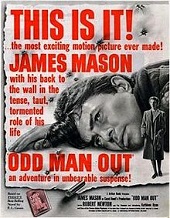
On Feb. 1, 1947 Carol Reed's Odd Man Out (Rank Org./Two Cities Films) debuts, based on the F.L. Green novel, a film noir set in Northern Ireland, starring James Mason as Johnny McQueen, wounded leader of a terrorist group on the lam with his babe Kathleen Sullivan (Kathleen Ryan), and Robert Newton as painter Lukey, who wants him to pose for him; watch movie.
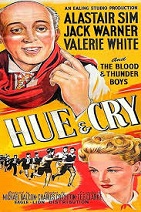
On Feb. 25, 1947 Charles Crichton's B&W Hue and Cry (Ealing Studios) (Gen. Film Distributors) (Eagle-Lion Films) debuts, about street children gangs, giving a vivid portrait of post-WWII London, showing the damage still evident; stars Alastair Sim as Felix H. Wilkinson, Harry Fowler as Joe Kirby, Jack Warner as Nightingale, and Valerie White as Rhona Davis; the first Ealing Comedy; watch movie.
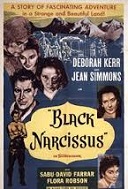
On May 26, 1947 Michael Powell's and Emeric Pressburger's Black Narcissus (Gen. Film Distributors) debuts, based on the 1939 Rumer Godden novel and shot in Pinewood Studios and Leonardslee Gardens in West Sussex, starring Deborah Kerr as Anglican nun Sister Superior Clodagh attempting to found a hospital-school in the Himalayas at the Palace of Mopu near Darjeeling, where she hooks up with British local agent Mr. Dean (David Farrir); meanwhile the Young General (Sabu) hooks up with low-caste dancing girl Kanchi (Jean Simmons), "a basket off fruit, piled high and luscious and ready to eat"; too bad, Sabu's crypto-blackness causes U.S. censors to go to work?
In May 1947 Eros Films is founded in London, England by brothers Philip Hymans (1894-1997), Sydney Hyams, and Michael Hyams, sons of a Russian immigrant banker and named after a statue at Picadilly Circus, producing "The Man Who Watched Trains Go By" (1954), "The Sea Shall Not Have Them" (1955), "Battle of the V-1" (1958), and "Behemoth, the Sea Monster" (1959) before declaring bankruptcy in June 1961.
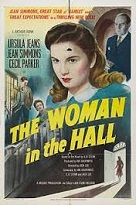
On Oct. 28, 1947 Jack Lee's B&W The Woman in the Hall debuts, written by producer Ian Dalrymple based on a novel by G.B. Stern, starring Ursula Jeans as widow Lorna Blake, who has two daughters that she uses to extort money from rich people via a pathetic begging story until she bags rich Sir Halmar Bernard (Cecil Parker), who proposes to her after she lies that she only has one daughter, Molly (Jill Freud AKA Jill Raymond), abandoning the other daughter Jay (Jean Simmons); watch movie.

In Dec. 1947 John Boultin's B&W Brighton Rock (Charter Film Productions) debuts, based on the 1938 Graham Greene novel, starring Richard Attenborough as gang leader Pinkie Brown, who marries innocent Rose (Carol Marsh) to keep her from testifying against him as amateur sleuth Ida Arnold (Hermione Baddeley) closes in on his 1935 murders of newspaper reporter Fred Hale and fellow gang member Spicer while trying to hide a recording he made containing the soundbyte: "What you want me to say is I love you. Well here is the truth. I hate you, you little slut. You make me sick."
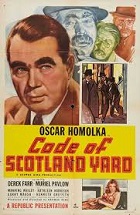
In 1947 George King's Code of Scotland Yard (The Shop at Sly Corner) (Pennant Pictures) debuts, based on the play by Edward Percy, starring Oscar Homolka as wealthy French refugee Descius Heiss in London, whose employee Archie Fellowes (Kenneth Griffith in his film debut) discovers that he is a fence and tries to blackmail him; Muriel Pavlow plays his concert violinist daughter Margaret Heiss; Derek Farr plays Robert Graham; watch movie.
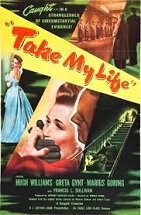
In 1947 Ronald Neame's B&W Take My Life debuts, based on the 1947 Winston Graham novel, starring Hugh Williams as Nicholas "Nicky Talbot", who cheats on his opera singer wife Philippa Shelley (Greta Gynt) with Elizabeth Russman (Rosalie Crutchley), ending up on trial for strangling her, causing her to turn detective and follow the trail to Elizabeth's composer hubby Sidney Flemming (Marius Goring) and Inspector Archer (Henry Edwards).
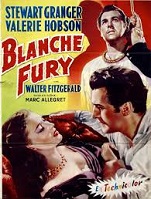
On Feb. 19, 1948 Marc Allegret's Blanche Fury debuts, produced by Anthony Havelock-Allan, based on a novel by Joseph Shearing set in Victorian England, starring Valerie Hobson as Blanche Furty, a genteel woman forced into menial domestic service, who becomes the governess for Lavinia, granddaughter of rich Uncle Simon, and falls for Philip Thorn (Stewart Granger), illegitimate son of dead estate owner Adam Fury, who was KIA and who protects the family via the ghost of his pet Barbary ape, plotting with him to murder her cousin hubby Laurence and Uncle Simon and blame it on gypsies, which backfires when she freaks out of fear for Lavinia and goes to the police, getting him convicted and executed, after which she dies during the birth of son Philip Fury, fulfilling the family curse.
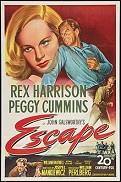
In Mar. 1948 Joseph L. Mankiewicz's Escape (20th Cent. Fox) debuts, based on the 1926 play by John Galsworthy, starring Rex Harrison as ex-RAF squadron leader Matt Denant, who get into an altercation in Hyde Park with a detective, who strikes his head on a park bench and dies, putting him in priz and feeling screwed until he escapes with his babe Dora Winton (Peggy Cummins).

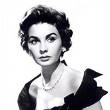
On May 4, 1948 Laurence Olivier's Hamlet (Two Cities) debuts, based on the Shakespeare play (first sound version in English), starring Olivier as Hamlet, Felix Aylmer as Polonius, Norman Wooland as Horatio, and Basil Sydney as King Claudius; too bad, half of the dialogue is cut, pissing-off purists (I'm like a sponge for this stuff?); first British film to win a best picture Oscar, also Oscar for best actor; makes a star of Lower Holloway, London-born actress Jean Merilyn Simmons (1929-) (as Ophelia), who moves to Hollywood in 1950 after marrying Stewart Granger, after which she gets bigger roles than him, causing them to divorce in 1960, after which neither get big roles?; does $3.2M box office on a £500K budget.
On June 3, 1948 the Marshall Plan (European Recovery Plan) (ERP), named after U.S. secy. of state George Marshall and enacted by the 80th U.S Congress on Mar. 13 (Senate) and House (Mar. 31) becomes effective, going on to give 18 Western European countries over $12B in aid in the next four years; the Soviet Union refuses benefits, and blocks them to Eastern Block countries incl. East Germany and Poland; U.S cos. are forbidden to take their profits in the form of foreign exchange out of Euro countries, while Americans working outside the U.S. for 510 days over 18 mo. are exempt from IRS taxes, causing Hollywood to set up shop in Britain.
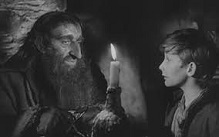
On June 22, 1948 David Lean's Oliver Twist (Gen. Film Distributors) debuts, starring cute kid actor John Howard Davies (1939-2011) as Oliver Twist, Robert Newton as Bill Sykes, Lean's wife Kay Walsh as Sykes' wife Nancy, Anthony Newley as the Artful Dodger, and Alec Guinness as the Jew Fagin, who gets slammed for anti-Semitism for his realistic big hook nose et al., getting pulled in Germany after protests, and not shown in the U.S. until July 30, 1951 after 12 min. is cut by PC police, where it flops; it is not shown uncut in the U.S. until 1970, and is not shown in Israel and Egypt until ?; the main theme by Sir Arnold Bax is based on his "In Memoriam" (1917), a lament for Easter Rising martyr Patrick Pearse; Davies goes on to become a British sitcom dir.-producer; does £380.4K box office on a £371.5K budget.
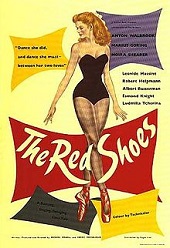
On Sept. 6, 1948 Michael Powell's and Emeric Pressburger's The Red Shoes (Gen. Film Distributors) debuts, based on a Hans Christian Andersen fairy tale, starring Scottish ballerina Moira Shearer (1926-2006) as a ballerina who joins a new ballet called you know what, torn between love and success as she rises to lead dancer in lavish Technicolor, becoming the most popular British flick for 40 years, and The Reason for a lot of prof. dancers.
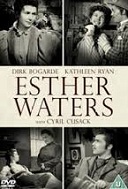
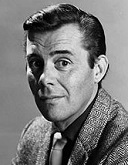
On Sept. 22, 1948 Ian Dalrymple's and Peter Proud's B&W Esther Waters ((Wessex Film Productions) Gen. Film Distributors) debuts, based on the 1894 George Moore novel, starring Kathleen Ryan as domestic servant Esther Waters in Victorian England, Cyril Cusack as Fred, and West Hampstead, London-born closet gay Dirk Bogarde (Sir Derek Jules Gaspard Ulric Niven van den Bogaerde) (1921-99) in his first credited film appearance as sweet-talking footman William Latch, who seduces Esther and abandons her; Bogarde goes on to become a British box-office idol but never makes it in Hollywood.
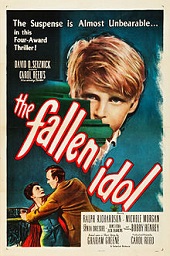
On Sept. 30, 1948 Carol Reed's B&W The Fallen Idol (London Film Productions) (British Lion Films) debuts, based on Graham Greene's story "The Basement Room" and filmed in Grosvenor Crescent, Belgrave Square, London, starring Bobby Henrey as Philippe, a boy manipulating the police to convict his father's butler Baines (Ralph Richardson) of murdering his wife by trying to protect him by regurgitating his phoney tales of his adventures in Africa; does £215.8K box office; watch trailer; watch movie.

In 1948 Baton Rouge, La. Earl St. John (1892-1968) is appointed executive producer of the Rank Org. (until 1964), doing a good job controlling costs and insisting that films be made in color to compete with TV but never distinguishing himself for his creativity, mainly doing what chmn. John Davis told him to do; too bad, in the 1960s the Rank board refuses to let him make films with riskier subject matter incl. "Saturday Night and Sunday Morning".
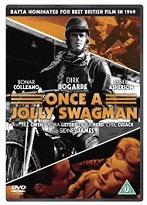
On Jan. 2, 1949 Jack Lee's B&W Once a Jolly Swagman, produced by Ian Dalrymple and based on the 1944 Montagu Slater novel about British motorcycle racing stars Dirk Bogarde as Bill Fox of Kentish Town, who becomes a dirt track star then tries to organize a riders union and gets in trouble with the authorities, ending up riding the Wall of Death, until WWII gives him a chance to escape by joining the British army, only to end up in a German POW camp; also stars Bonar Colleano, Bill Owen, Thora Hird, and Sid James; watch film.
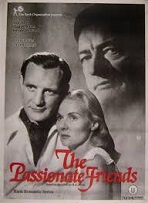
On Jan. 26, 1949 David Lean's B&W The Passionate Friends (Gen. Film Distributors) debuts, based on the 1913 H.G. Wells novel about a love triangle, starring Lean's new wife Ann Todd (who in 1946 signed "the most lucrative contract ever signed by an English cinema actress, with over a million dollars involved in its clauses") as Mary, who goes on holiday to Switzerland to join her banker hubby Howard (Claude Rains), and by mistake hooks up with her way more handsome old love Steven (Trevor Howard), causing divorce suits, only for her to realize that her hubby was her true love all along.
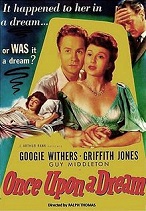
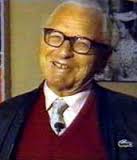
In Feb. 1949 Ralph Thomas' Once Upon a Dream (Sydney Box Productions) (Gen. Film Distributors) debuts, a comedy starring Googie Withers as British officer's wife Carol Gilbert, who has romantic dreams about her husband Maj. Guy Gilbert (Guy Middleton)'s man servant Jackson (Griffith Jones), and comes to believe they are true; the dir. debut of Ralph Philip Thomas (1915-2001) (nephew of producer Victor Saville), who goes on to direct the "Doctor" film series, and collaborate with producer Betty E. Box, wife of "Carry On" producer Peter Rogers; watch movie.
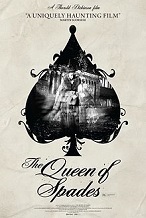
On Mar. 16, 1949 Thorold Dickinson's B&W The Queen of Spades (Associated British-Pathe) (Republic Pictures), based on the Aleander Pushkin short story stars Anton Walbrook as Capt. Herman Suvorin in 1806 St. Petersburg, who seduces Lizavetta Ivanova (Yvonne Mitchell) to learn the secret for winning at Faro from her mistress Countess Ranevskaya (Edith Evans); does £107K box office in the U.K.; watch trailer.
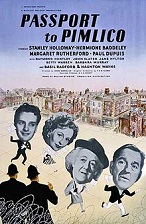
On Apr. 26, 1949 Henry Cornelius' Passport to Pimlico (Ealing Studios) debuts, set in post-WWII London, where an old bomb detonates in Miramont Gardens in Pimlico, revealing an old document by Edward IV ceding the Pimlico area to Burgundy, France, exempting it from British bureaucracy incl. rationing; stars Stanley Holloway as Arthur Pemberton, Barbara Murray as Shirley Pemberton, Hermione Baddeley as Edie Randall, and Paul Dupuis as Sebastien de Charolais, Duke of Burgundy; watch movie.
On May 29, 1949 the first British Film Academy Awards are presented at the Odeon Cinema in Leicester Square, London by the new London-based British Academy of Film and Television Arts (BAFTA) (founded 1947); the first BAFTA Award for Outstanding British Film (originally Alexander Korda Award for Best British Film) is awarded to Carol Reed's "Odd Man Out" (a bronze trophy designed by Henry Moore), followed by Carol Reed's "The Fallen Idol" (1948), Carol Reed's "The Third Man" (1949), Basil Dearden's "The Blue Lamp" (1950), Charles Crichton's "The Lavender Hill Mob" (1951), David Lean's "The Sound Barrier" (1952), Henry Cornelius' "Genevieve" (1953), David Lean's "Hobson's Choice" (1954), Laurence Olivier's "Richard III" (1955), Lewis Gilbert's "Reach for the Sky" (1956), David Lean's "The Bridge on the River Kwai" (1957), Jack Clayton's "Room at the Top" (1958), Basil Dearden's "Sapphire" (1959), Karel Reisz's "Saturday Night and Sunday Morning" (1960), Tony Richardson's "A Taste of Honey" (1961), David Lean's "Lawrence of Arabia" (1962), Tony Richardson's "Tom Jones" (1963), Stanley Kubrick's "Dr. Strangelove" (1965), Sidney J. Furie's "The IPCRESS File" (1965), Martin Ritt's "The Spy Who Came in from the Cold" (1966), and Fred Zinnemann's "A Man for All Seasons"; in 1968-91 it is suspended, followed by Neil Jordan's "The Crying Game" (1992), Richard Attenborough's "Shadowlands" (1993), Danny Boyle's "Shallow Grave" (1994), Nicholas Hytner's "The Madness of King George" (1995), Mike Leigh's "Secrets & Lies" (1996), Gary Oldman's "Nil by Mouth" (1997), Shekhar Kapur's "Elizabeth" (1998), Damien O'Donnell's "East is East" (1999), Stephen Daldry's "Billy Elliot" (2000), Robert Altman's "Gosford Park" (2001), Asif Kapadia's "The Warrior" (2002), Kevin Macdonald's "Touching the Void" (2003), Pawel Pawlikowski's "My Summer of Love" (2004), Nick Park's and Steve Box's "Wallace & Gromit: The Curse of the Were-Rabbit" (2005), Fernando Meirelles' "The Constant Gardener" (2005), Kevin Macdonald's "The Last King of Scotland" (2006), Shane Meadows' "This Is England" (2007), James Marsh's "Man on Wire" (2008), Andrea Arnold's "Fish Tank" (2009), Tom Hooper's "The King's Speech" (2010), Tomas Alfredson's "Tinker Tailor Soldier Spy" (2011), Sam Mendes' "Skyfall" (2012), Alfonso Cuaron's "Gravity" (2013), James Marsh's "The Theory of Everything" (2014), and John Crowley's "Brooklyn" (2015).
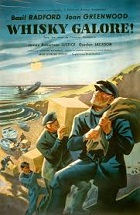
On June 16, 1949 Alexander Mackendrick's Whisky Galore! (Tight Little Island) (Ealing Studios) debuts, based on the 1947 Compton Mackenzie novel about a shipwreck in the Outer Hebrides that leaves 50K cases of whisky, starring Basil Radford as Capt. Paul Waggett, Joan Greenwood as Peggy Macroon, Wylie Watson (after Alastair Sim turns it down) as Joseph Macroon, James Robertson Justice as Dr. Maclaren, and Gordon Jackson as George Campbell; refilmed in 2016 by Gillies MacKinnon; watch movie.

On June 21, 1949 Michael Balcon's Kind Hearts and Coronets (Ealing Studios) debuts, a flashback black comedy set in Edwardian England based on the 1907 Roy Horniman novel "Israel Rank: The Autobiography of a Criminal", starring Dennis Price as imprisoned Louis D'Ascoyne Mazzini, 10th Duke of Chalfont, who is on death row and writes his memoirs telling how he decided to kill all eight people of the eccentric D'Ascoyne family ahead of him in succession to the dukedom (all played by Alec Guinness); Valerie Hobson play his babe Edith, and Joan Greenwood his other babe Sibella; "A hilarious study in the gentle art of murder"; the title comes from the 1842 Alfred Lord Tennyson poem "Lady Clara Vere de Vere": "Kind hearts are more than coronets, and simple faith than Norman blood"; "How happy could I be with either,/ Were t'other dear charmer away!"; watch movie.

On Sept. 2, 1949 Carol Reed's B&W The Third Man (London Films) debuts, written by Graham Greene, a film noir starring Joseph Cotten as Am. pulp Western writer Holly Martins, Orson Welles as black market drug dealer Harry Lime, and Vienna itself, with a great Risenrad (Ferris wheel) sequence and another great underground sewer sequence; Trevor Howard plays Maj. Calloway; Alida Valli plays Anna Schmidt; does £277.5K box office in the U.K.; zither music by Alan Karas, incl. The Third Man Theme, which becomes an internat. hit in 1950; in 1999 the British Film Inst. votes it the greatest British film of all time; "I never knew the old Vienna before the war with its Strauss music, its glamour and easy charm. Constantinople suited me better. Now the city is divided into four zones, you know, each occupied by a power: the American, the British, the Russian and the French. But the centre of the city, that's international policed by an international patrol. One member of each of the four powers. Wonderful! What a hope they had! All strangers to the place and none of them could speak the same language. Except a sort of smattering of German"; "In these days, old man, nobody thinks in terms of human beings. Goverments don't, so why should we? They talk of the people and the proletariat, and I talk of the mugs. It's the same thing. They have their five year plans and so have I"; "In Italy for thirty years under the Borgias they had warfare, terror, murder, bloodshed. They produced Michelangelo, Leonardo da Vinci, and the Renaissance. In Switzerland they had brotherly love, five hundred years of democracy and peace, and what did they produce? The cuckoo clock"; "Calloway: Death's at the bottom of everything, Martins. Leave death to the professionals. Martins: Mind if I use that line in my next Western?
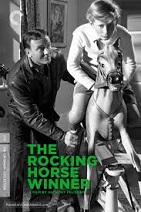
On Nov. 30, 1949 Anthony Pelissier's B&W The Rocking Horse Winner (Two Cities Films) (Rank Org.) debuts, produced by John Mills and written by Anthony Pelissier based on the D.H. Lawrence short story, starring 10-y.-o. John Howard Davies as Paul Grahame, who can pick winners of horse races, Valerie Hobson as his mother Hester, and Ronald Squire as Oscar Cresswell; music by William Alwyn; watch movie.
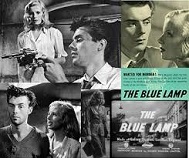
On Jan. 20, 1950 Basil Dearden's B&W The Blue Lamp (Ealing Studios) (Gen. Film Distributors) debuts, named after the you know whats that hang outside British police stations, produced by Michael Balcom and written by T.E.B. Clarke, a British social realist police drama set in Paddington, London in July 1949, starring Jack Warner as veteran police constable (PC) George Dixon, Jimmy Hanley as new recruit Andy Mitchell, and Dirk Bogarde as teen thug Tom Riley; Bernard Lee plays Sgt. Roberts, and Peggy Evans plays Diana Lewis; basis of the 1955-76 BBC-TV series "Dixon of Dock Green", starring Warner.
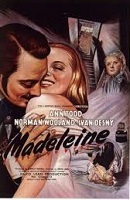
On Feb. 14, 1950 David Lean's B&W Madeleine debuts, based on a true story about Madeleine Smith of Glasgow, Scotland, who endures the "trial of the century" in 1857 for the arsenic murder of her secret lover Emile L'Angelier, starring Lean's wife Ann Todd as Madeleine, and Ivan Desny as L'Angelier; Leslie Banks plays her father, and Norman Wooland her respectable suitor William Minnoch.
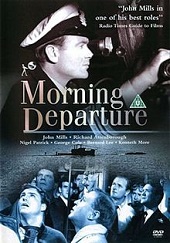
On Feb. 21, 1950 Roy Ward Baker's B&W Morning Departure (GDF) (British Empire Films) (Universal-Internat.) debuts, based on the play by Kenneth Wollard, a British naval war drama film set aboard post-WWII British sub HMS Trojan, which is hit by a derelict magnetic mine, starring John Millas as Lt. Cmdr. Peter Armstrong, Helen Cherry as his wife Helen, Nigel Patrick as 1st Lt. Manson, Richard Attenborough as Stoke Snipe, and Lana Morris as his wife Rosie; Michael Caine plays Teaboy (uncredited); watch movie.
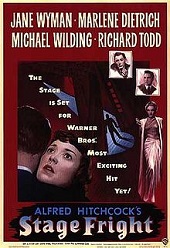
On Feb. 23, 1950 Alfred Hitchcock's Stage Fright (Transatlantic Pictures) (Warner Bros.) debuts, filmed in London, starring Jane Wyman as aspiring actress Eve Gil, who tries to hide her actor friend Jonathan Cooper (Richard Todd), secret lover of actress Charlotte Inwood (Marlene Dietrich), who is suspected of killing her husband and hiding her bloodstained dress, posing as reporter Doris Tinsdale to spy on her, while hooking up with Inspector Wilfred "Ordinary" Smith (Michael Wilding).
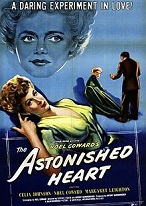
In Mar. 1950 Antony Darnborough's B&W The Astonished Heart (Gainsborough Pictures) (Gen. Film Distributors) debuts, based on Noel Coward's 1935 play, starring Coward as pshrink Christian Faber, who is infatuated with his mistress Leonora Vail (Margaret Leighton), and likes to quote Deut. 28:28: "The Lord shall smite thee with madness, and blindness, and admonishment of heart"; Celia Johnson plays his wife Barbara Faber; "A daring experiment in love"; a flop; watch clips.
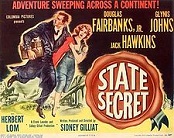
On Sept. 11, 1950 Sidney Gilliat's B&W State Secret (The Great Manhunt) (British Lion Films) (Columbia Pictures) debuts, filmed in the Italian Dolomites, starring Douglas Fairbanks Jr. as Am. surgeon John Marlowe, who goes to small Euro country Vosnia to operate on the dictator, who dies but is replaced by a lookalike, causing him to be hunted by the secret police headed by Col. Galcon (Jack Hawkins), gaining the help of Lisa Robinson (Glynis Johns); Herbert Lom plays Balkan con man Karl Theodor; does £187K box office in the U.K.; watch movie.
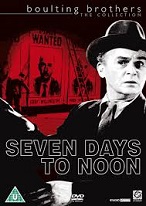
On Oct. 10, 1950 John Boulting's and Ray Boulting's B&W Seven Days to Noon (Charter Film Productions) (British Lion Films) debuts, written by Paul Dehn and James Bernard based on the book "Un Nazi en Manhattan" by Fernando Josseau, starring Barry Jones as prof. John Malcolm Francis Willington, who steals a nuke from the Wallingford Research Center and tries to blackmail the British govt. into eliminating its nuclear stockpile, causing Scotland Yard Det. Folland (Andre Morrell) to try to track him down while he hides out with Mrs. Goldie Phillips (Olive Sloane); the debut of Chobham, Surrey-born film composer John Mervyn Addison (1920-98), who goes on to score 50+ films incl. "Pool of London" (1951), "The Man Between" (1953), "Terror on a Train" (1953), "The Red Beret" (1953), "Private's Progress" (1956), "Reach for the Sky" (1956), "The Entertainer" (1960), "A Taste of Honey" (1961), "Tom Jones" (1963), "Girl with Green Eyes" (1964), "The Amorous Adventures of Moll Flanders" (1965), "Torn Curtain" (1966), "The Charge of the Light Brigade" (1968), "Sleuth" (1972), "A Bridge Too Far" (1977), "Strange Invaders" (1983), and "Code Name: Emerald" (1985); watch clip.
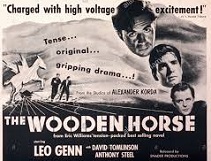
On Oct. 16, 1950 Jack Lee's B&W The Wooden Horse (British Lion Film Corp.) debuts, about the WWII escape attempt from German POW camp Stalag Luft III, using a you know what to cover the tunnel entrance; stars Leo Genn as Peter Howard, David Tomlinson as Philip Rowe, Anthony Steel as John Clinton, David Greene as Bennett, and Peter Burton as Nigel; watch trailer.
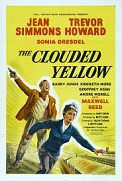
On Nov. 21, 1950 Ralph Thomas' B&@ The Clouded Yellow (Carillon Films) (Rank Film Distributors) (Columbia Pictures) debuts, starring Trevor Howard as ex-British secret service agent David Somers, who gets a job cataloguing butterflies, and ends up helping hot babe Sophie Malraux (Jean Simmons) beat a murder rap; Simmons' marriage to Stewart Granger helps with publicity; watch movie.
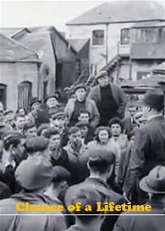
In 1950 Bernard Miles' B&W Chance of a Lifetime (British Lion) (Pilgrim Pictures) debuts, produced by Miles and co-written by Walter Greenwood, starring Basil Radford as British agricultural implements factory owner Dickinson, who falls on hard times after WWII, causing the employees to strike, after which Dickinson tries letting them run the factory themselves; watch clip.
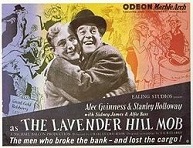
On June 15, 1951 Charles Crichton's The Lavender Hill Mob (Ealing Studios) debuts, set in Lavender Hill St. in Battersea, South London, starring Alec Guinness as mousey bank clerk Henry "Dutch" Holland, who masterminds a gold bullion heist with accomplice Alfred Pendlebury (Stanley Holloway) and smuggle them to Paris disguised as Eiffel Tower paperweights, after which Holland escapes to live it up in Rio; film debut of Audrey Hepburn, Robert Shaw, and Patricia Garwood; "By Jove, Holland, its a good job we're both honest men"; "It is indeed, Pendlebury"; watch movie.
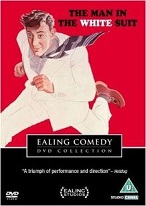
On Aug. 7, 1951 Alexander Mackendrick's The Man in the White Suit (Ealing Studios) (Gen. Film Distributors) debuts, starring Alec Guinness as genius chemist Sidney Stratton, who invents the perfect material, super-strong, dirt-repellant, and white and luminous because it contains radioactive elements, causing the English textile industry to blow a gasket until its short shelf life is discovered; also stars Joan Greenwood as Daphne Birnley, and Cecil Parker as Alan Birnley.

On Oct. 31, 1951 Brian Desmond Hurst's B&W Scrooge (A Christmas Carol) (Renown Pictures) debuts, written by Noel Langley based on Charles Dicken's 1843 "A Christmas Carol", starring perfect-fit Alastair Sim as Ebenezer Scrooge, Mervyn Johns as Bob Cratchit, Hermione Baddely as Mrs. Cratchit, Glyn Dearman as Tiny Tim, and Michael Hordern as Jacob Marley's Ghost; watch movie.
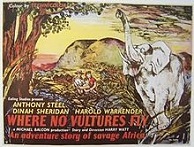
On Nov. 5, 1951 Harry Watt's Where No Vultures Fly (Ivory Hunter) (Ealing Films) (Gen. Film Distributors) (Universal-Internat.) debuts, based on the story of "the recent struggle of Mervyn Cowie to form the National Parks of Kenya", starring Anthony Steel as game warden Bob Payton, who fights ivory poacher Mannering (Harold Warrender) to establish a wildlife sanctuary; Dinah Sheridan plays his wife Mary Payton; followed by "West of Zanzibar" (1954); watch movie.

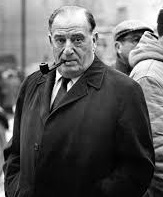
On Dec. 23, 1951 John Huston's The African Queen debuts, written by James Agee based on the 1935 C.S. Forester novel and originally planned for Charles Laughton and Elsa Lanchester in the 1930s, starring Humphrey Bogart as a steamer captain, and Katharine Hepburn as dead missionary's sister Rose Sayer battling the Ulanga River, the German patrol boat Louisa (Konigen Louise), and each other while falling in lu-u-u-v; does $10.8M box office on a $1M budget; first release by the British-based co. Horizon Pictures of Austrian-born Samuel P. "Sam" Spiegel (1901-85), (known as the Velvet Octupus for groping women), followed by "The Bridge on the River Kwai" (1957), "Lawrence of Arabia" (1962), "The Night of the Generals" (1967), "The Swimmer" (1968), and "Nicholas and Alexandra" (1971.)
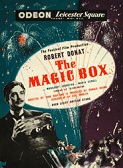
In 1951 John Boulting's The Magic Box (British Lion Films), produced by Ronald Name and written by Eric Ambler based on the bio. by Ray Allister is about English cinematography pioneer William Friese-Greene (1855-1921), played by Robert Donat, with cameos by Laurice Olivier anud Peter Ustinov; does £82K box office in the U.K.
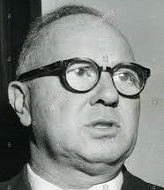

In 1951 Lemberg, Austrian-born Irving Allen (Applebaum) (1905-87) and Queens, N.Y.born Albert Romolo "Cubby" Broccoli (1909-96) found Warwick Films, named after Warwick Hotel in London, with worldwide distribution by Columbia Pictures until 1958, going on to sign Alan Ladd after he leaves Paramount Pictures over monetary disputes, going on to produce 23 films incl. "The Red Beret" (1953), "Hell Below Zero" (1954), "The Black Knight" (1954), "Fire Down Below" (1957), "Killers of Kilimanjaro" (1959), and "Johnny Nobody" (1961) before folding in 1962; too bad, Allen refuses to join Albert R. Broccoli in producing the Ian Fleming James Bond 007 films, declaring that they aren't even "good enough for television", causing Broccoli to ditch him for Harry Saltzman, and when they make big bucks Allen tries to come back by acquiring the rights to the Donald Hamilton Matt Helm series, producing "The Silencers" (1966), "Murderers' Row" (1966), "The Ambushers" (1967), and "The Wrecking Crew" (1969); Dean Martin won't sign on to play Matt Helm without becoming a partner, making more money than Sean Connery does in "Thunderball" (1965), causinng Connery to begin demanding ditto.
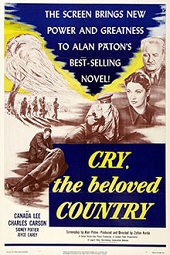
On Jan. 23, 1952 Zoltan Korda's Cry, the Beloved Cuntry (British Lion Films) (United Artists) debuts, based on the 1948 Alan Paton novel, starring Canada Lee as Stephen Kumalo, and Sidney Poitier as Rev. Msimangu, who confront apartheid in the black slums of Johannesburg; does £95K box office in the U.K.
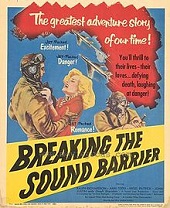
On July 22, 1952 David Lean's (Breaking Through) The Sound Barrier (London Films) (British Lion Films) (United Artists) debuts, becoming Lean's 3rd and last film with wife Ann Todd, and first for Alexander Korda's London Films after the breakup of Cineguild; stars Ralph Richardson as John Ridgefield, pilot of the Prometheus, Nigel Patrick as test pilot Tony Garthwaite, Ann Todd as his wife Susan Garthwaite (John's daughter), and John Justin and Dinah Sheridan as test pilot Philip Peel and his wife Jess; does £227.97K box office on a £250K budget; watch movie.
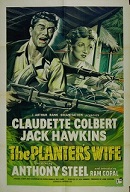
On Sept. 18, 1952 Ken Annakin's B&W The Planter's Wife (Outpost in Malaya) (Pinnacle Productions) (Gen. Film Distributors) (United Artists) debuts, starring Claudette Colbert and Jack Hawkins as Liz and Jim Frazer, whose rubber plantation in Malaya is attacked by Communist insurgents; a hit, causing the Rank Org. to call for scripts about the Mau Mau Uprising, resulting in "Simba" (1955).
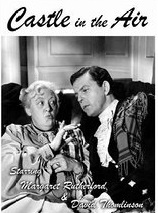
On Dec. 26, 1952 Henry Cass' B&W Castle in the Air (Associated British-Pathe) debuts, based on the 1949 Alan Melville play, a comedy ghost flick starring David Tomlinson as the penniless 19th earl of Locharne, who turns his dilapidated Scottish castle, haunted by family ghost Ermyntrude (Patricia Dainton) into a hotel, and when few want to live there tries to sell it to wealthy Am. divorcee Mrs. J. Clodfelter Dunne (Barbara Kelly) before it is requisitioned by British Nat. Coal Board official Mr. Phillips (Brian Oulton); Margaret Rutherford plays Miss Nicholson, who believes that the earl is the rightful king of Scotland; and Helen Cherry (wife of Trevor Howard) plays the earl's asst. Boss Trent, who vies for his affections with Mrs. Dunne; does £116.7K box office; "Imagine going through life with a name like Clodfelter. She claims to be descendant of my family, which proves she's a crackpot"; "Behind this wall is a sealed-up dungeon where Eric Darndell the 6th earl had his wife's tongue cut out. I understand they lived happily ever after"; "You can't mistake the goat. He's got straight trousers, a face like a rabbit, and the air of a man who's drunk with power"; watch movie.
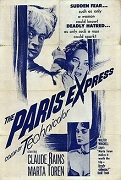
In Dec. 1952 Harold French's The Man Who Watched Trains Go By (The Paris Express) (Eros Films) debuts, based on the 1938 Georges Simenon novel "The Man Who Watched the Trains Go By", starring Claude Rains as Dutch clerk Kees Popinga, who steals from his boss and flees to Paris with his boss' mistress Michele Rozier (Marta Toren); watch movie.
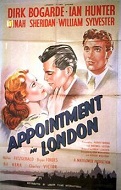
On Feb. 17, 1953 Philip Leacock's Appointment in London (Raiders in the Sky) (Mayflower Pictures) (British Lion Films) debuts, based on a story by RAF bomber pilot John Woolridge stars Dirk Bogarde as wing cmdr. Tim Mason, who attempts to finish his 3rd and last tour of 30 missions; Ian Hunter plays group capt. Logan; Dinah Sheridan plays Eve Canyon; William Sylvester places Mac Baker; watch movie.
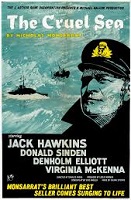
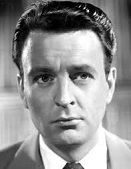
On Mar. 24, 1953 Charles Frend's B&W The Cruel Sea (Ealing Studios) (GDF) (Universal-Internat.) debuts, written by Eric Ambler based on the 1951 Nicholas Monsarrat novel, starring Jack Hawkins as lt. cmdr. George Ericson in a semi-documentary about a Royal Navy corvette on patrol duty in the Atlantic in WWII; co-stars Plymouth, Devon-born actor Sir Donald Alfred Sinden (1923-2014) as Lt. Cmdr. Keith Lockhart, launching his career with the Rank Org. at Pinewood Studios, appearing in 23 movies by the early 1960s; "This is a story of the Battle of the Atlantic, the story of an ocean, two ships, and a handful of men. The men are the heroes; the heroines are the ships. The only villain is the sea, the cruel sea, that man has made more cruel"; watch trailer.
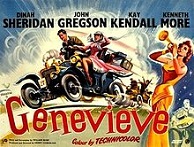
On May 26, 1953 Henry Cornelius' Genevieve (Rank Org.) debuts, written by William Rose, a comedy centering around the annual London-to-Brighton Veteran Car Run, starring John Gregson and Dinah Sheridan as Alan and Wendy McKim, who drive a 1904 Darracq, and Kenneth More as Ambrose Claverhouse, and Kay Kendall as his fashion model girlfriend Rosalind Peters, who drive a 1905 Spyker with her St. Bernard in it; watch movie.
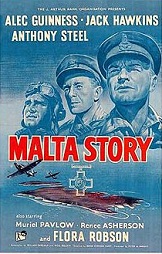
On June 23, 1953 Brian Desmond Hurst's B&W Malta Story (Thea Film Productions) (GFD) (United Artists) debuts, written by Nigel Balchin and William Fairchild, about the British air defense of Malta in WWII, starring Alec Guinness as Flt. Lt. Peter Ross (based on Adrian Warburton), Jack Hawkins as Air Commodore Frank, Anthony Steel as Wing Cmdr. Bartlett, and Muriel Pavlow as Peter's babe Maria Gonzar; music by William Alwyn; watch clip.
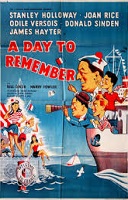
On Nov. 10, 1953 Ralph Thomas' B&W A Day to Remember (Gen. Film Distributors) (Republic Pictures) debuts, produced by Betty Box and written by Robin Estridge based on Jerrard Tickell's "The Hand and the Flower", starring Stanley Holloway as Charley Porter, Donald Sinden as Jim Carver, Joan Rice as Vera Mitchell, James Hayter as Fred Collins, Odile Versois as Martine Berthier, and Harry Fowler as Stan Harvey, a group of friends in London visiting France for the first time since WWII; watch clip.
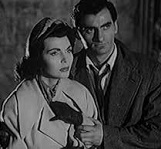
In Dec. 1953 John Gilling's Escape by Night (Southall Studios) (Eros Films) debuts, starring Bonar Colleano as alcoholic journalist Tom Buchan, who attempts to get the life story of Italian crime boss Gino Rossi (Sid James) by promising to fly him back to Italy; Simone Silva plays nightclub singer Rosetta Mantania; watch movie.
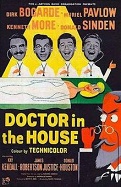
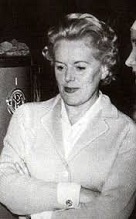
On Mar. 23, 1954 Ralph Thomas' Doctor in the House (Rank Org.) debuts, a comedy produced by Betty Evelyn Box (1915-99) and written by Nicholas Phibbs based on the Richard Gordon novel, starring Dirk Bogarde as medical student Simon Sparrow at St. Swithin's Hospital in London, chronicling his five hilarious years there, becoming the #1 box office hit in 1954 in Britain and making Bogarde a big star; co-stars James Robertson Justice as Sir Lancelot Spratt, and Donald Sinden as Tony Benskin, known for wearing a duffel coat, failing his finals regularly while chasing pretty nurses with his "wolf-growl"; spawns six sequels starting with "Doctor at Sea" (1955) and ending with "Doctor in Trouble" (1970); watch clip.
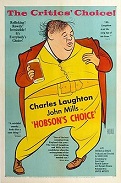
On Apr. 19, 1954 David Lean's B&W Hobson's Choice (British Lion Films) (United Artists) debuts, based on the play by Harold Brighouse, starring Charles Laughton as alcoholic Victorian bootmaker Henry Hobson, Brenda De Banzie as his daughter Maggie, and John Mills as her beau Will Mossop, who marries her and ends up as Henry's partner; does £206.57K box office; watch movie.
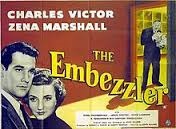
In July 1954 John Gilling's B&W The Embezzler (Kenwilworth Film Productions) (Gen. Film Distributors) debuts, starring Charles Paulson as bank teller Henry Paulson, who decides to become a you know what, and flees with Mrs. Forrest (Zena Marshall), who drags him down with her own problems; watch movie.
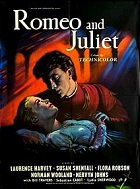
On Sept. 1, 1954 Renato Castellani's Romeo and Juliet (Rank Org.) debuts, based on the Shakespeare play, starring Laurence Harvey as Romeo, Susan Shentall (after Joan Collins passes and she is picked out in a bar, getting married and never acting again) as Juliet, Flora Robson as the Nurse, Mervyn Johns as Friar Laurence, Bill Travers as Benvolio, Sebastian Cabot as Lord Capulet, Enzo Fiermonte as Tybalt, and John Gielgud as the Chorus; watch movie.
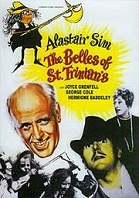
On Sept. 28, 1954 Frank Launder's The Belles of St. Tirnian's (British Lion Films) (London Films) debuts, inspired by British cartoonist Ronald Searle, starring Alastair Sim as headmistress Miss Millicent Fritton of St. Trinian's School in Barchester County (when Margaret Rutherford proves unavailable) and her bookmaker twin brother Clarence Fritton, who befriends Fatima, daughter of the sultan of Makyad (Eric Pohlmann) to get inside info. on his racehorse Arab Boy.
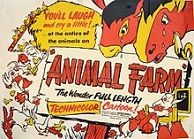
On Dec. 29, 1954 John Halas' and Joy Bachelor's animated Animal Farm debuts, based on the 1945 George Orwell novel, paid for the the CIA as anti-Commie propaganda, and voiced by Maurice Denham; watch movie.
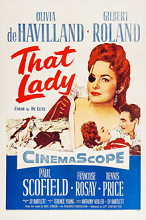
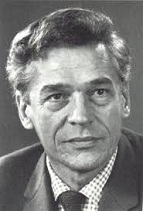
On May 11, 1955 Terence Young's That Lady (MGM) (Atalanta Film) debuts, produced by Sy Bartlett and Ronald Kinnoch based on the 1946 Kate O'Brien novel "For One Sweet Grape", and filmed in Cinemascope, featuring breathtaking footage of the Spanish countryside, starring eyepatch-wearing Olivia de Havilland as sword-toting princess Ana de Mendoza, princess of Eboli, who losst her right eye defending the honor of her workaholic king Philip II of Spain, played by Birmingham-born stage actor David Paul Scofield (1922-2008) in his film debut; Gilbert Roland plays commoner Antonio Perez, whom Philip II wants to be his first secy., giving Ana the job of tutoring him, only to see them hook up and cause a scandal, whipped up by Philip II's other minister Mateo Vasquez (Dennis Price); Christopher Lee has a minor role as capt. of the guard; music by John Addison.
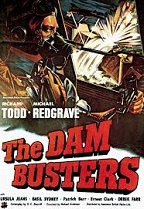
On May 16, 1955 Michael Anderson's The Dam Busters (Associated British Picture Corp.) debuts, written by Robert Cedric Sherriff based on a book by Paul Brickhill about the RAF 617 Squadron and the Bouncing Bomb in 1943 Operation Chastise, starring Richard Todd as Wing Cmdr. Guy Gibson, Basil Sydney as air chief marshal Sir Arthur Harris, Derek Farr as Group Capt. John Whitworth, Ernest Clark as Air Vice-Marshal Ralph Cochrane, Patrick Barr as test pilot Capt. Joseph "Mutt" Summers, Michael Redgrave as bomb inventor Dr. Barnes Wallis, and Ursula Jeans as his wife Molly Wallis; does £419K box office; in 1999 the British Film Inst. votes it the 68th greatest British film of the 20th cent.; watch clip.
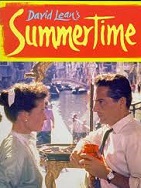
On June 21, 1955 David Lean's Summertime (United Artists) debuts, based on the Arthur Laurents play "The Time of the Cuckoo", staring Katharine Hepburn as elementary school secy. Jane Hudson from Akron, Ohio, who goes on summer vacation in Venice and watches all the couples loving it up, getting lonely until she hooks up with Renato di Rossi (Rossano Brazzi), but alas, it has to end in a long goodbye; does $2M box office in the U.S.; watch trailer; watch clip.
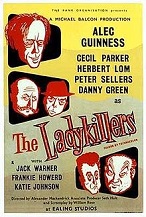
On Dec. 8, 1955 Alexander Mackendrick's The Ladykillers (Ealing Studios) debuts, written by William Rose from a dream is a black comedy, starring Katie Johnson as sweet eccentric old widow Mrs. Louisa Alexandra Wilberforce, who likes to report her neighbors to the police so often that they quit taking her seriously, and rents rooms to Prof. Marcus (Alec Guinness after Alastair Sim turns it down), who is organizing a gang (Cecil Parker, Peter Sellers, Danny Green, and Herbert Lom) to rob an armored van at King's Cross railway station in London, claiming that they are an amateur string quartet, after which she catches them trying to make away with the loot, and they decide to kill her but kill each other instead, leaving her with the loot, which she reports to the police, who don't believe her and let her keep it; Jack Warner plays the police suptd.; watch movie.
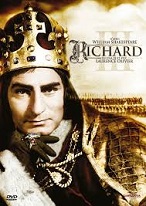
On Dec. 13, 1955 Laurence Olivier's Richard III (London Films) debuts, based on the Shakespeare play, starring Olivier as humpbacked twisted Richard of Gloucester (1452-85) in an acclaimed performance; Cedrick Hardwicke plays his brother Edward IV (1442-83), and John Gielgud plays doomed Duke George of Clarence (1449-78) of drowned-in-a-butt-of-malmsey fame; Salvador Dali paints Olivier's portrait in costume during filming; Olivier models his raven-hared looks on widely-hated theatrical producer Jed Harris (1900-79), who is later used by Disney as the basis for the Big Bad Wolf in "Three Little Pigs"; does £400K U.K. and $2.6M U.S. box office on a £6M budget; Elizabeth II and Prince Philip attend the debut at Leicester Square Theatre; after being shown on U.S. network TV on Mar. 11, 1956 (Sun.) simultaneous with its cinema release, it tanks at the box office, but after being re-released in 1966 it breaks box office records, ending up doing more to popularize Shakespeare than any other single work?
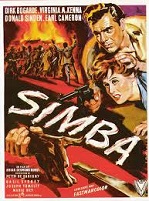
In 1955 Brian Desmond Hurst's Simba (Rank Org.) debytsm shot in Kenya, about a British family in East Africa who get caught up in the Mau Mau Rising; stars Dirk Bogarde (after Jack Hawkins proves unavailable) as Alan Howard, Donald Sinden as Inspector Drummond, Basil Sydney as Mr. Crawford, Marie Ney as Mrs. Crawford, and Marylebone, London-born Virginia Anne McKenna (1931-) as Mary Crawford, whom they like so much they give her a long-term contract; watch movie.
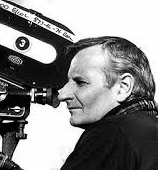
On Feb. 5, 1956 the Free Cinema documentary film movement in England, eschewing propaganda and deliberate box office appeal is launched by Bangalore, British India-born film critic Lindsay Gordon Anderson (1923-94) with the debut of three short documentary films at the Nat. Film Theatre in London, which are a hit, causing five more showings by Mar. 1959; "These films were not made together; nor with the idea of showing them together. But when they came together, we felt they had an attitude in common. Implicit in this attitude is a belief in freedom, in the importance of people and the significance of the everyday. As filmmakers we believe that: No film can be too personal. The image speaks. Sound amplifies and comments. Size is irrelevant. Perfection is not an aim. An attitude means a style. A style means an attitude."
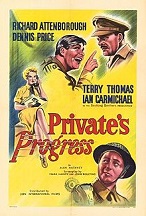

On Feb. 17, 1956 John Boulting's Private's Progress (Charter Film Productions) (British Lion Films) debuts, filmed at Shepperton Studios and Wantage Hall, U. of Reading, starring Ian Carmichael as college undergrad Stanley Windrush, who is drafted into the British army with friend Egan (Peter Jones), becoming a gen. fuckup until his uncle brig. gen. Bertram Tracepurcel (Dennis Price) asks him and Pvt. Cox (Richard Attenborough) to join Operation Hatrack to recover stolen artworks from the Nazis, finding out that the real plan is to sell them to crooked art dealers; gap-toothed Finchley, North London-born stage actor Terry-Thomas (Thomas Terry Hoar Stevens) (1911-90) plays Maj. Hitchcock, ramping up his film career, allowing him to move to Hollywood in 1961 and become a comic icon.
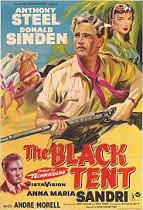
In Mar. 1956 Brian Desmond Hurst's The Black Tent (Rank Org.) debuts, written by Bryan Forbes and Robin Maugham, starring Anthony Steel as British Capt. David Holland during WWII, who takes shelter with a Bedouin tribe in Libya and marries Mabrouka (Anna Maria Sandri), daughter of Sheik Salem ben Yussef (Andre Morrell), causing his brother Col. Sir Charles Holland (Donald Sinden) to go searching for him after the war using guide Ali (Donald Pleasance), the desert scenes becoming an eerie preview of David Lean's "Lawrence of Arabia" (1962); music by William Alwyn; watch movie.
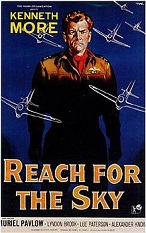
On July 5, 1956 Lewis Gilbert's Reach for the Sky (Rank Org.) debuts, based on the 1954 bio. of British aviator Douglas Bader by Paul Brickhill, starring Kenneth More as an RAF cadet who disobeys orders and tries low-alt. aerobatics, crashing and losing his legs, after which he masters prosthetic legs and resumes flying, working up to group capt.; Bader's brother-in-law composes the musical score; does £1.5M box office on a £365K budget.
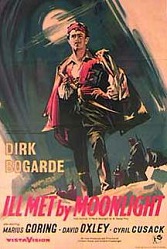
On Mar. 4, 1957 Michael Powell's and Emeric Pressburger's B&W Ill Met by Moonlight (Night Ambush) (Rank Org.), based on the 1950 autobio. by Capt. W. Stanley "Bill" Moss about the capture of German Gen. Heinrich Kreipe (Marius Goring) in Crete in Feb.-Apr. 1944 stars Dirk Bogarde as Maj. Patrick Leigh "Paddy" Fermor AKA Philedem, David Oxley as Moss, and Cyril Cusack as Capt. Sandy Rendel; watch movie.
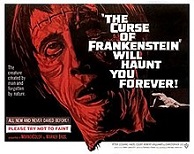
On May 2, 1957 Terence Fisher's The Curse of Frankenstein (Hammer Film Productions) (Warner Bros.) debuts, starring Peter Cushing as Baron Victor Frankenstein, Melvyn Hayes as young Frankenstein, Christopher Lee as the creature, Hazel Court as Victor's fiancee Elizabeth, and Robert Urquhart as his tutor Paul Krempe; Hammer's first color horror film ("the first really gory horror film, showing blood and guts in color" - Patricia MacCormac), becoming a big hit that launches their distinctive gothic Hammer Horror film series; does $8M box office on a $270K budget; watch trailer.

On June 13, 1957 Laurence Olivier's The Prince and the Showgirl (Warner Bros.) debuts, based on Terence Rattigan's 1953 play "The Sleeping Prince", starringLaurence Olivier as Charles, Prince Regent of Carpathia, and Marilyn Monroe as Am. showgirl Elsie Marina in 1910 London, complete with a Sylvester the Cat cartoon ("Greedy for Tweedy"), a newsreel, and coming attractions for "Spirit of St. Louis"; Sybil Thorndike plays the dowager queen; Monroe clearly didn't do anything for Olivier?; does $4.3M box office.

On Oct. 2, 1957 David Lean's The Bridge on the River Kwai (the Mae Khlung or Klong River in real life, which is later renamed in honor of the movie) (Oct. 2) (Horizon Pictures), written by Hollywood Blacklist writers Carl Foreman and Michael Wilson based on the 1952 Pierre Boulle novel stars William Holden as U.S. Navy Cmdr. Shears (first Hollywood star to make $1M for a film), and Alec Guinness as British Lt. Col. Nicholson, who end up in in a kind of menage a trois with Japanese POW cmdr. Col. Saito (Sessue Hayakawa), with Guinness trying to build his bridge while Holden tries to destroy it, until Guinness does the typical British blindly-loyal-then-wakes-up-Christ-act at the last moment; the whistling song Colonel Bogey March by Mitch Miller and His Orchestra gets airtime; Wilson and Foreman are uncredited because of Hollywood blacklisting, causing French novel writer Pierre Boulle to be credited alone; does $30.6M box office on a $2.8M budget.
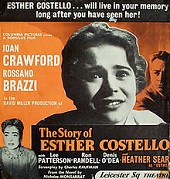
On Nov. 6, 1957 David Miller's The Story of Esther Costello (Romulus Films) (Columbia Pictures), based on the 1952 novel by Nicholas Monsarrat stars Joan Crawford as wealthy childless Margaret Landi, who patronizes 15-y.-o. deaf-dumb-blind Irish girl Esther Costello (Heather Sears), teaching her sign language and Braille, after which her hubby Carlo Landi (Rossano Brazzi) uses her as a way to make money, getting her alone and raping her, causing her sight and hearing to be restored (psychosomatic), after which Margaret kills Carlo and herself; does $1M box office; the novel and film piss-off Helen Keller, who tries to stop them; watch trailer; watch movie.
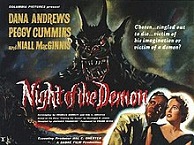
In Nov. 1957 Jacques Tourneur's B&W Night (of the Demon (Columbia) debuts, based on the 1911 story "Casting the Runes" by M.R. James, starring Dana Andrews as Am. pshrink Dr. John Holden, who investigates a Satanic cult suspected of murders run by Dr. Julian Karswell (Niall MacGinnis), who ends up mangled by a giant demon on the railroad tracks; shortened version Curse of the Demon debuts in June 1958 - one of TLW's boyhood favorites?
In 1957 to get around Am. objections to an outright subsidy, the Eady Levy, proposed by Board of Trade pres. Harold Wilson and named after Treasury official Sir (Crawfurd) Wilfrid Griffin Eady (1890-1962) is established in Britain as a levy on box office receipts to support the British film industry, allowing overseas firms to write-off production costs by filming in Britain; it is abolished in 1985 amid record low attendance.
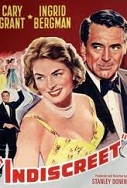
On June 26, 1958 Stanley Donen's Indiscreet (Warner Bros.) debuts, based on the 1594 Norman Krasna play "Kind Sir", starring Cary Grant as handsome bachelor economist Philip Adams, who hooks up with Anna Kalman (Ingrid Berman), and pretends to be married until she finds out; does $8M box office in the U.S.; watch movie.
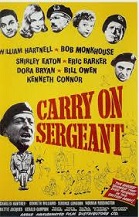
On Aug. 1, 1958 Gerald Thomas' Carry On Sergeant (Anglo-Amalgamated) debuts, produced by Peter Rogers and written by Norman Hudis and John Antrobus based on the play "The Bull Boys" by R.F. Delderfield, about retiring Sgt. Grimshaw (William Hartnell), who receives new recruits Charlie (Bob Monkhouse), hypochondriac Horace Strong (Kenneth Connor), failure Herbert Brown (Norman Rossington), upper-class cadet Miles Heywood (Terence Longdon), rocker Andy Galloway (Gerald Campion), dainty whimp Peter Golightly (Charles Hawtry), and superior univ. graduate James Bailey (Kenneth Williams), and makes a bet with Sgt. O'Brien (Terry Scott) that he will turn them into a champion platoon, deciding to use kindness rather than shouting; Hattie Jacques plays medical officer Capt. Clark; music by the Coldstream Guards Band; a hit, becoming the first of 31 low-budget Carry On Films (1958-78, 1992).
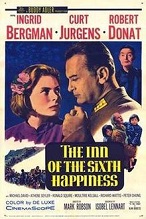
On Nov. 23, 1958 Mark Robson's The Inn of the Sixth Happiness (20th Cent. Fox) debuts, based on the 1957 Alan Burgess novel "The Small Woman" about 1930s English missionary Gladys Aylward (1902-70), played by Ingrid Bergman leading a group of children (from Liverpool) through war-torn China (filmed in Snowdonia, North Wales); Robert Donat's last film (his last words in the film: "We shall not see each other again, I think. Farewell"); introduces the children's marching song This Old Man; "This old man he played drum (shoe, tree, door, hive, sticks, oven, gate, line, hen), he played nick-nack on my ..."
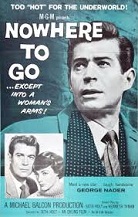
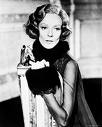
On Dec. 2, 1958 Seth Holt's Nowhere to Go (Ealing Films) (MGM) debuts, starring George Nader as escaped criminal Paul Gregory ,who is shunned by the criminal community, throwing him in the arms of Bridget Howard, played by Margaret Natalie "Maggie" Smith (1934-) in her first credited film role; Bernard Lee plays Victor Sloan alias Lee Henderson; does $460K box office on a $468K budget; watch clip.
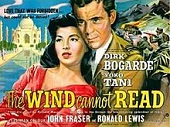
In 1958 Ralph Thomas' The Wind Cannot Read (Rank Org.) debuts, based on the Richard Mason novel, a 3-hanky film filmed on location in India starring Dirk Bogarde (after Glenn Ford and Kenneth More pass) as British Flt. Lt. Michael Quinn in 1943 Burma, who falls for his Japanese instructor Sabbi (Yoko Tani), fighting discrimination until he is captured by the Japs in India, and escapes to discover that his babe is suffering from a terminal brain tumor; Ronald Lewis plays Fenwick, and John Fraser play Peter Munroe; the The Wind Cannot Read Theme Song is performed by Vera Lynn; watch movie.
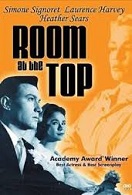
On Jan. 22, 1959 Jack Clayton's B&W Room at the Top (British Lion Films) debuts, based on the 1957 novel by John Braine, starring Laurence Harvey as climber Joe Lampton in 1940s factory town Dufton, who moves to Warnley, Yorkshire to take up a bureaucratic job, then hooks up with Susan Brown (Heather Sears), daughter of the local big man, who gets pissed-off and sends her abroad, after which he hooks up with married Alice Aisgill (Simone Signoret); too bad, Susan returns, is seduced by Joe and gets preggers, causing daddy to force him to marry her, after which Alice goes bonkers and gets in a drunk driving accident; does $2.4M box office on a £280K budget; watch clip.

On Apr. 21, 1959 Basil Dearden's Sapphire debuts, written by Janet Green and produced by Earl St. John, starring Yvonne Mitchell as a West Indian immigrant who is black and passing for white, running into bigotry; Earl Cameron plays her brother Dr. Robbins; Nigel Patrick plays Police Suptd. Robert Hazard; "The sensational story of a girl who didn't belong"; watch clip.
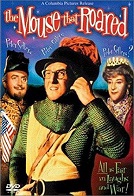
On July 17, 1959 Jack Arnold's The Mouse That Roared (Highroad Productions) (Columbia Pictures) debuts, written by Roger MacDougall and Stanley Mann based on the 1955 Leonard Wibberly novel about the European Duchy of Grand Fenwick declaring war on the U.S. in order to get foreign aid stars Peter Sellers in three roles, Duchess Gloriana XII, PM Count Rupert Mountjoy, and Gen. Tully Bascomb; co-stars Jean Seberg as the eye candy Helen Kokintz; does $2M box office U.S. and Canada; "All is fair in laughs and war"; "They're taking over the country in invasion of laughs"; watch trailer.
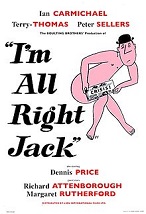
On Aug. 18, 1959 John Boulting's B&W I'm All Right Jack (Charter Film Productions) (British Lion Films) debuts, based on Alan Hackney's novel "Private Life" as a sequel to "Private's Progress" (1956), set in Stanley Windrush's uncle Bertram Tracepurcel's missile factory, featuring Peter Sellers as union shop steward Fred Kite; watch movie.
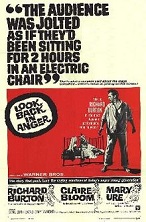



On Sept. 15, 1959 Tony Richardson's B&W Look Back in Anger (Warner Bros.) debuts, a British New Wave (kitchen sink realism) movie based on the 1956 John Osborne play, starring Richard Burton as disaffected young jazz trumpet player and sweet stall owner Jimmy Porter, who is abusive to his upper-middle-class frigid wife Alison, played by Scottish actress Eileen Mary Ure (1933-75) (real wife of John Osborne in 1929-94, who got him to divorce his wife to marry her in 1957, then begins an affair this year with Robert Shaw in London while co-starring in "The Changeling"), and lives with her and his Welsh biz partner and lodger Cliff Lewis (Gary Raymond); when Alison gets preggers, she is afraid to tell Jimmy, and asks her actress friend Helena Charles (Claire Bloom) to move in with them, who asks Alison's daddy Col. Redfern (Glen Byam Shaw) to take Alison in, after which Helena breaks the news to Jimmy, who calls her an evil-minded virgin and says he doesn't care about the baby, after which they make love, locking Cliff out, causing him to decide to leave, and Jimmy to quit working with him; Edith Evans plays Ma Tanner; the film debut of Cambridgeshire-born hook-nosed Nigel Davenport (1928-2013) as a walk-on; the dir. debut of Cecil Antonio "Tony" Richardson (1928-91); "They all want to escape from the pain of being alive"; "The audience was jolted as if they'd been sitting for 2 hours in an electric chair"; does $1.1M box office on a £250K budget; watch trailer; first release from the British co. Woodfall Film Productions, founded by Tony Richardson, John Osborne, and Harry Saltzman, followed by "The Entertainer" (1960), "Saturday Night and Sunday Morning" (1960), "A Taste of Honey" (1961), "The Loneliness of the Long Distance Runner" (1962), "Tom Jones" (1963), "Girl with Green Eyes" (1964), "One Way Pendulum" (1964), "The Knack... and How to Get It" (1965), "Mademoiselle" (1966), "The Sailor from Gibraltar" (1967), "The Charge of the Light Brigade" (1968), "Inadmissible Evidence" (1968), "Laughter in the Dark" (1969), "Hamlet" (1969), "Ned Kelly" (1970), "Dead Cert" (1974), "Joseph Andrews" (1977), and "The Hotel New Hampshire" (1984).
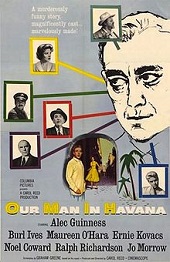
On Dec. 30, 1959 Carol Reed's B&W Our Man in Havana (Kingsmead Productions) (Columbia Pictures) debuts, based on the 1958 Graham Greene novel, starring Alec Guinness as English expatriate Jim Wormold, who runs a vacuum cleaner shop and is recruited by Hawthorne (Noel Coward) to work for MI6 supervisor C (Ralph Richardson), then starts a fake spy service with fake agents to pay for his daughter Milly's (Jo Morrow) expensive habits, which backfires when enemy agents think it's real; Maureen O'Hara plays his secy. Beatrice; Burl Ives plays Dr. Haselbacher; Ernie Kovacs plays Capt. Segura; does $2M box office in the U.S.; Fidel Castro visits the set at Cathedral Square in Havana on May 13, 1959; features the Tropicana Scene; watch trailer.
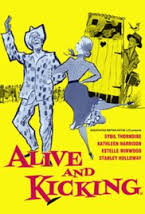
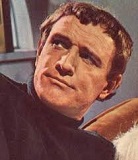
In 1959 Cyril Frankel's B&W Alive and Kicking (Warner-Pathe Distributors) (Seven Arts) debuts, a British musical comedy film starring Sybil Thorndike, Kathleen Harrison, and Estelle Winwood as little old ladies Dora, Rosie, and Mabel, who decide to chuck their retirement home and search for adventure, ending up with their own successful sweater business in Ireland; the film debut of Limerick, Ireland-orn actor (teenie rugby star) Richard St. John Harris (1930-2002) as the Lover; watch trailer.
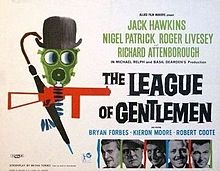
On Apr. 5, 1960 Basil Dearden's B&W The League of Gentlemen (British Lion Films) debuts, written by Bryan Forbes based on the 1958 John Boland novel, starring Jack Hawkins (as Lt. Col. Norman Hyde), Nigel Patrick (as Maj. Peter Race), Bryan Forbes (as Capt. Martin Porthill), and Richard Attenborough (as Lt. Edward Lexy) as a group of military-style bank robbers; watch trailer.
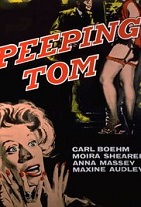
On May 16, 1960 Michael Powell's Peeping Tom (Anglo-Amalgamated Film Distributors) debuts, a horror film written by Leo Marks starring Carl Boehm as Mark Lewis, who murders women to observe their faces while he films them, and Anna Massey as his next victim, his fiancee Helen Stephens; Powell plays Boehm's daddy, who got him started; too bad, it's too good, and so freaks the moviegoers that it ruins Powell's dir. career in the U.K.; in the 1970s it gains a cult following, causing Powell to write the soundbyte: "I make a film that nobody wants to see and then, thirty years later, everybody has either seen it or wants to see it"; watch trailer.
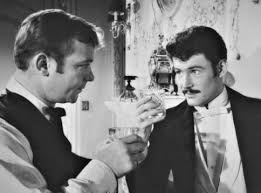
On May 17, 1960 John Guillermin's B&W The Day They Robbed the Bank of England (MGM) debuts, based on the 1959 John Brophy novel set in 1905 London, starring Aldo Ray as Irish-Am. IRA agent Charles Norgate, who is enlisted to rob the Bank of England of 1 million pounds in gold as a political statement, and Peter O'Toole as Lt. Monte Fitch of the Guard, who unwittingly gives him info. to help him, then tries to atone by catching him; does $805K box office on a $457K budget; O'Toole's performance gets him cast as the lead in "Lawrence of Arabia" (1962).
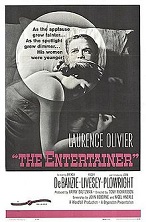
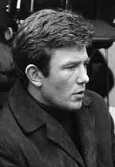
On July 25, 1960 Tony Richardson's B&W The Entertainer (Woodfall Film Productions) (British Lion Films)) debuts, produced by Harry Saltzman based on the 1957 John Osborne play, filmed in Morecambe, Lancashire, starring Laurence Olivier as failing music hall performer Archie Rice; the film debut of Charlestown, Pendleton-born Albert Finney (1936-) as Archie's son Mick Rice, who is captured by the Egyptians during the Suez Crisis; watch clip; watch opening.
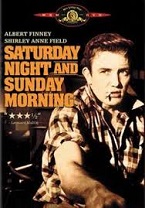
On Oct. 27, 1960 Karel Reisz's B&W Saturday Night and Sunday Morning (Woodfall Film Productions) (Bryanston Films) debuts, based on the 1958 Alan Sillitoe novel, starring 23-y.-o. Albert Finney as working class Arthur Seaton of Nottingham, who pursues old-fashoned Doreen (Shirley Anne Field) while having an affair with older married Brenda (Rachel Roberts), who gets preggers, drawing her hubby Jack's (Bryan Pringle) revenge, causing Doreen to pussy-whip him into going straight?; Reisz's first feature film; watch trailer.


On Oct. 28, 1960 Edmond T. Greville's B&W Beat Girl (Wild for Kicks) debuts, a late-arriving 1950s youth rebellion flick from Britain, starring newbies Gillian Hills (1944-) ("the English Brigitte Bardot") (Barbie Doll lookalike?) and blonde-blue English singer Adam Faith (1940-2003) (a wannabe James Dean?), plus Christopher Lee and Oliver Reed, showing the London underground and its Elvis imitators, strippers, and potheads; topless stripping scenes get it banned for awhile in the U.K., making it more popular?; the music by John Barry confuses rock and roll with a jazz workout by a brass orchestra?; "If it's beat - jazz, that is." Watch movie.
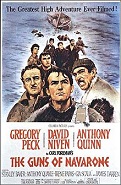
On June 22, 1961 J. Lee Thompson's The Guns of Navarone (Columbia Pictures) deuts, based on the 1957 Alistair MacLean novel and filmed on Rhodes, starring Gregory Peck as Capt. Keith Mallory, head of a British team incl. Cpl. Anthony Miller (David Niven), Maj. Roy Franklin (Anthony Quayle), and Pvt. Butcher Brown ("Butcher of Barcelona") (Stanley Baker), who are sent to destroy an impregnable German gun overlooking the Aegean Sea with the help of Greek partisans incl. Col. Andrea Stavrou (Anthony Quinn), and Pvt. Spyros Pappadimos (James Darren); up-and-coming he-can-sing-too actor Richard Harris (1930-2002) gets a memorable bit part as squadron leader Howard Barnsby of the RAAF, who reports that the "bloody guns" can't be blown up from the air; does $28.9M box office on a $6M budget; watch movie.
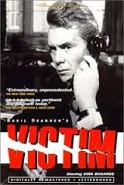
On Aug. 31, 1961 Basil Dearden's B&W Victim (Allied Film Makers) (Rank Org.) debuts, starring Dirk Bogarde as London barrister Melville Farr, who has a gay affair with young working class stud Boy Barrett (Peter McEnery), who is blackmailed and commits suicide, causing Farr to decide to go public and get them caught; meanwhile Farr's wife Laura Farr (Sylvia Syms) tries to understand; it becomes the first English language film to use the word "homosexual", pissing-off the British Board of Film Censors and the Motion Picture Assoc. of Am. (MPAA), which refuse to grant it their seals of approval; watch trailer.

On Sept. 15, 1961 Tony Richardson's A Taste of Honey (Woodfall Film Productions) (British Lion Films) debuts, based on the 1959 play by Shelagh Delaney, starring what-a-name Rita Tushingham (1942-) as white working class girl Jo, whose slutty alcoholic mother Helen (Dora Bryan) kicks her out, after which she falls in instant love with black sailor Peter Smith (Robert Stephens), gets pregnant, and turns to white homo Geoffrey (Murray Melvin) (who moves in with her, but of course doesn't want her tushy, not because, er, forget it?) for help in becoming a woman; makes a star out of Tushingham, who becomes the icon for white women who like black men; inspires the Beatles' song "Your Mother Should Know"; watch movie - milk, honey, and chocolate on my hammy tushy?

On Nov. 23, 1961 Val Guest's The Day the Earth Caught Fire (British Lion Films) (Universal-International) debuts, starring Edward Judd, Leo Mckern, and Janet Munro in an apocalyptic film about U.S.-Soviet nuclear weapons tests knocking the Earth out of orbit, causing it to move closer to the Sun; watch trailer.


In 1961 Queens, N.Y.born Albert Romolo "Cubby" Broccoli (1909-96) and Sherbrooke, Quebec, Canada-born Herschel "Harry" Saltzman (1915-94) found the British film production co. Eon (Everything or Nothing) Productions in Piccadilly Circus, London, operating from Pinewood Studios, going on to acquire film rights to Ian Fleming's James Bond 007 char. and found Danjaq S.A. (named after their wives Dana and Jacqueline) in 1962 as a holding co. for the copyrights and trademarks, producing 24 James Bond 007 films, incl. "Dr. No" (1962), "From Russia with Love" (1963), "Goldfinger" (1964), "Thunderball" (1965), "You Only Live Twice" (1967), "On Her Majesty's Secret Service" (1969), "Diamonds Are Forever" (1971), "Live and Let Die" (1973), "The Man with the Golden Gun" (1974), "The Spy Who Loved Me" (1977), "Moonraker" (1979), "For Your Eyes Only" (1981), "Octopussy" (1983), "A View to a Kill" (1985), "The Living Daylights" (1987), "Licence to Kill" (1989), "GoldenEye" (1995), "Tomorrow Never Dies" (1997), "The World Is Not Enough" (1999), "Die Another Day" (2002), "Casino Royale" (2006), "Quantum Solace" (2008), "Skyfall" (2012), and "Spectre" (2015).



In 1961 Bombay, India-born N.Y.U. business student Ismail Merchant (1936-2005) meets U.S.-born James Ivory (1928-) at a New York City coffee shop, and they form a gay film partnership, adding German-born screenwriter Ruth Prawer Jhabvala (1927-2013) in 1963, starting with The Householder (1963), based on the 1960 Ruth Prawer Jhabvala novel. becoming the first of almost 40 films from the Merchant-Ivory producer-dir. partnership, incl. "The Europeans" (1979), "The Bostonians" (1984), "A Room with a View" (1985), "Howards End" (1992), and "The City of Your Final Destination" (1992).
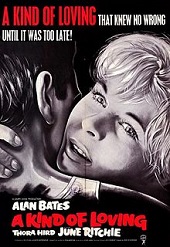
On Apr. 12, 1962 John Schlesinger's A Kind of Loving (Anglo-Amalgamated Films) debuts, based on the 1960 Stan Barstow novel, a British New Wave kitchen sink drama starring Alan Bates as Manchester draughtsman Victor Arthur "Vic" Brown, who hooks up with secy. Ingrid Rothwell (June Ritchie), then have a losing streak and agree on making do with you know what; does £450K box office on a £165K budget; watch trailer.
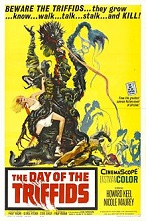
In July 1962 Steve Sekely's The Day of the Triffids (Rank Org.) (Allied Artists) debuts, based on the 1951 John Wyndham novel about evil walking aparaguses from outer space, starring Howard Keel as merchant navy officer Bill Masen, who flees London after a meteor shower blinds everybody with school girl Susan (Janina Faye); Nicole Maurey plays Christine Durant; Janette Scott plays Karen Goodwin; the disappointing ending shows Triffids being dissolved by saltwater.
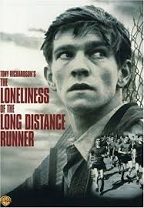
On Sept. 21, 1962 Tony Richardson's B&W The Loneliness of the Long Distance Runner (Woodfall Film Productions) (British Lion Films) debuts, based on the 1959 Alan Sillitoe story, starring Tom Courteney as rebellious Nottingham borstal boy Colin Smith, who has a talent for stubbing his silly toe on a track, and Michael Redgrave as the Ruxton Towers reformatory gov., whom he pisses-off by stopping just short of the finish line at a key cross-country race; on Jan. 9, 2009. impeached Ill. gov. Rod Blagojevich compares himself and his ordeal to Smith.
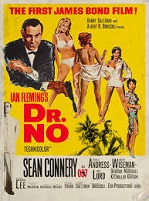



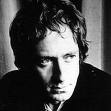
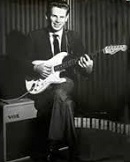
On Oct. 6, 1962 Terence Young's Dr. No (Eon Productions) debuts, based on the 1958 novel by Ian Lancaster Fleming (1908-64), becoming the first James Bond 007 film by Eon (Everything or Nothing) Productions, owned by partners (until 1974) Albert Romolo "Cubby" Broccoli (1909-96) and Herschel "Harry" Saltzman (1915-94), who met after Broccoli dropped plans to produce "Oscar Wilde" because of potential U.S. censorship for homosexuality; a low-budget film, it features a low-budget but super-cool trademark Looking Down a Gunbarrel Intro., with the ultra-cool surf rock-style James Bond Theme, written by Monty Norman (1928-) (based on his song "Good Sign Bad Sign" for his musical "A House for Mr. Biswas") and arranged by English film composer John Barry (John Barry Prendergast) (1933-2011), with the guitar riff played by English guitarist Victor Harold "Vic" Flick (1937-) on his Olympic white 1961 Fender stratocaster; it stars muscular super-handsome 6'2" Scottish actor Sir Thomas Sean Connery (1930-2020) (after Cary Grant turns it down, believing himself too old) as very straight British Agent 007 James Bond (in his first of six 007 films), whose one-of-a-kind combo of looks, manner, and heft conditions millions of history ignoramuses to accept a brogue-spitting Scot as the everhard English superhero, who insists that his martinis be made with vodka (not gin), shaken (not stirred) (causing the popularity of vodka to begin rising in the U.S.), and who can save the world on command with judo and hi-tech gadgetry, incl. his trademark Walther PPK pistol, and who uses women like a cad for guilt-free sex (you provide the birth control pills) with the most sexy suave manner ever seen; the first bikini-clad "Bond girl" Ursula Andress (1936-) (as Honey Rider) rises to stardom with him; Dr. Julius No is played by Joseph Weisman (1906-77); 007's CIA contact Felix Leiter is played by Jack Lord (1920-98), later of "Hawaii Five-O" fame; Bernard Lee (1908-81) plays MI6 head man M; the first choice for 007 was Irish actor Richard Andrew Palethorpe Todd (1919-2009), who had a scheduling conflict; does $59.5M box office on a a $1.1M budget; one of the great what-ifs in history is the failure to cast sex bomb Marilyn Monroe, who dies on Aug. 5 when caught hanging around too long in L.A.?; the only other EON Productions film besides James Bond is Bob Hope's "Call Me Bwana" (1963); after this the 007 productions grow in budget and try to outdo each other with dangerous stunts; in 1966 Broccoli is in Japan scouting locations for another 007 flick when he cancels his ticket to BOAC Flight 911 to see a ninja show, and it crashes from clear air turbulence - the first 9/11 would have to relate to 007, wouldn't it?

On Dec. 10, 1962 David Lean's Lawrence of Arabia (Columbia Pictures) (Horizon Pictures) debuts, making a star of Irish-born actor Peter Seamus Lorcan O'Toole (1932-) in his first major film as British soldier T.E. Lawrence going Arab during WWI, along with supporting actors Alec Guinness, Anthony Quinn, and Egyptian actor Omar Sharif (Arab. "noble") (Michel Demitri Chalhoub) (1932-2015) (first English language role), culminating in the capture of Damascus after Turkish pasha Jose Ferrer admits O'Toole tool, er, lovely white skin; written by Robert Bolt (1924-95), and Michael Wilson, who is on the Hollywood blacklist and doesn't get his screen credit restored until 1995; the 216-min. flick has no credited speaking roles for women; King Hussein I of Jordan offers David Lean camel-riders of his desert patrol as extras; NYT film critic Bosley Crowther (a big opponent of the Hollywood Blacklist) pans the movie, calling it a "thundering camel-opera that tends to run down rather badly as it rolls on into its third hour and gets involved with sullen disillusion and political deceit"; does $70M box office on a $15M budget.
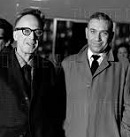
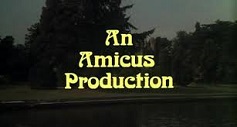
In 1962 Amicus (Lat. "friendship") Productions is founded at Shepperton Studios in England (until 1977) by Jewish-Am. horror filmmakers Milton Subotsky (1921-91) and Max J. Rosenberg (1914-2004), going on to produce low-budget portmanteau horror anthology films along with some thriller films, often getting confused with Hammer Film Productions because of use of actors Peter Cushing and Christopher Lee, although the films are set in the present day not the Gothic era; films incl. "Dr. Terror's House of Horrors" (1965), "Torture Garden" (1967), "The House That Dripped Blood" (1971), "Tales from the Crypt" (1972), "Asylum" (1972), "Vault of Horror" (1973), and "From Beyond the Grave" (1974).
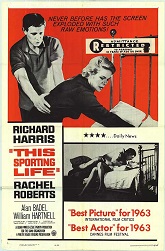
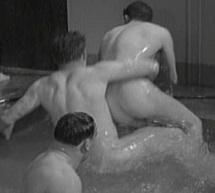

On Feb. 7, 1963 Lindsay Anderson's B&W This Sporting Life (Rank Org.) (Janus Films) debuts, a British kitchen sink realism drama based on the 1960 David Storey novel, starring Richard Harris as Wakefield, Yorkshire coal miner Frank Machin, whose aggressive brutality gets him recruited for a local rugby club by owner Gerald Weaver (Alan Badel), hooking up with widowed landlady Margaret Hammond (Harris real-life wife Rachel Roberts), who calls him "just a great ape" for his testosterone-soaked boorish misogynistic behavior; homoerotic shots of naked men playing grab-ass in the locker room gives it an R rating; makes a star of Richard Harris; the feature film dir. debut of Bangalore, British India-born Lindsay Gordon Anderson (1923-94).
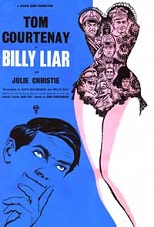

On Aug. 15, 1963 John Schlesinger's Billy Liar (Vic Films) (Waterfall Productions) (Anglo-Amalgamated Film Distributors) (Warner-Pathe) debuts, based on the 1959 Keith Waterhouse novel and Willis Hall play, starring Tom Courtney as Billy Fisher, a young British clerk in an undertaker's office, who goes off in his imagination to the kingdom of Ambrosia while hooking up with Julie Christie; the beginning of the rise of gay English Jewish dir. John Schlesinger (1926-2003), whose gay partner is Michael Childers; watch trailer.
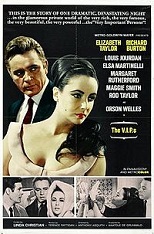
On Sept. 19, 1963 Anthony Asquith's The V.I.P.s (Hotel International) (MGM) debuts, written by Terence Rattigan (1911-77) based on the real-life story of Vivien Leigh trying to fly off with her lover Peter Finch to escape hubby Laurence Olivier, about first-class passengers sitting out the fog in Terminal 3 of London Heathrow Airport, starring new items Liz Taylor (after she gets them to dump Sophia Loren, with the soundbyte "Let Sophia stay in Rome") and Richard Burton, with Taylor playing Frances Andos, a famous actress trying to leave millionaire hubby Paul (Burton) for lover Marc Champselle (Louis Jourdan); meanwhile film producer Max Buda (Orson Welles) is trying to flee London with his babe Gloria Gritti (Elsa Martinelli) to avoid paying taxes, the Duchess of Brighton (Margaret Rutherford) is flying to Fla. to get a job to pay for her historic home, and Australian businessman Les Mangrum (Rod Taylor) is trying to get to New York City to save his business, while his secy. Miss Mead (Maggie Smith) is secretly in love with him; does $15M box office on a $4M budget - let's live up to the wide screen?

On Sept. 29, 1963 Tony Richardson's Tom Jones (Woodfall Film Productions) (United Artists) debuts, based on the 1749 Henry Fielding novel and narrated by Micheal Mac Liammoir stars Albert Finney as foundling Tom, Susannah York as Sophie Western, Hugh Griffith as her ever-drunk father Squire Western, Diane Cilento as Molly Seagrim, and George Devine as Squire Allworthy; does $37.6M box office on a $1M budget.

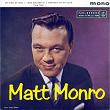
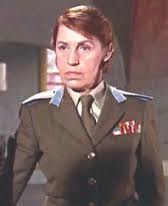
On Oct. 10, 1963 Terence Young's From Russia With Love (Eon Productions) (James Bond 007 film #2) debuts, based on the 1957 Ian Fleming novel, starring Sean Connery as James Bond 007, and Italian Miss Universe runner-up (1960) Daniela Bianchi (1942-) as Russian code room girl Tatiana Romanova, who works for SPECTRE shoe-killer Rosa Klebb, played by Vienna-born Austrian actress Lotte Lenya (1898-1981) (former wife of Kurt Weill of Threepenny Opera fame); SPECTRE wine ignoramus killing machine Donald Grant is played by Westhoughton, Lancashire-born English actor Robert Archibald Shaw (1927-78); Italian-speaking Bianchi's voice is dubbed by English Shakespearean actress Barbara Jefford (1930-), who goes on to cover for Mollie Peters in "Thunderball", and Caroline Munro in "The Spy Who Loved Me"; the From Russia with Love Theme is sung by English singer Matt Monro (Terence Edward Parsons) (1930-85); from his cool entrance at Istanbul's Yesilkoy Airport ("where the moonlight on the Bosphorus is irresistible") Connery watches a great Gypsy catfight, visits the Hagia Sofia, and ends with a satisfying cat-mouse game on the Istanbul Express, suavely sidestepping cents. of Islamic history to reduce Turkey to the scene of a British-Soviet-SPECTRE spy game; Turkish spy chief Ali Kerim Bey is played by Pedro Armendariz; "Can I borrow a match? I prefer a lighter. Better still. Until they go wrong. Exactly"; the chess game between 12-sec.-man Kronsteen (Vladek Shevbal) and McAdams (Peter Madden) is based on the SMERSH Gambit Game played by Boris Spassky and David Bronstein at the 1960 U.S.S.R. Chess Championships, which Spassky ("Kronsteen") won; introduces gadget wizard Q (Maj. Boothroyd), played by Welsh-born Desmond Wilkinson Llewelyn (1914-99); does $78.9M box office on a $2M budget; best 007 movie of all time?
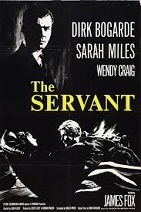
On Nov. 14, 1963 Joseph Losey's B&W The Servant (Elstree Studio Films) (Landau Org.) debuts, a new collaboration with writer Harold Pinter based on the 1948 first novel by Robin Maugham about class relationships in Britain with a gay undercurrent, starring James Fox as wealthy Londoner Tony, who hires manservant Hugo Barrett (Dirk Bogarde), who slowly gets them to reverse roles; Sarah Miles plays Hugo's babe Vera, and Wendy Craig plays Tony's babe Susan; Losey-Pinter go on to collaborate on "Accident" (1967) and "The Go-Between" (1970); watch trailer.
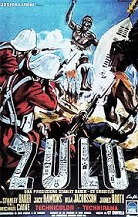
On Jan. 22, 1964 Cy Endfield's Zulu (Paramount Pictures) debuts, about the epic Jan. 22-23, 1879 Battle (Defense) of Rorke's Drift in which 3K-4K Zulus staged repeated attacks against 150 British rifles of B Co., 2/24th Regiment, South Wales Borderers, commanded by Lt. Gonville Bromhead (Michael Caine, despite his Cockney accent) defending a mission station commanded by Lt. John Rouse Merriott Chard (Stanley Baker); Richard Burton voices the epilogue listing the 11 defenders who received the Victoria Cross, making them the most-awarded British regiment in a single action to that time; "A short-chamber Boxer-Henry point forty-five caliber miracle, and a bayonet... with some guts behind it!"; does $8M box office on a $3.5M budget; watch movie.


On Jan. 29, 1964 Stanley Kubrick's B&W Dr. Strangelove, Or, How I Learned to Stop Worrying and Love the Bomb (Columbia Pictures) debuts, written by Lee Pfeiffer, Peter Sellers, Stanley Kubrick, and Terry Southern, based on the 1958 novel "Red Alert" by Peter George, and filmed in Shepperton Studios in England, about the nuclear end of the world, starring Peter Sellers as U.S. Pres. Merkin Muffley, British Group Capt. Lionel Mandrake, and Muffley's advisor, the crypto-Nazi title char. (a caricature of Edward Teller, John von Neumann, Wernher von Braun, or Herman Kahn?), complete with pocket radioactivity calculator and a black glove borrowed from Kubrick; Sterling Hayden (coming out of retirement) plays crazed U.S. Brig. Gen. Jack D. Ripper, who worries about losing his vital juices and his "purity of essence"; George C. Scott plays gum-chewing war hawk U.S. Gen. Buck Turgidson (based on Curtis LeMay), who utters the soundbyte "Mr. President, I'm not saying we wouldn't get our hair mussed, but I do say no more than 10 to 20 million killed, tops"; the film debut of James Earl Jones (1931-) (coming with Scott from "Othello") as Lt. Lothar Zogg; Keenan Wynn plays Col. Bat Guano; after Sellers sprains his ankle in a cockpit mockup, retired rodeo prof. Slim Pickens (Louis Burton Lindley Jr.) (1919-83) (brother of Easy Pickens) is called in from the set of "One-Eyed Jacks" and plays Texas cowboy Maj. T.J. King Kong, the B-52 pilot who rides a phallic nuke from the bomb bay of a B-52 Stratofortress to hot dog glory in Russia; a final scene of a pie fight in the war room is cut; "A fellow can have a pretty good time in Vegas with all that stuff" (Kong); "Mein Fuhrer, I can walk!" (Dr. Strangelove); "The Hot-Line Suspense Comedy"; does $9.4M box office on a $1.8M budget.
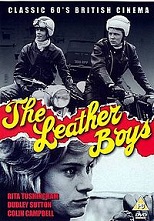
In Jan. 1964 Sidney J. Furie's B&W The Leather Boys (British Lion-Columbia) debuts, based on the 1961 Gillian Freeman (alias Eliot George) novel, a British kitchen sink realist film about a biker gang with gay member Reggie (Colin Campbell), who starts out married to Dot, played by what-a-name Rita Tushingham until he meets his real love Pete (Dudley Sutton).
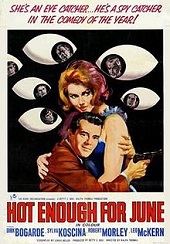
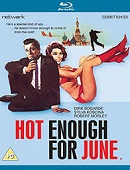
On Mar. 10, 1964 Ralph Thomas' Hot Enough for June (Agent 8-3/4) (Rank Org.) debuts, a James Bond wannabe flick based on the 1960 novel "The Night of Wenceslas" by Lionel Davidson and set in Padua, starring Dirk Bogarde as unemployed writer Nicholas Whistler, who is hired by Mi6 because he speaks Czech, and sent to Prague on a mission, where he meets beautiful Vlasta (Sylva Koscina, who lost the role of Tatiana Romanova in "From Russia with Love"), and takes on the Commie secret police, led by Simenova (Leo McKern), who turns out to be Vlasta's father; Robert Morley plays Col. Cunliffe; the art dir. is Syd Cain, who worked on the first two James Bond 007 films.

On Mar. 11, 1964 Peter Glenville's Becket (Paramount Pictures) debuts, written by Edward Anhalt based on the 1959 Jean Anouilh play "Becket, or the Honour of God" and shot at Sheeperton Studios and on location in Alnwick Castle, Bamburgh Castle, starring Richard Burton as Canterbury archbishop Thomas Becket (1118-70), whom Henry II (1133-89) (Peter O'Toole) has murdered on the altar, later claiming he didn't mean it; John Gielgud plays Louis VII, and Pamela Brown plays Eleanor of Aquitaine; does $9.1M box office on a $3M budget.

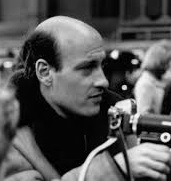
On July 6, 1964 Richard Lester's A Hard Day's Night (Aug. 11 in the U.S.) (United Artists) (title thought up by Ringo Starr) debuts, becoming the Beatles' first film and the first-ever music video, causing Philly-born film dir. Richard Lester (1932-) to become known as "Father of the Music Video"; the title song A Hard Day's Night begins with a G7 plus a ninth minus a fourth; John replies "Turn left at Greenland" to the question "How do you find America?"; Ringo replies "I'm a mocker" to the question "Are you a mod or a rocker?"; George replies "Arthur" to the question "What do you call that hairdo?"; "Steptoe and Son" star Wilfrid Brambell plays Paul McCartney's grandfather, always being called "a very clean old man" in deference to the TV show, where his son Harold always calls him "you dirty old man"; does $12.3M box office on a £189K budget; "If they get you on the floor, watch out for your brisket."

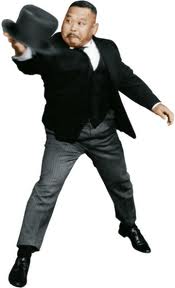

On Sept. 17, 1964 Guy Hamilton's Goldfinger (Eon Productions) (James Bond 007 film #3) debuts, starring Sean Connery as James Bond 007, Honor Blackman as Pussy Galore, Gert Frobe as Goldfinger, and Harold Sakata as his Korean asst. Oddjob with the frisbee-sword hat, plus the cool Goldfinger Theme, sung by half-black half-white Welsh singer Shirley Veronica Bassey (1937-), which is a hit, causing her to go on and sing the themes for "Moonraker" and "Diamonds Are Forever"; Bond first orders a "vodka martini - shaken, not stirred"; first use of his silver 1964 Aston Martin DB5 (1,059 produced in 1963-5), which becomes "the world's most famous car", and is purchased in 1969 for $12K by U.S. radio jock Jerry Lee; the subliminal suggestions of naked women in gold paint plus the clever use of the double entendres finger, oddjob, shaken not stirred, and 007 (as in inches) sells big tickets, doing $124.9M box office on a $3M budget; "What's your name?" (Connery); "Pussy Galore" (Blackman); "I must be dreaming" (Connery).
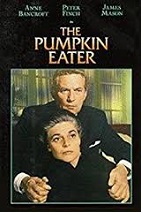
On Nov. 9, 1964 Jack Clayton's B&W The Pumpkin Eater (Romulus Films) (Columbia Pictures) debuts, written by Harold Pinter based on the 1962 Penelope Ruth Mortimer novel, starring Anne Bancroft as thrice-married prodigiously fertile neurotic Jo Armitage, and Peter Finch as her well-paid screenwriter hubby Jake Armitage, who puts her in a pumpkin shell while they fuck like rabbits, causing her to get pregnant again, after which he makes her have an abortion and sterilization, after which she has a mental breakdown in Harrods; after discovering him being unfaithful, she ends up asking him "Why did you marry me?"; James Mason plays her 2nd hubby Bob Conway; "A cowlike creature with no aspirations or intellect above her pelvis" (Judith Crist); does $1.2M box office; watch trailer.
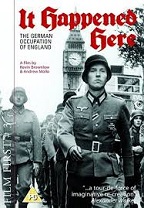
In 1964 Kevin Brownlow's and Andrew Mollo's It Happened Here (B&W) debuts, an alt. history of the U.K. after it is occupied by the Nazis; stars Pauline Murray as Irish nurse Pauline and a large number of amateur extras incl. ex-British Union of Fascists members and ex-Nazi SS and Wehrmacht soldiers; pisses-off critics by portraying Brits as easy recruits to Fascism; "The story of Hitler's England"; "The German invasion of Britain took place in 1940 after the retreat from Dunkirk"; watch movie.
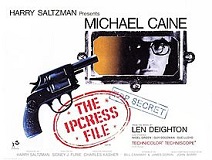
On Mar. 18, 1965 Sidney J. Furie's The Ipcress File (Lowndes Productions) debuts, based on the 1962 hit Len Deighton novel, starring Michael Caine as ex-sgt. Harry Palmer, whose boss Maj. Dalby (Nigel Green) sends him on a mission to investigate the brainwashing of scientists, later figuring out that he was + selected because he has a criminal past and is expendable; the first film from Lowndes Productions, founded in 1958 by Harry Saltzman, followed by "Funeral in Berlin" (1966) and "Billion Dollar Brain" (1967); it dissolves in 1992.
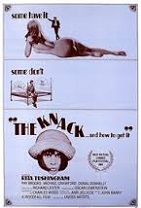
On June 3, 1965 Richard Lester's B&W The Knack... and How to Get It (Woodfall Film Productions) (United Artists) debuts, based on the Ann Jelicoe play, a comedy about roommates Tolen (Ray Brooks), Colin (Michael Crawford), and Tom (Donal Donnelly), who vie for the sexual favors of out-of-town visitor Nancy (Rita Tushingham); made by Lester between A Hard Day's Night and Help!, causing him to add oddball editing sequences and a Greek chorus of "the older generation"; film debuts of Jane Birkin, Jacqueline Bisset, Alan Haven, and Charlotte Rampling, along with "Top of the Pops" girl Samantha Juste; does $2.5M box office on a $364K budget; watch trailer.
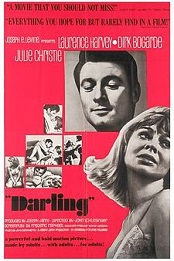
On July 15, 1965 John Schlesinger's B&W Darling (Anglo-Amalgamated) debuts, starring Julie Francis Christie (1940-) (after Shirley MacLaine declines) as beautiful bored amoral married model ("swinging 60s British bird") Diana Scott, who leaves hubby Tony Bridges (Trevor Bowen) for dir. Robert Gold (Dirk Bogarde), ad exec Miles Brand (Laurence Harvey), gay photographer Malcolm (Roland Curram), and Italian Prince Cesare (Jose Luis de Vilallonga); becomes an internat. hit, and Christie wins a best actress Oscar, causing Life mag. to label 1965 "The Year of Julie Christie"; does $4M box office on a $1.1M budget; watch trailer.


On July 29, 1965 Richard Lester's Help! (United Artists) (original title "Eight Arms to Hold You") debuts, becoming the Beatles' 2nd film, about an Arab cult chasing the Fab Four in order to acquire Ringo's ruby ring; the Beatles ride skibobs to the song "Ticket to Ride"; the closing credits thank the inventor of the sewing machine; Elizabeth II attends the debut; the film score was composed by the Beatles along with English film composer Kenneth "Ken" Thorne (1924-2014); does $12M box office; watch trailer.
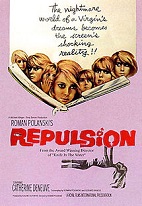
On Oct. 3, 1965 Roman Polanski's B&W Repulsion (Compton Films) (Royal Films Internat.) debuts, a horror film starring Catherine Deneuve as Belgian manicurist Carole Ledoux, who is left alone at her vacationing sister's apt. in Kensington, London, and is obsessed with fantasies of being seduced and/or raped, murdering any man who tries it; #1 in Polanski's Apartment Trilogy, incl. "Rosemary's Baby" (1968) and "The Tenant" (1976); does $3.1M box office on a £65K budget; watch movie.
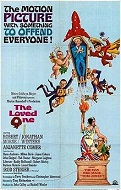
On Oct. 11, 1965 Tony Richardson's B&W The Loved One (MGM) debuts, a satire of the U.S. funeral parlor biz based on the 1948 Evelyn Waugh novel, starring Robert Morse as young aspiring British poet David Barlow (Robert Morse), who goes to work at the kooky Whispering Glades Cemetery in Hollywood with Rev. Wilbur Glenworthy (Jonathan Winters), his uncle Sir Francis Hinsley (John Gielgud), embalmer Mr. Joyboy (Rod Steiger), and coffin salesman Mr. Starker (Liberace); also features James Coburn, Milton Berle, Robert Morley, John Gielgud, Roddy McDowall, and Tab Hunter; "The motion picture with something to offend everyone"; watch clip.
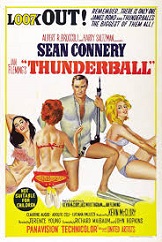
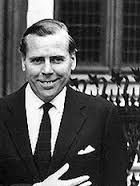
On Dec. 9, 1965 Terence Young's Thunderball (Eon Productions) (James Bond 007 film #4) debuts, produced after a legal hassle by Irish "Longitude 78 West" screenwriter Kevin O'Donovan McClory (1924-2006), sending him to the Bahamas to recover two nuclear warheads stolen by SPECTRE agent Emilio Largo (Adolfo Celi); stars Claudine Auger (after Julie Christie proves unsuitable, and Raquel Welch is committed to "Fantastic Voyage") as Bond girl Dominique "Domino" Derval, who likes to wear checkerboard clothing; the Thunderball Theme (original title "Mr. Kiss Kiss, Bang Bang") is sung by Tom Jones, who faints while singing the song's long final note; the Breitling SA Top Time wristwatch worn by Connery is auctioned by Christie's on June 26, 2011 for over £100K; earns $141.2M box office worldwide on a $9M budget, becoming the most successful 007 film (until ?); watch trailer.
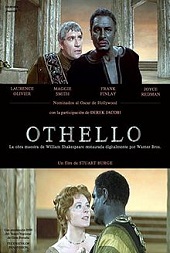
On Dec. 15, 1965 Stuart Burge's Othello (Eagle-Lion Films) (Warner Bros.) debuts, based on the Shakespeare play, staged by John Dexter, starring Laurence Olivier (in blackface) as Othello, Maggie Smith as Desdemona, Frank Finlay as Iago, Joyce Redman as Emilia (who all receive Oscar nominations), Derek Jacobi (film debut) as Cassio, and Michael Gambon (film debut) as Senators-soldiers-Cypriots; watch clip.
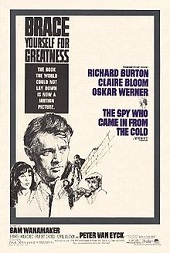
On Dec. 16, 1965 Martin Ritt's The Spy Who Came in from the Cold (Salem Films) (Paramount Pictures) debuts, based on the 1963 John le Carre novel, starring Richard Burton as West Berlin British agent Alec Leamas, who goes on one last mission before you know what from the Cold War; features Claire Bloom as his Communist girlfriend Nan Perry, and Oskar Werner as his interrogator Fiedler; does $7.6M box office; "Brace yourself for greatness".

On Dec. 22, 1965 David Lean's Doctor Zhivago (MGM) debuts, based on the 1957 Boris Pasternak novel, starring Omar Sharif as Russian physician-poet-intellectual Yuri Andreyevich Zhivago, caught up in the Bolshevik Rev. with lover Lara Antipova (Julie Christie), making the song Lara's Theme (Somewhere My Love) by Maurice-Alexis Jarre (1924-2009) a hit; Alec Guinness plays Sharif's mysterious brother Lt. Gen. Yevgraf Andreyevich Zhivago; does $111.7M box office on an $11M budget.

In 1965 British film critic Leslie Halliwell (1929-89) pub. The Filmgoer's Companion, the first 1-vol. encyclopedia of cinema, which rates films 0-4, going with "Citizen Kane" (1941) as #1 of all time, followed by "Trouble in Paradise" (1932), "The Bride of Frankenstein" (1935), and "Le Million" (1931); in 1977 he follows with Halliwell's Film Guide, which becomes a std. reference.

On Mar. 24, 1966 Lewis Gilbert's Alfie (Paramount Pictures) debuts, based on the 1963 Bill Naughton play, starring Rotherhithe, London-born Sir Michael Caine (Maurice Joseph Mickelwhite) (1933-) as British Cockney nowhere man playboy chaffeur Alfie Elkins in mod London to the hit Alfie Theme ("What's it all about, Alfie?"), sung Dionne Warwick, making Caine an internat. star; he got the part after his roommate Terence Stamp turned it down; first film to receive the PG rating from the Motion Picture Assoc. of Am.; "What's it all about? You know what I mean."
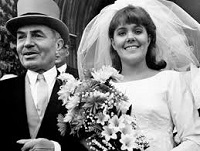
On Oct. 17, 1966 Silvio Narizzano's Georgy Girl (Columbia Pictures) debuts, based on the 1965 Margaret Forster novel, starring Lynn Redgrave (1943-2010) (sister of Vanessa Redgrave, and aunt of Joely Richardson and Natasha Richardson) as overweight virginal 22-y.-o. frump with a heart of gold Georgina Parkin in Swinging London, who raises Sara, the baby of promiscuous roommate Meredith (Charlotte Rampling), and must care for her irresponsible flirting father Jos Jones (Alan Bates) while dodging the amorous attentions of his boss James Leamington (James Mason); does $16.9M box office on a $400K budget; the title song Georgy Girl (written by Jim Dale and Tom Springfield) (#2 in the U.S.) (#3 in the U.K.) (3.5M copies) by the Australian group The Seekers is a big hit; "Who needs a perfect lover when you're a mother at heart... Better try to tell yourself that you've got your way...now you've got a future planned for you...at least he's a millionaire...you're rich, Georgy Girl."
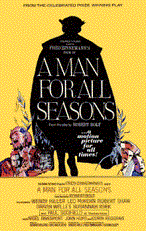
On Dec. 12, 1966 Fred Zinnemann's A Man for All Seasons (Columbia Pictures) debuts, based on the 1954 Robert Bolt play, starring Paul Scofield as Sir Thomas More, and Robert Shaw as Henry VIII, who tries to force him to acknowledge his annulment to Catherine of Aragon and his self-elevation to English pope; Orson Welles plays Cardinal Wolsey; Leo McKern plays Thomas Cromwell; Nigel Davenport plays the duke of Norfolk; John Hurt plays Sir Richard Rich; does $28.4M box office on a $2M budget; "God made the angels to show Him splendor, as He made animals for innocence and plants for their simplicity. But Man He made to serve Him wittily, in the tangle of his mind"; "Thomas More's head was stuck on Traitors' Gate for a month, then his daughter, Margaret, removed it and kept it till her death. Cromwell was beheaded for high treason five years after More. The archbishop was burned at the stake. The Duke of Norfolk should have been executed for high treason, but the king died of syphilis the night before. Richard Rich became chancellor of England and died in his bed."

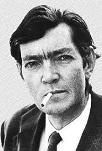
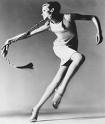
On Dec. 18, 1966 Michelangelo Antonioni's Blow-Up (Blowup) (MGM), based on the 1959 story "The Droolings of the Devil" by Argentine novelist Julio Cortazar (Cortázar) (1914-84), about mod London photographer David Royston Bailey (1938-) and featuring a score by Herbie Hancock stars Vanessa Redgrave as fashion model Jane, and David Hemmings as Thomas, a photographer who takes photos of a couple in Marylon Park in Charlton, SE London, and then does you know what to it to prove it's evidence of murder, raising the issue of photography as voyeurism; does $20M box office on a $1.8M budget, helping to "liberate Hollywood from its puritanical prurience" (Richard Corliss) after the film's success causes the MPAA Production Code to be revised; features a performance of Stroll On by the Yardbirds (after Eric Burdon turns it down and The Who are dropped), and a 5-min. photoshoot of leggy German Ford Modeling Agency supermodel Veruschka von Lehndorff (1939-) - how many paid for a ticket thinking they were going to see a beejay?
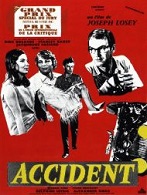
In Feb. 1967 Joseph Losey's Accident (London Independent Producers) debuts, co-written by Harold Pinter based on the 1965 Nicholas Mosley novel, starring Dirk Bogarde as an Oxford don who tutors rich William (Michael York) and beautiful Austrian girl Anna (Jacqueline Sassard) in uptight British society, getting the hots for her along with his colleague Charlie (Stanley Baker) and getting lucky only after she has a you know what; watch movie.
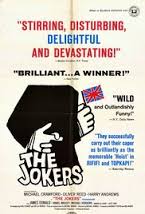
On May 15, 1967 Michael Winner's The Jokers (Rank Org.) (Universal Pictures) debuts, a comedy starrring Michael Crawford and Oliver Reed as brothers Michael and David Tremayne in Swinging London, who plot to steal the Crown Jewels from the Tower of London then give them back as a you know what.
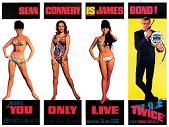
On June 12, 1967 Lewis Gilbert's You Only Live Twice (Eon Productions) debuts (James Bond 007 film #5), written by Roald Dahl based on the 1964 Ian Fleming novel, about a spacecraft-hijacking facility in the Sea of Japan run by Osata Chemicals that attempts to sucker the U.S. and U.S.S.R. into nuclear war; #6 grossing film of 1967 ($43.1M domestic and $68.5M foreign on a $10.3M budget); co-stars English actor ("the man with the hypnotic eye") Donald Henry Pleasence (1919-95) as SPECTRE head Ernst Stavro Blofeld, 6'8" English actor Ronald Rich as Blofield's tall blonde muscular tasty henchman, Tetsuro Tamba (1922-2006) as Japanese secret service head Tiger Tanaka, Teru Shimada (1905-88) as sinister SPECTRE front industrialist Mr. Osato, German actress Karin Dor (1938-) as his sinister secy. Helga Brandt, Akiko Wakabayashi (1941-) as Bond girl Aki, and Mie Hama (1943-) as Bond girl Kissy Suzuki, who utters the soundbyte "I like Connery. I don't like James Bond. Bond is always a playboy with many playgirls. Connery is a warm heart"; the You Only Live Twice Theme is sung by Nancy Sinatra; Mt. Shinmoe in the Kirishima range between Miyazaki and Kagoshima prefectures is featured, later erupting in Jan. 2011.
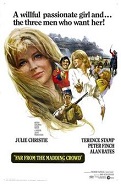
On Oct. 16, 1967 John Schlesinger's Far from the Madding Crowd (MGM) debuts, based on the 1874 Thomas Hardy novel, starring Julie Christie as Bathsheba Everdene in Wessex, SW England, who hooks up with lonely neighbor William Boldwood (Peter Finch), faithful shepherd Gabriel Oak (Alan Bates), and thriftless cavalry Sgt. Francis "Frank" Troy (Terence Stamp); score by Richard Rodney Bennett is nominated for an Oscar; does $3.5M box office on a $2.75M budget.
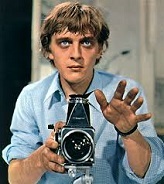
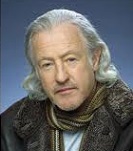
In 1967 Helmdale Film Corp. is founded in London, England by actor David Edward Leslie Hemmings (1941-2003) (who sells-out in 1971) and his mgr. John Daly (1937-2008) as a tax haven for British actors, going on to found a talent agency that launches the careers of Black Sabbath and Yes, distributes cable TV to hotels, and finances the stage production of "Grease" (1971) and "The Rumble in the Jungle" Ali-Foreman boxing match (Oct. 30, 1974), relocating to Hollywood in 1980 and producing genre films starting with ""Cattle Annie and Little Britches" (1981), "Strange Behavior" (1981), "Yellowbeard" (1983), "Escape from the Bronx" (1983), "Treasure of the Yankee Zephyr" (1984), "A Breed Apart" (1984), "Irreconcilable Differences" (1984), "The Terminator" (1984), "Special Effects" (1984), "Perfect Strangers" (1984), "The Falcon and the Snowman" (1985), "A Killing Affair" (1986), "The Return of the Living Dead" 91985), "Howling II" (1986), "At Close Range" (1986), "Salvador" (1986), "Inside Out" (1986), "Hoosiers" (1986), "Body Slam" (198), "Defense of the Realm" (1986), "Platoon" (1986), "River's Edge" (1987), "Made in U.S.A." (1987), "My Little Girl" (1987), "Burke & Wills" (1987), "The Whistle Blower" (1987), "High Tide" (1987), "Love at Stake" (1987), "Hotel Colonial" (1987), "Best Seller" (1987), "The Last Emperor" (1988), "Little Nemo" (1992) et al., changing their name in 1993 to Hemdale Communications, and concluding with "Grizzly Mountain" (1995).

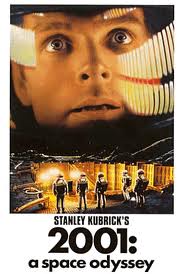

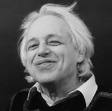
On Apr. 2, 1968 Stanley Kubrick's classical music-heavy landmark A-list sci-fi film 2001: A Space Odyssey (MGM), based on Arthur C. Clarke's story "The Sentinel" debuts, with a cool score by Romanian-born Austrian-Hungarian Jewish composer Gyorgy Ligeti (1923-2006), starring white dull-enough-but-kinky-inside Keir Dullea as a space Ulysses, with its depiction of space travel as commercialized and matter-of-fact (Pan Am Orion between Earth and Moon), and its depiction of the AI talking computer HAL (I-1 B-1 M-1), who throws a hissy fit over Jupiter, which just happens to be the home of the aliens who evolved us from apes, and gave us a test to qualify for the next evolutionary jump; #2 grossing film of 1968 ($56.7M U.S. and $138M worldwide on a $12M udget) #2 grossing film of 1968 ($56.7M U.S. and $138M worldwide on a $12M budget); the soundtrack features The Blue Danube, plus Ligeti's Atmospheres (1961), Lux Aeterna (1966) (moonbus scene), Requiem (Kyrie) (1963-5), and Aventures (1962); his 1967 piece Lontano is used in the 1980 film "The Shining" - the real thrill is the thought that white flight can look to space?

In Apr. 1968 David Miller's Hammerhead (Columbia Pictures) debuts, based on the 1964 novel by English novelist James Mayo (personal friend of Ian Fleming), starring Vince Edwards as art-loving James Bond clone Charles Hood, who goes to Portugal to take on the criminal mastemind Hammerhead (Peter Vaughan) to stop him from stealing NATO nuclear secrets; Beverly Adams and Diana Dors play Hood's mistresses Ivory and Kit; Michael Bates plays NATO delegate Sir Richard Calvert; watch clip.
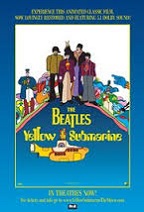
On July 17, 1968 George Dunning's Yellow Submarine (Apple Films) (King Features Syndicate) (United Artists) debuts, featuring music by the Beatles, becoming the first full-length British animated feature in 14 years; the Fab Four accompany Capt. Fred in his you know what to battle the Blue Meanies in Pepperland for the sake of Sgt. Pepper, the Nowhere Man, and Strawberry Fields, the Sea of Time, the Sea of Science, the Sea of Monsters, the Sea of Nothing, the Sea of Holes, and the Foothills of the Headlands; voices; John: John Clive, Paul: Geoff Hughes, George: Peter Batten, Ringo: Paul Angelis (who also does Blue Meanie).
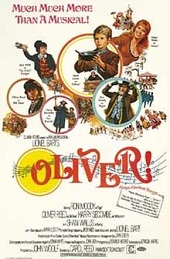
On Sept. 26, 1968 Sir Carol Reed's Oliver! (Columbia Pictures) debuts, based on the 1839 Charles Dickens novel "Oliver Twist", with music by Lionel Bart, stariring Mark Lester as Oliver, Ron Moody as Fagin, and Jack Wild as the Artful Dodger; features the songs "Food, Glorious Food", "Consider Yourself", "As Long As He Needs Me", "You've Got to Pick a Pocket or Two", "Oom-Pah-Pah", and "Where Is Love?"; wins six Oscars; does $77.4M box office on a $10M budget.
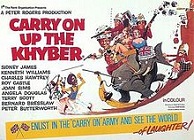
In Sept. 1968 Gerald Thomas' Carry On Up the Khyber (Khyber Pass as in Ass) (Rank Org.) debuts, a spoof of Rudyard Kipling films starring the usual cast, with Roy Castle taking Jim Dale's part as the romantic male lead.

On Oct. 30, 1968 Anthony Harvey's The Lion in Winter (AVCO Embassy Pictures) debuts, based on James Goldman's play with a score by John Barry, starring Peter O'Toole as Henry II (1133-89), and Katharine Hepburn as his wife Eleanor of Aquitaine (1122-1204) duking it out in a castle in Christmas, 1183; the film debut of Welsh actor Anthony Philip Hopkins (1937-) as their son Richard I Lionheart; Bristol-born Nigel Terry (1945-2015) (film debut) plays their other son John; the film debut of Welsh actor Timothy Dalton (1946-) as scheming 18-y.-o. French king Philip II Augustus (1165-1223); Hopkins is thrown from a horse and breaks his arm, halting production for three weeks; Hepburn dazzles women with women's libber lines incl. "I rode bare-breasted halfway to Damascus. I damn near died of wind burn, but the troops were dazzled", and "I'd hang you from the nipples, but you'd shock the children"; does $22.3M box office on a $4M budget; watch clip.

On Dec. 19, 1968 Lindsay Anderson's if.... (Paramount Pictures) debuts, satirizing English public school life, becoming famous for its depiction of an armed revolt that gets mileage from the May 1968 Paris student riots, earning an X rating; the film debut of Horsforth, West Riding of Yorkshire-born Malcolm McDowell (Malcolm John Taylor) (1943-) as Michael Arnold "Mick" Travis; "There is no such thing as a wrong war - violence and revolution are the only pure acts"; first in the Mick Travis Trilogy, incl. "O Lucky Man!" (1973) and "Britannia Hospital" (1982); watch movie.
In 1968 after public reaction against prosectuion of the Edward Bond play "Saved" and John Osborne's play "A Patriot for Me", the Theatres Act of 1968 is passed by the British Parliament, abolishing the 1737 Licensing Act along with censorship of the stage.
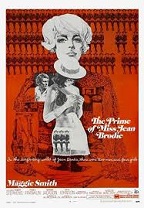
On Feb. 24, 1969 Ronald Neame's The Prime of Miss Jean Brodie (20th Cent. Fox) debuts, based on the 1961 Muriel Sparks novel, starring Maggie Smith as a freethinking tenured teacher in the Marcia Blaine School for Edinburgh in the 1930s who toys with fascism, and dotes on the Brodie Set incl. Sandy (Pamela Franklin), Monica (Shirley Steedman), Jenny (Diane Grayson), and Mary (Jane Carr) while pissing-off headmistress Emmeline Mackay (Celia Johnson); the theme song Jean by Rod McKuen is a hit, and is also used in the 1969 film "Oliver"; "Little girls, I am in the business of putting old heads on young shoulders, and all my pupils are the crème de la crème. Give me a girl at an impressionable age, and she is mine for life"; watch movie.
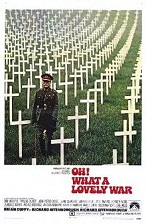
On Mar. 10, 1969 Richard Attenborough's Oh! What a Lovely War (Paramount Pictures) debuts,, produced and written by Len Deighton based on the 1961 radio play "The Long Long Trail" by Charles Chilton, becoming Attenborough's dir. debut, revisiting WWI via popular songs of the day via the Smith family at the West Pier in Brighton (after the Beatles try and fail to get the parts), with red poppies used to depict impending death; Vanessa Redgrave plays Sylvia Pankhurst; Ian Holm plays French pres. Poincare; Kenneth More plays Kaiser Wilhelm II; Laurence Olivier plays Gen. Sir John French; John Mills plays Gen. Sir John Haig; Maggie Smith plays a music hall star; view movie finale.
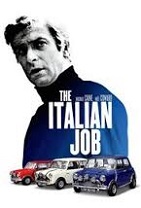
On June 2, 1969 Peter Collinson's The Italian Job (Paramount Pictures) debuts, starring Michael Caine as mobster Charlie Croker, and Noel Coward as Mr. Bridger, who plans a $4M gold heist in 1968 Turin using computer programmer Prof. Peach (Benny Hill), who can change the color of traffic lights so that the robbers can make their getaway in absurdly overloaded front wheel drive British Minis (which are always having trouble with their differentials?), easily outrunning police Alfa Romeos in the traffic jam; Caine utters the soundbyte "You're only supposed to blow the bloody doors off!"; soundtrack by Quincy Jones incl. "Getta Bloomin' Move On (The Self-Preservation Society)" and "On Days Like These"; remade in 2003.
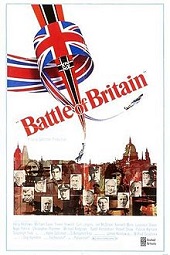
On Sept. 15, 1969 Guy Hamilton's Battle of Britain (Sept. 15) (United Artists) debuts, based on the book "The Narrow Margin" by Derek Wood and Derek Dempster about the defeat of 1940 Nazi Operation Sea Lion, starring a list of top British actors incl. Michael Caine, Laurence Olivier, Trevor Howard, Robert Shaw, Michael Redgrave, Ralph Richardson, Susannah York, and Christopher Plummer, who are all eager to look like RAF heroes in expensive spectacular flying sequences, making for a $14M budget; watch trailer.
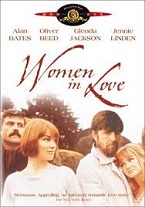
In Sept. 1969 Ken Russell's Women in Love (United Artists) debuts, based on the 1920 D.H. Lawrence novel about the British elite of 1920 in the mining town of Beldover, Midlands, starring Alan Bates as school inspector Rupert Birkin, Oliver Reed as wealthy mine owner's son Gerald Crich, Glenda Jackson as artist Gudrun Brangwen, and Lennie Linden as school teacher Ursula Brangwen; Master, er, Sir Bates and Reed have a gay nude wrestling scene a la the ancient Greeks (Japanese?); Jackson becomes the first to win a best actress Oscar for a role with a nude scene; one of the first major studio films with frontal nudity; does $1.2M U.S./Canada and $4.5M worldwide on a $1.6M budget - what's in your wallet?
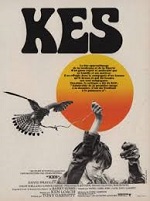
On Nov. 14, 1969 Ken Loach's Kes (Woodfall Film Productions) (United Artists) debuts, produced by Tony Garnett, based on the 1968 novel "A Kestrel for a Knave" by Barry Hines, starring David Bradley as bullied teenie Billy Casper, who raises a kestrel and comes to grief; watch movie.
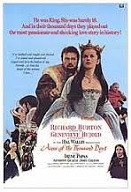
On Dec. 18, 1969 Charles Jarrott's Anne of the Thousand Days (Universal Pictures) debuts, based on the 1948 Maxwell Anderson play, starring Richard Burton as Henry VIII, Genevieve Bujold (first appearance in an English-speaking film) as Anne Boleyn (stealing the show?), miscast Irene Papas as Catherine of Aragon, Anthony Quayle as Cardinal Thomas Wolsey, and William Squire as Sir Thomas More; watch movie.
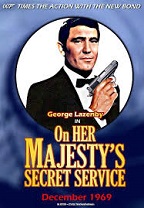
On Dec. 18, 1969 Peter R. Hunt's On Her Majesty's Secret Service (Eon Productions) (United Artists) (James Bond 007 film #6) debuts, based on the 1963 Ian Fleming novel, shocking millions by swapping unknown English-ski-instructor-looking model (really an Australian auto mechanic who punched the stunt coordinator during an audition, impressing Albert R. "Cubby" Broccoli) George Robert Lazenby (1939-) for rugged handsome everyone-knows-he's-Scottish Sean Connery, who quit after five films, fearing becoming typecast, after which Timothy Dalton turns it down believing he's too young for the role, and Roger Moore is unable to leave the TV show "The Saint"; Diana Rigg stars as the love interest Countess Tracy di Vicenzo, who gets the ring on her finger long enough to croak; Telly Savalas plays bad guy Ernst Blofeld, head of SPECTRE, who tries to blackmail the world to get amnesty for his crimes and be recognized as Comte Balthazar de Bleuchamp; Louis Armstrong sings "We Have All the Time in the World"; does $82M box office on a $7M budget; too bad, Lazenby's agent Ronan O'Rahilly convinces him to walk out of a 7-movie contract because 007 was becoming archaic in the liberated 1970s, which works out well when critics pan his performance, causing any failed acting replacement to become known as "the George Lazenby of"; watch trailer.
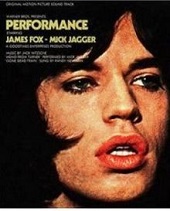
On Aug. 3, 1970 Donald Cammell's and Nicolas Roeg's Performance (Goodtimes Enterprises) (Warner Bros.) debuts, starring James Fox as Chas, a member of an East London gang led by Harry Flowers (Johnny Shannon), who hides out in the London house of Turner (Mick Jagger in his film debut), a reclusive former rock star who lives in a bisexual menage a trois with Pherbert (Anita Pallenberg) and Lucy (Michele Breton), ending up shooting him; "Vice. And Versa"; its dark sex, drug use, and violence gets its debut delayed two years; Cammell ends up committing suicide by shotgun; watch clip.
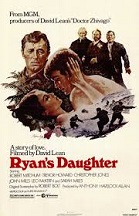
On Nov. 9, 1970 David Lean's Ryan's Daughter (MGM) debuts, loosely based on Gustave Flaubert's 1856 novel "Madame Bovary", set in 1916, starring Sarah Miles as Rosy Ryan Shaughnessy, who is in love with schoolmaster Charles Shaughnessy (Robert Mitchum, after first pick Paul Scofield has other commitments, and Gregory Peck lobbies for it in vain), then secretly hooks up with newly-arrived PTSD-suffering English officer Maj. Randolph Doryan (Christopher Jones, after first pick Marlon Brando has other commitments), who works with her secret traitor pub owner father Tom (Leo McKern) in Kirrary, County Kerry, Ireland, who tips him off about some gun-running by the IRA, allowing him to ambush them, getting her labeled as a traitor when the affair is discovered, after which she takes the rap to protect her daddy; Trevor Howard (after Alec Guinness) plays Father Hugh Collins; John Mills plays village idiot Michael; does $30.8M box office on a $13.3M budget; too bad, scathing criticism by film critics Pauline Kael, Roger Ebert, and Richard Schickel causes Lean to quit making films for the next 14 years, although it is later considered a classic; watch trailer.
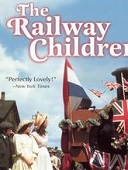
On Dec. 21, 1970 Lionel Jeffries' The Railway Children (EMI Elstree) (MGM-EMI) (Universal Pictures) debuts, based on the 1906 children's novel by Edith Nesbit, starring Dinah Sheridan as Mrs. Waterbury, mother of the Waterbury children incl. Roberta "Bobbie" (Jenny Agutter), Phyllis (Sally Thomsett), and Peter (Gary Warren), who are forced to move from their luxurious Edwardian villa in London to the cruddy Three Chimneys house in Yorkshire near the Great Northern and Southern Railway after the father (Ian Cuthbertson) is wrongly imprisoned for selling secrets to the Russians, going on to rescue Russian dissident Mr. Szczepansky (Gordon Whiting) and others while trying to prove daddy's innocence; watch movie.

On Feb. 4, 1971 Peter Brook's B&W King Lear debuts, produced by Michael Berkett and Mogens Skot-Hansen and based on the Shakespeare play, starring Paul Scofield as Lear, Jack MacGowran as the Fool, Susan Engel as Regan, Irene Worth as Goneril, Anne-Lise Gabold as Cordelia, Patrick Magee as Cornwall, and Tom Fleming as Kent; watch trailer.
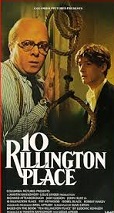
On Feb. 10, 1971 Richard O. Fleischer's 10 Rillington Place (Filmways) (Columbia Pictures) debuts, based on the book by Ludovic Kennedy about English serial killer John Reginald Hilliday Christie (1899-1953) (Richard Attenborough), showing how he conned mentally deficient Timothy John Evans (John Hurt) into taking his rap and getting away with a double murder, until he commits more and doesn't dispose of four bodies (incl. his wife Ethel) well enough and they are discovered hidden in his flat at 10 you know what in Notting Hill, London.
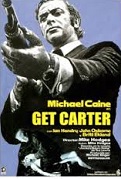
On Mar. 10, 1971 Mike Hodges' Get Carter (MGM) debuts, co-produced by Michael Caine, a crime thriller based on the 1969 Ted Lewis novel "Jack's Return Home", starring Michael Caine as London gangster Jack Carter, whose brother Frank is killed by gangsters, causing him to travel to Newcastle to investigate and get even, ending up being targeted; Ian Hendry plays chauffeur Eric Paice, Britt Eckland plays moll Anna, John Osborne plays Jack's adversary Cyril Kinnear, and Bryan Mosley plays amusement park owner Cliff Brumby; a box office flop, it goes on to develop a cult following; last film made at Borehamwood Studios.
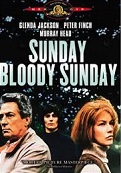
On July 1, 1971 John Schlesinger's Sunday Bloody Sunday (United Artists) debuts, written by Penelope Gilliatt, starring Peter Finch as wealthy gay Jewish physician Daniel Hirsh, Glenda Jackson as divorced working woman Alex Greville, and Murray Head as young gay artist Bob Elkin, who services both of them separately until an offer to open his own art gallery in New York and a wet winter weekend in London causes them to bump into each other; released before the real Bloody Sunday in Northern Ireland on Jan. 30, 1972; depicts gays as successful and well-adjusted, as contrasted with his 1969 film "Midnight Cowboy", which portrays them as self-loathing?
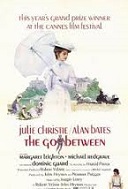
On Sept. 24, 1971 Joseph Losey's The Go-Between (MGM-EMI) (Columbia Pictures) debuts, co-written by Harold Pinter based on the 1953 L.P. Hartley novel, starring Dominic Guard as young Leo Colston in 1900, who spends the summer at the Norfolk country house of his friend Marcus Maudsley (Richard Gibson), acting as you know what with his beautiful sister Marion Maudsley (Julie Christie) and farmer neighbor Ted Burgess (Alan Bates), who commits suicide after their secret illicit affair is found out; 50 years later Leo (Michael Redgrave) meets Marion again; watch movie.

On Oct. 13, 1971 Roman Polanski's Macbeth (Playboy Productions) (Columbia Pictures) debuts, based on the Shakespeare play, starring Jon Finch as Macbeth, Francesca Annis as Lady Macbeth, Martin Shaw as Banquo, and Terence Bayler as Macduff; financed by Hugh Hefner, resulting in a nude sleepwalking scene for Lady Macbeth; watch trailer.

On Dec. 14, 1971 Guy Hamilton's Diamonds Are Forever (Eon Productions) debuts (James Bond 007 film #7), based on the 1956 Ian Fleming novel, starring Sean Connery, who returns to the James Bond role he once dumped for a $1M salary (after Adam West turns Cubby Broccoli down, citing the George Lazenby disaster?), and co-stars hi-IQ bikini babe Jill St. John as Tiffany Case, who galavants with him around Las Vegas in a tricked-out 1971 Mach 1 while trying to stop Ernst Stavro Blofield (Charles Gray) (who killed Bond's wife) from building a laser satellite; Bruce Glover and Putter Smith play over-the-top Mr. Wint and Mr. Kidd of the Spangled Mob; Jimmy Dean finds a role that isn't too corny to kill the Bond coolness, spending most of his time locked up; the Diamonds Are Forever Theme is sung by Shirley Bassey; too bad, this film starts the string of humorous tongue-in-cheek 007 flicks; #3 grossing film of 1971 ($43.8M box office U.S. and $116M worldwide on a $7.2M budget); last appearance of SPECTRE until 2015; future U.S. ambassador to Mexico (1981-6) John Gavin (John Anthony Golenor Pablos) (1931-) originally signed to play 007 after George Lazenby left, and is also signed for the 1973 film "Live and Let Die", but is dumped for Roger Moore; watch trailer.

On Dec. 19, 1971 Stanley Kubrick's A Clockwork Orange (Hawk Films) debuts, based on the 1962 Anthony Burgess novel, starring Malcolm MacDowell as Alex DeLarge, leader of a punk gang of droogs in future (1995?) Britain who speak Nadsat (a mix of English and Russian), hang out in the Korova Moloko (Milk) Bar (filled with erotic sculptures by Allen Jones), and invade the home of writer Frank Alexander (incredibly face-overacting Patrick Magee) and rape his wife Adrienne Corri while performing "Singin' in the Rain"; after receiving the Ludovico brainwashing treatment from the govt. and dreaming of shagging a woman in the snow, Alex (who lies to wear false eyelashes in his right eye) gets his mind right and goes normal, but it backfires when he stumbles back into Mr. Alexander's home and is tortured with Beethoven's Ninth then tries to commit suicide, after which the publicity brings the govt. down and causes them to unbrainwash him and give him a job; #7 grossing film of 1972 ($26.5M box office on a $2.2M budget); "I believe that drugs are basically of more use to the audience than to the artist." (Kubrick)
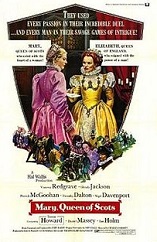
In Dec. 1971 Charles Jarrott's Mary, Queen of Scots (Universal Pictures) debuts, written by John Hale and produced by Hal B. Wallis, starring Vanessa Redgrave as Mary, Queen of Scots, Glenda Jackson as her rival Elizabeth I, Patrick McGoohan as Mary's half-brother James Stewart, 1st Earl of Moray, Timothy Dalton as Mary's 2nd husband Henry Stuart, Lord Darnley, Nigel Davenport as Mary's 3rd husband James Hepburn, 4th Earl of Bothwell, Ian Holm as Mary's advisor David Rizzio, and Trevor Howard as Elizabeth's advisor Sir William Cecil; too bad, it has a soap opera plot?
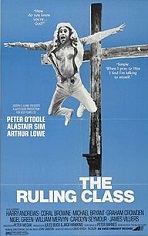
On Sept. 13, 1972 Peter Medak's The Ruling Class (Embassy Pictures) (United Artists) debuts, produced by Jules Buck based on the 1968 Peter Barnes play, starring Peter O'Toole as insane Jack Arnold Tancred Gurney, 14th Earl of Gurney, who starts out believing that he is Jesus Christ and gives up belief in God to become Jack the Ripper, going on a killing spree while assuming his place in the House of Lords and giving a speech in favor of capital punishment; Graham Crowden plays court-appointed pshrink Dr. Truscott, who declares him sane because he's a fellow Etonian; Alistair Sim plays Bishp Lampton; Arthur Lowe plays Tusk the butler; a flop, it goes on to gain a cult following; "A comedy with tragic relief." (O'Toole); watch movie.
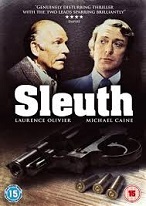
On Dec. 10, 1972 Joseph L. Mankiewicz's Sleuth (Palomar Pictures) (20th Cent. Fox) debuts, based on the 1970 Anthony Shaffer play, starring Laurence Olivier as mystery novelist Andrew Wyke, who lives in a manor in Wiltshire, and Michael Caine as his wife's hairdresser lover Milo Tindle, who is invited to the manor only to end up in a chess game of tricks, traps, disguises, and plots; Mankiewicz's last film; watch trailer; watch clip.

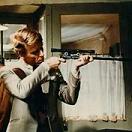
On May 16, 1973 Fred Zinnemann's The Day of the Jackal (Universal Pictures) debuts, based on the 1971 Frederick Forsyth novel and the real-life OAS assassination attempt on Charles de Gaulle on Aug. 22, 1962, starring Edward Fox as the mysterious assassin who "spent 71 days 56 minutes thinking a bullet into the brain of de Gaulle"; Michael Lonsdale stars as deputy commissioner Claude Lebel; does $16M box office; "But if the Jackal wasn't Calthrop, then who the hell was he?"; watch trailer; watch movie.
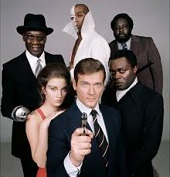
On June 27, 1973 Guy Hamilton's Live and Let Die (Eon Productions debuts (James Bond 007 film #8), based on the 1954 Ian Fleming novel, becoming the first with Stockwell, London, England-born "Simon Templar in The Saint" actor Roger George Moore (1927-2017) as 007; Jane Seymour plays Tarot card-reading Solitaire, who works with Dr. Kananga/ Mr. Big (Yaphet Kotto), whose asst. Tee Hee Johnson (Julius Harrison) sports a pincer hand; Clinton James plays La. cracker sheriff J.W. Pepper; English actor Kenneth More stands in the wings to replace ailing Bernard Lee, who plays M; the hot Live and Let Die Theme is by Paul McCartney (1942-) and Wings; #7 grossing film of 1973 ($35.4M U.S and $161.8M worldwide box office on a $7M budget); watch trailer.
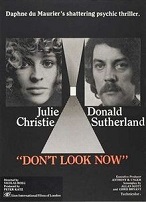
On Oct. 16, 1973 Nicolas Roeg's Don't Look Now (British Lion Films) debuts, a Gothic horror film set based on a Daphne du Maurier short story, starring Donald Sutherland and Julia Christie as married couple John and Laura Baxter, who lose their daughter Christine in a drowning in England, and go to Venice, where they meet blind psychic Heather (Hilary Mason), who claims to be able to see her, after which they begin seeing a mysterious childlike figure wearing a red coat; a daring sex scene by Sutherland and Christie causes the film to be rated X in Britain and R in the U.S., and is so explicit that it causes rumors that it wasn't faked.
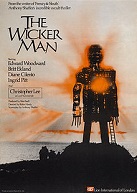
On Oct. 16, 1973 Robin Hardy's The Wicker Man (British Lion Films) debuts, written by Anthony Shaffer based on the 1967 David Pinner novel "Ritual" and with a soundtrack by Paul Giovanni, starring "The Equalizer" Edward Woodward as Anglican Police Sgt. Neil Howie, who investigates the disappearance of young Rowan Morrison (Gael. "rowan" = sacred tree) on the remote island of Summerisle in the Hebrides, where the owner Lord Summerisle (Christopher Lee) runs a neo-pagan Sun-fertility cult suspected of human sacrifice; after discovering the delights of nubile Willow (Britt Ekland), he attends the May Day festival disguised as Punch, then finds that Rowan is alive and he is the real human sacrifice, getting put in a wicker statue of a man and set ablaze, reciting Psalm 23 while they sing "Sumer Is Icumen In" in a study of a 20th cent. Christian-pagan confrontation; initially released in a cut-down form and doing only $58K box office, a "Cinefantastique" issue calling it "the Citizen Kane of horror movies" gets it rereleased in full form in 1979; watch trailer.

On Dec. 19, 1974 Guy Hamilton's The Man with the Golden Gun (Eon Productions) (United Artists) debuts (James Bond 007 film #9), based on the 1965 Ian Fleming novel, starring Roger Moore as James Bond, who duels with the world's #1 assassin Scaramanga (Christopher Lee) in order to acquire the Solex Agitator; also stars bikini-clad Britt Ekland as Goodnight, Maud Adams as Andrea, and dwarf/midget Herve Villechaize as Scaramanga's asst. Nick Nack; first 007 film to drop the plucked guitar from the Bond theme in favor of strings and trumpet; the romantic tropical island scene is filmed in unbearably hot Phuket; does $97.6M box office on a $7M budget; The Man With the Golden Gun Theme by Lulu is used after one by Alice Cooper was rejected; the Lulu one has the raunchiest 007 lyrics ever?
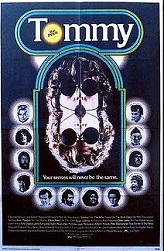
On Mar. 19, 1975 Ken Russell's Tommy (Columbia Pictures) debuts, based on the 1969 rock opera album, starring the British rock band The Who and a parade of mainly rock stars, incl. Ann-Margret as Nora Walker, Athur Brown as the Priest, Elton John as the Pinball Wizard, Eric Clapton as the Preacher, Keith Moon as Uncle Ernie, and Tina Turner as the Acid Queen; Jack Nicholson plays the Specialist, Robert Powell plays Group Capt. Walker, and Oliver Reed plays Uncle Frank Hobbs; does $34.3M box office on a $5M budget.

On Apr. 9, 1975 Terry Gilliam's and Terry Jones' Monty Python and the Holy Grail debuts, starring Graham Chapman as King Arthur in a spoof set in 932 C.E. of the Arthurian legend with the knights who say "Ni"; also stars John "It's just a scratch" Cleese as the Black Knight, and features the Trojan Killer Rabbit of Caerbannog who dispatches Sir Bors; also the Three Questions of the Old Man from Scene 24 on the Bridge of Death; #8 grossing film of 1975 ($5M box office on a $500K budget).
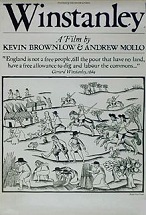
In 1975 Kevin Brownlow's and Andrew Mollo's B&W Winstanley debuts, based on the 1961 David Caute novel "Comrade Jacob", about Cromwell-era Diggers leader Gerrard Winstanley (Miles Halliwell); activist Sid Rawle plays a Ranter; real armor from the 1640s is borrowed from the Tower of London; music by Sergei Prokofiev; watch movie.

On Mar. 18, 1976 Nicolas Roeg's The Man Who Fell to Earth (British Lion Films) debuts, produced by Michael Deeley and Barry Spikings and written by Paul Mayersberg based on the 1963 Walter Tevis novel, starring David Bowie as humanoid alien Thomas Jerome Newton, who comes to Earth to get water for his dying planet, and meets Mary-Lou (Candy Clark), who falls for him; Rip Torn plays friendly human Nathan Bryce; becomes a cult classic; Bowie is so good he gets typecast?; watch trailer.

On June 6, 1976 Richard Donner's The Omen (20th Cent. Fox) debuts, based on the David Seltzer novel, starring Harvey Stephens as young 666-birthmarked kid Damien the Antichrist, and Gregory Peck and Lee Remick as his clueless adoptive parents Ambassador Robert and Katherine Thorn; features the theme song Ave Satani by Jerry Goldsmith; #5 grossing film of 1976 ($54.6M U.S. and $60.9M worldwide box office on a $2.8M budget); spawns sequels "Damien: Omen 2" (1978), "The Final Conflict" (1981), and made-for-TV "Omen 4: The Awakening" (1991); remade in 2006 starring Liev Schreiber.
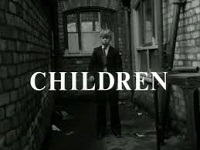
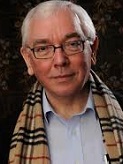
In 1976 Terence Davies' B&W Children debuts, the dir. debut of Kensington, Liverpool-born gay Roman Catholic-turned-atheist h.s. dropout Terence Davies (1945-), about his childhood under the alias Robert Tucker; followed by "Madonna and Child" (1980) and "Death and Transfiguration" (1983), becoming known as the Terence Davies Trilogy; watch clip.
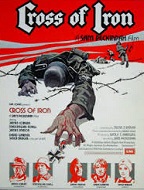
On Jan. 28, 1977 Sam Peckinpah's Cross of Iron (EMI Films) (ITC Entertainment) (Rapid Films GmbH) debuts, based on the 1956 novel "The Willing Flesh" by Willi Heinrich and shot in Yugoslavia with authentic tanks, about the Soviet attack on the German-held Kuban bridgehead in the Taman Peninsula in late 1943, showing the death throes of the Wehrmacht, starring James Coburn as Sgt. Rolf Steiner, Maximilian Schell as Capt. Stransky, James Mason as Col. Brandt, and David Warner as Col. Brandt; Peckinpah's first and only war film; big hit in Germany and Europe but tanks in the U.S.; makes fans of Orson Welles and Quentin Tarantino; followed by "Breakthrough" (1979); watch movie.


Can a new Ruling Fairy Tale save the world, why not try it? On May 25, 1977 the blockbuster film Star Wars (Episode 4 of 6: A New Hope) (20th Cent. Fox) (filmed at Elstree Studios in England) (with 60 SFX shots) by dir.-writer George "the Maker" Lucas (1944-) debuts; ticket price is $2.25; "May the Force be with you" joins the lexicon; the Western world gets a new uber-myth called the Force, which neatly bypasses the Bible and other organized religions without directly dissing them and even paying homage to their common grounding in ancient myths, while enshrining Science and Technology firmly above all possible Inquisitions; morphs sci-fi into the comic book realm, with dime-store philosophy added for emphasis to create a near-religious consumer cult (if only they can find a power source for all those gizmos and ships?); Luke Skywalker, Princess Leia, Obi-Wan Kenobi, Han Solo, Chewbacca the Wookie, the Millennium Falcon ("make it look like a hamburger" - Lucas), Darth Vader, Storm Troopers; Carrie Fisher gets the part of Princess Leia after first choice Jodie Fisher can't get out of her Disney contract; Sir Alec Guinness plays Obi-Wan Kenobe, and talks Lucas into killing him off because he hates the psychobabble lines, but makes a mint, allowing him to pick and choose roles; English 6'6" bodybuilder David Charles Prowse (1935-2020) wears the Darth Vader costume but his Bristol accent doesn't cut it, so James Earl Jones makes $7K for his voiceover role as Darth Vader after Orson Welles is turned down for having a voice that is too recognizable; Lucas has to beg 20th Cent. Fox for more money for special effects, but he scores big by retaining ownership of the 6-film series and merchandising; #1 grossing film of 1977, with $460.9M at the domestic box office and $775.4M worldwide on an $11M budget; spawns 250M action figures made through 1985; $4.5B of Star Wars merchandise is eventually sold (about what the U.S. spends each year on its real Star Wars program by the 21st cent.); "The Force is what gives the Jedi his power. It's an energy field created by all living things. It surrounds us and penetrates us. It binds the galaxy together"; "Do or do not, there is no try" first of the 6-film Star Wars Series; Lucas later utters the soundbyte; "How do democracies get turned into dictatorships? The democracies aren't overthrown; they're given away... Star Wars was really about the Vietnam War."
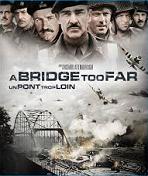
On June 15, 1977 Richard Attenborough's A Bridge Too Far (Joseph E. Levine Productions) (United Artists) debuts, based on the 1974 book by Cornelius Ryan about ill-fated 1944 WWII Operation Market Garden and filmed in Deventer, Netherlands, starring Dirk Bogarde as Lt. Gen. Frederick "Boy" Browning, Michael Caine as Lt. Col. J.O.E. Vandeleur, James Caan as Staff Sgt. Eddie Dohun, Edward Fox as Lt. Gen. Brian Horrocks, Elliott Gould as Col Robert Stout, Gene Hackman as Maj. Gen. Stanislaw Sosabowski, Anthony Hopkins as Lt. Col. John Frost, Sean Connery as Maj. Gen. Roy Urquhart, Ryan O'Neal as Brig. Gen. James Gavin, and Robert Redford as Maj. Julian Cook; #6 grossing film of 1977 ($50.8M box office on a $25M budget); "Well, as you know, I always felt we tried to go a bridge too far" (Dirk Bogarde); musical score by John Addison; watch film.
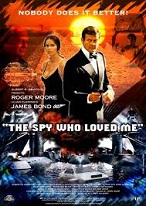
On July 7, 1977 (7/7/77) Lewis Gilbert's The Spy Who Loved Me (Eon Productions) (United Artists) (James Bond 007 film #10) debuts, based on the 1962 Ian Fleming novel, starring Roger Moore as James Bond, Barbara Bach as Agent XXX Maj. Anya Amasova, Curt (Curd) Jurgens as bad guy Captain Nemo wannabe Karl Stromberg, who wants to start a new civilization under the sea, and 7'2" Richard Kiel as steel-toothed henchman Jaws; the theme song is Nobody Does It Better by Marvin Hamlisch and Carole Bayer Sager, sung by Carly Simon; opens with a parachute jump off Mount Asgard in Greenland; #8 grossing film of 1977 ($46.8M U.S. and $185.4M worldwide on a $14M budget).
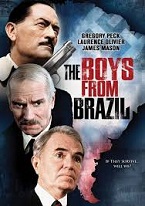
On Oct. 5, 1978 Franklin J. Schaffner's The Boys from Brazil (Oct. 5) (ITC Entertainment) (20th Cent. Fox), based on the 1976 Ira Levin novel stars Gregory Peck as Auschwitz Angel of Death Dr. Josef Mengele, whose plot to grow 94 little Hitler clones is uncovered by Barry Kohler (Steve Guttenberg), causing Nazi hunter Ezra Lieberman (Sir Laurence Olivier) to go after him, resulting in a weird scene where a boy Hitler orders Mengele's death to please Lieberman, the ultimate Jewish fantasy?; does $19M box office on a $12M budget; watch movie - cut?


On May 25, 1979 Ridley Scott's Alien (20th Cent. Fox, London) debuts, a quantum leap in sci-fi and horror flicks, starring manly woman Sigourney (Susan Alexander) Weaver (1949-) (who named herself after Sigourney Howard in "The Great Gatsby") as space hero Ripley, taking on the ultimate ET cockroach infestation on the mining ship Nostromo; the scene of the baby alien popping out of John Hurt's chest in the mess hall is a keeper, and the flick is a big hit, spawning three sequels, "Aliens" (1986), "Alien 3" (1992), and "Alien: Resurrection" (1997); "In space no one can hear you scream"; #8 grossing film of 1979 (104.9M U.S. and $203.6M worldwide box office on an $11M budget). On July 18, 1986 James Cameron's Aliens (Brandywine Productions) (20th Cent. Fox) debuts, a sequel to the 1979 hit "Alien" set 57 years later; stars Sigourney Weaver as manly woman Ellen Ripley, who leads a hunter-killer mission to planet LV-426, where they find lone human survivor Rebecca "Newt" Jorden (Carrie Henn), and are then wiped-out by the mean aliens; Michael Biehn plays Cpl. Dwayne Hicks after James Remar leaves during filming; Lance Henriksen plays the android Bishop; Paul Reiser plays company man Carter Burke, who tries to sabotage the mission so he can bring a live specimen back, the dope?; Jenette Goldstein plays manly woman Pvt. Vasquez.

On June 26, 1979 Lewis Gilbert's Moonraker (Eon Productions) debuts (James Bond 007 film #11), based on the 1955 Ian Fleming novel, starring Roger Moore as 007, Michael Lonsdale as bad guy Hugo Drax, who wants to kill all humans on Earth and repopulate it from a space station, Richard Kiel as his henchman Jaws, and Lois Chiles as the Bond girl Holly Goodhead; too bad, it seems to lose its credibility in a mire of campy space Amazons?; "Outer space now belongs to 007"; #9 grossing film of 1979 ($62.7M in the U.S., $210.3M worldwide on a $34M budget).
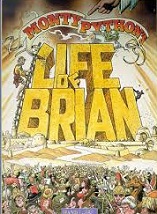
On Aug. 17, 1979 Terry Jones' Monty Python's Life of Brian debuts, about Brian Cohen (Graham Chapman), who is born on the same day and next door to Jesus Christ, and is mistaken for him; financed by HandMade Films, financed by Beatle George Harrison; panned by some critics for blasphemy, and banned in Ireland and Norway, which makes it more popular?; does $20M box office on a $4M budget; "He wasn't the Messiah. He was a very naughty boy."
In 1980 only 31 British films are made (vs. 62 in 1979), lowest since 1914; in 1981 it falls to 24.
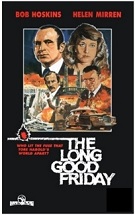
In Nov. 1980 John Mackenzie's The Long Good Friday (Black Lion Films) (HandMade Films) debuts, starring Robert William "Bob" Hoskins (1942-2014) in his breakthrough role as London gang boss Harold Shand, who tries to get the Am. Mafia to build a casino in the London Docklands, and gets in a bloody gang war with the IRA; Hellen Mirren plays Harold's partner Victoria.

On Mar. 30, 1981 Hugh Hudson's Chariots of Fire (Warner Bros.) (his first dramatic film) (title comes from the William Blake poem "Jerusalem": "Bring me my Chariot of fire", based on 2 Kings 2:11, 6:17) tells the behind-the-scenes story of the 1924 Paris Olympics, starring London, England-born Harry Bernard "Ben" Cross (1947-) (non-Jewish, obviously?) as Jewish English chip-on-shoulder runner Harold Abrahams, and Glasgow, Scotland-born Ian Charleson (1949-90) as Christian Scottish runner Eric Liddell, who run for religious and personal reasons, with every supporting actor hitting all cylinders, incl. Ian Holm (1931-) as half-Italian half-Arab trainer Sam Mussabini, Upington, South Africa-born Alice Maud Krige (1954-) as Abraham's opera star babe Sybil Gordon, Nigel Allan Havers (1951-) as ultra-pampered blonde Anglo-Saxon Lord Andrew Lindsay, Essex, England-born Nicholas Farrell (Frost) (1955-)) (film debut) as "my complete man" Aubrey Montague (the narrator, based on real letters he wrote), Robert Creel "Brad" Davis (1949-91) and squeaky-voiced Dennis Christopher (Carreli) (1955-) as Am. superstar athletes Jackson Scholz and Charles Paddock, Cheryl Campbell (1949-) as Liddell's monomaniac sister Jennie, Arthur John Gielgud (1904-2000) and Lindsay Gordon Anderson (1923-1994) as the snobby English masters of Trinity and Caius (pr. like keys) Colleges, and Arthur Nigel Davenport (1928-2013) as Lord Birkenhead, all to cool electronic music by Greek composer Vangelis (Evangelos Odysseas Papathanassiou) (1943-), whose father was a runner, starting a trend; the climax is Liddell refusing to run on Sunday, hanky please; yes, they shot on Sundays; they have to use period costumes from "Reds", which gets behind schedule, causing a crunch; in real life Charleson is faster than Cross; sales start out er, slow until Christian orgs. begin showing it, after which a glowing review by Roger Ebert gets it going, and the portrayal of English discrimination against Jews turns on Am. black audiences, taking it over the top at the box office, and it ends up doing $58.9M box office on a £3M budget; costumes by Melena Canonero; at the beginning they put the word "shit" into the script to get a PG rating to make more money; one of the first uses of steady-cam; after the real Cambridge U. refuses them permission, they film at Eaton; "I believe in the pursuit of excellence, and I'll carry the future of me" (Cross); "Well, there goes your Semite, Hugh. A different god, a different mountaintop" (Gielgud); the greatest pure non-gimmicky religious movie of all time?; on TLW's all-time top-5 list; first release by British film co. Goldcrest Films (founded 1977), followed by "Escape from New York" (1981), "Gandhi" (1982), and "The Killing Fields" (1984); executive producer is Egyptian-born Emad El-Din Mohamed Abdel Moneim "Dodi" Fayed (1955-97), later known as the last beau of Princess Diana; "I know God made me for a purpose, but I also know he made me fast."

On Apr. 10, 1981 John Boorman's Excalibur (Orion Pictures) (Warner Bros.) debuts, retelling the King Arthur legend in style, starring Nigel Terry as Arthur, Nicol Williamson as Merlin, Cherie Lunghi as Guenevere, Nicholas Clay as Lancelot, Helen Mirren as Morgana Le Fay, Patrick Stewart as King Leondegrance, and Liam Neeson as Sir Gawain; film debut of Irish actor Ciaran (Ciarán) Hinds (1953-) as King Lot; does $35M box office on an $11M budget; watch clip.
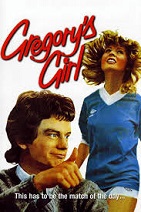
On Apr. 23, 1981 Bill Forsyth's Gregory's Girl (ITC Entertainment) debuts, set in a state secondary school in Abronhill, Cumbernauld, Scotland, starring John Gordon Sinclair as h.s. soccer player Gregory Underwood, and Dee Hepburn as female player Dorothy, whom all the boys want to make the team so they can make her; Clare Grogan plays Dorothy's friend Susan; does £25.7M box office on a £200K budget.


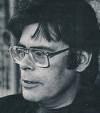

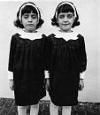
On May 23, 1980 Stanley Kubrick's The Shining (Peregrine Productions) (Hawk Films) (Warner Bros.) debuts, filmed at EMI Elstree Studios in England using the new Steadicam, based on the 1977 Stephen King novel about failed writer Jack Torrance (Jack Nicholson) getting cabin fever at the secluded Overlook Hotel in Colo. during the winter; features the great climax where he goes after his family with an axe, crying, "Here's Johnny!"; title is inspired by John Lennon's "Instant Karma" and its line "We all shine on"; Joe Turkel plays creepy Joe the Bartender; the disturbing 1967 photograph Identical Twins, Roselle, N.J. of Lisa and Louise Burns (1968-) by Diane Arbus is used for effect; Danny Lloyd plays the psychic kid who talks with his finger and spouts "Redrum!"; bizarrely skinny scarecrow Shelley Duvall plays his freaked wife, and Scatman Crothers plays psychic vacationing chef Dick Hallorann, who returns to get axed; the photo at the end shows the hotel on July 4, 1921 as "Midnight, the Stars, and You" is being played; "All work and no play make Jack a dull boy"; the film contains numerous codes revealing that Kubrick directed a govt.-backed fake Apollo 11 moon landing based on his experience filming "Doctor Strangelove" (1964) and "2001: A Space Odyssey" (1968)?; it's no surprise that the record for altitude was 853.8 mi. (1,374.1km) for Gemini 11 on Sept. 14, 1966?; watch trailer; view clip; view clip; view clip; view clip.
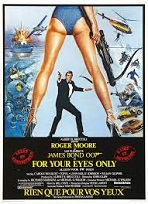
On June 24, 1981 John Glen's For Your Eyes Only (Eon Productions) (United Artists) debuts (James Bond 007 film #12) (#5 with Roger Moore), starring Topol as good guy Milos Columbo, cool-eyed Carole Bouquet as Bond girl Melina Havelock, Julian Glover as bad guy Aristotle Kristatos, and hot Lynn-Holly Johnson as Olympic skater and bed-bunny Bibi Dahl, in a Cold War spy game involving the British ATAC missile command system; the For Your Eyes Only Theme is sung by sexy Sheena Easton, who becomes the first singer shown singing a Bond theme song until 1995; another version by Blondie is rejected; the first of five 007 films dir. by Glen; does $195.3M box office on a $28M budget, saving United Artists from bankruptcy after the 1980 "Heaven's Gate" disaster, after which they merge with MGM and concentrate on blockbusters; since Bernard Lee, who plays M is sick, the script it changed to say that he is on leave, and the confession booth meeting with 007 is changed to Q.
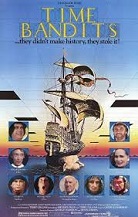
On July 10, 1981 Terry Gilliam's Time Bandits (HandMade Films) (Avco Embassy Pictures) debuts, a fantasy film starring Kevin Warnock as 11-y.-o. Kevin, who travels from his bedroom back in time using a magic map, meeting Napoleon (Ian Holm), King Agamemnon (Sean Connery), Robin Hood (John Cleese), Pansy (Shelley Duvall), Winston the Ogre (Peter Vaughn), Mrs. Ogre (Katherine Helmond), Vincent (Michael Palin), the Supreme Being (Ralph Richardson), and Evil (David Warner); does $42.4M box office on a $5M

On Aug. 21, 1981 John Landis' An American Werewolf in London (PolyGram Pictures) (Gruber-Peters Co.) (Universal Pictures) debuts,, filmed in Wales and Surrey, England, starring David Naughton as David Kessler, and Griffin Dunne as Jack Goodman, two Yank college students who decide to go on a hike in the Yorkshire Moors and get mixed up with werewolves, who kill Jack and turn David into one, after which he is taken to a London hospital where he hooks up with hot Nurse Alex Price (Jenny Agutter); does $62M box office on a $10M budget; followed by "An American Werewolf in Paris" (1997).

On Nov. 30, 1982 Richard Attenborough's Gandhi (Goldcrest Films) debuts, an epic about the Mahatma's life starring Ben Kingsley; Candice Bergen plays Margaret Bourke-White; John Gielgud plays the 1st baron Irwin; Athol Fugard plays Gen. Jan Christiaan Smuts; Trevor Howard plays Judge R.S. Broomfield; Martin Sheen plays fictional journalist Vince Walker, based on Webb Miller; Ian Charleson plays Rev. Charles Fleer Andrews; the funeral scene has 300K extras; does $127.8M box office on a $22M budget.
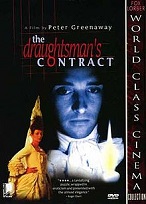
In 1982 Peter Greenaway's The Draughtsman's Contract (Channel 4) (British Film Inst.) (United Artists) debuts, a murder mystery starring Anthony Higgins as young arrogant Byron clone artist Mr. Neville in 1694 Wiltshire, England, who contracts with Mrs. Virginia Herbert (Janet Suzman) for 12 landscape drawings accompanied by sexual encounters, and when she gets tired of it, her married daughter Mrs. Talmann (Anne-Louise Lambert) makes him sign a second contract in which he must comply with her pleasure instead of his; score by Michael Nyman based on melodies by Henry Purcell; Greenaway's first feature film; watch trailer.
In 1982 FilmFour (Film4) Productions (Films) (Internat.), owned by BBC Channel 4 releases its first film "Waiter", concentrating on kitchen-sink realism and period drama, incl. "A Room with a View" (1985), "The Crying Game" (1992), "Four Weddings and a Funeral" (1994), "The Madness of King George" (1994), "Trainspotting" (1996), "Elizabeth" (1998), "Slumdog Millionaire" (2008), "The Iron Lady" (2013), "12 Years a Slave" (2013), and "Mr. Turner" (2014).
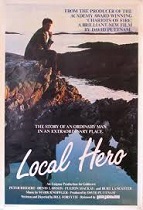
On Feb. 17, 1983 Bill Forsyth's Local Hero (20th Cent. Fox) (Warner Bros.) debuts, produced by David Puttnam, starring Burt Lancaster as Houston, Tex.-based Knox Oil & Gas CEO Felix Happer, who sends hotshot exec "Mac" MacIntyre (Peter Reigert) to buy the village of Ferness, Scotland to build a refinery, but falls in love with the people instead; does $5.9M box office on a £3M budget.
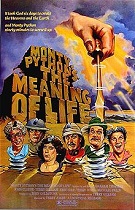
On Apr. 22, 1983 Terry Jones' Monty Python's The Meaning of Life (Universal Pictures) is a series of silly sketches incl. "The Miracle of Birth", "Growth and Learning", "Fighting Each Other", "The Middle of the Film", "Middle Age", "Live Organ Transplants", "The Autumn Years", "Death", and "The End of the Film"; features Every Sperm Is Sacred, The Penis Song, and The Galaxy Song; "Try and be nice to people, avoid eating fat, read a good book every now and then, get some walking in, and try to live together in peace and harmony with people of all creeds and nations"; does $14.9M box office on a $9M budget.

On May 10, 1983 Nagisa Oshima's Merry Christmas, Mr. Lawrence (Recorded Picture Co.) debuts, based on novels by Sir Laurens van der Post, starring David Bowie as South African pvt. Jack Celliers, and Tom Conti as Japanese-speaking British Lt. Col. John Lawrence, who are stuck in a Japanese POW camp in Java in 1942, dueling with camp cmdr. Capt. Yonoi (Ryuichi Sakamoto), who is tormented by missing out on the Feb. 26 Incident of 1936, and his closet gay feelings; the shocking ending, where Bowie's buried alive in the sand until butterflies rest on his face ends Bowie's typecasting, or confirms it?; Takeshi Kitani plays Sgt. Gengo Hara; Sakamoto writes the score, incl. the haunting theme Forbidden Colours, sung by David Sylvian.

On June 6, 1983 John Glen's Octopussy (Eon Productions) (MGM) (United Internat. Pictures) (James Bond 007 film #13) debuts, based on the 1966 Ian Fleming short story "Octopussy and The Living Daylights", starring aging Roger Moore (b. 1927) as 007, and Maud Adams as you know what, and manages to keep the franchise from stalling despite a few seams showing and a competitor in town, doing $183.M worldwide box office on a $27.5M budget; Louis Jourdan plays bad guy Kamal Khan, Kristina Wayborn plays his henchman Magda, Kabir Beda plays his bodyguard Gobinda; Steven Berkoff plays Soviet Gen. Orlov; David Meyer and Anthony Meyer plays circus knife-throwers Mischka and Grischka; Rita Coolidge sings the Octopussy Theme Song (All Time High).
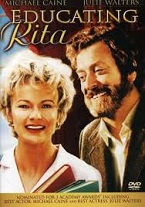
On Sept. 14, 1983 Lewis Gilbert's Educating Rita (Columbia Pictures) debuts, based on the 1980 play by Willy Russell, set at Trinity College, Dublin, starring Michael Caine as alcoholic Open U. lit. prof. Frank Bryant, who tries to mentor working-class Liverpudlian hairdresser Rita, played by Birmingham-born Julia Mary "Julie" Walters (1950-) in her feature film debut; Bryant confuses consonance with assonance?; "the last good picture made before [I] mentally retired" (Caine).

On Oct. 7, 1983 Irvin Kershner's Never Say Never Again (Warner Bros.) debuts, a 007 James Bond flick not made by Eon Productions because of the film rights of screenwriter Kevin McClory, sans the usual Miss Moneypenny, M, Q, and Felix Leiter, and is the last 007 performance by aging Sean Connery (b. 1930), grossing $160M worldwide on a $36M budget; the Bond girl is Kim Basinger, who plays Domino Petachi, the bad guy is Klaus Maria Brandauer, who plays Maximilian Largo, and the bad girl is Barbara Carrera, who plays Fatima Bush in a caper about stealing two nuclear warheads; the Never Say Never Again Theme is by Herb Alpert's wife Lani Hall (1945-).
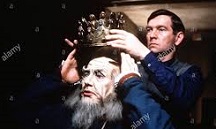
On Dec. 9, 1983 Peter Yates' The Dresser (Columbia Pictures) debuts, based on the 1980 Ronald Harwood play about Shakespearan actor Sir Donald Wolff, set in WWII Britain, starring Albert Finney as dying actor Sir, and Tom Courtenay as his dresser Norman; Edward Fox plays Oxenby; does $5.3M box office; watch trailer.
In 1983 Working Title Films is founded in London, England by Tim Bevan and Sarah Radclyffe to produce Am-British TV shows incl. "About a Boy" and "The Tudors", and feature films incl. "My Beautiful Laundrette" (1985), "Wish You Were Here" (1987), "Sammy and Rosie Get Laid" (1987), "The Tall Guy" (1989), "Chicago Joe and the Showgirl" (1990), "Drop Dead Fred" (1991), "Barton Fink" (1991), "Four Weddings and a Funeral" (1994), "The Hudsucker Proxy" (1994), "Dead Man Walking" (1995), "Fargo" (1996), "Bean" (1997), "The Big Lebowski" (1998), "Elizabeth" (1998), "Notting Hill" (1999), "Billy Elliot" (2000), "O Brother, Where Are Thou?" (2000), "40 Days and 40 Nights" (2002), "About a Boy" (2002), "Johnny English" (2003), "Ned Kelly" (2004), "Bridget Jones: The Edge of Reason" (2994), "The Interpreter" (2005), "Pride & Prejudice" (2005), "Nanny McPhee" (2006), "United 93" (2006), "Mr. Bean's Holiday" (2007), "Elizabeth: The Golden Age" (2007), "Atonement" (2008), "Burn After Reading" (2008), "Frost/Nixon" (2008), "Rush" (2013), "Theory of Everything" (2014), "Legend" (2015), "The Danish Girl" (2015), and "Bridget Jones's Baby" (2016).

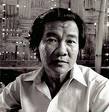

On Nov. 2, 1984 Roland Joffe's The Killing Fields (Goldcrest Films) (Enigma Productions) (Warner Bros.) debuts, (Joffe's dir. debut), based on New York Times reporter Sydney Schanberg's (Sam Waterston) account of his friendship with Cambodian interpreter Dith Pran, played by Cambodian physician Haing Somnang Ngor (1940-96), and the aftermath of the May 1973 fall of Phnom Penh; features the film debut of John Horatio Malkovich (1953-); does $34.7M box office on a $14.4M budget; watch trailer.
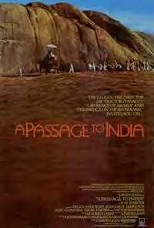
On Dec. 14, 1984 David Lean's A Passage to India (Thorn EMI) (HBO) (Columbia Pictures) debuts, based on the 1924 E.M. Forster novel, starring Judy Davis as raped Adela Quested, Peggy Ashcroft as Mrs. Moore, James Fox as Cyril Fielding, and Victor Banerjee as poor framed rapist Dr. Aziz Ahmed; Sir Alec Guinness' 6th film with Lean as Prof. Godbole; does $27.2M box office U.S. on £17M budget; watch trailer.

On Feb. 20, 1985 Terry Gilliam's Brazil (20th Cent. Fox) debuts, starring Jonathan Pryce as Sam Lowry, a man in a retro-future dystopian world with a totalitarian Orwellian govt. with a slapstick quality and no Big Brother; after bombing in the U.S., it becomes a cult film; features the theme song Squarela do Brasil by Geoff Muldaur; watch trailer.
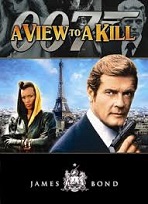
On May 22, 1985 John Glen's A View to a Kill (Eon Productions) (MGM/UA) (United Internat. Pictures) debuts (James Bond 007 film #14), based on the Ian Fleming short story "From a View to a Kill" (1960), starring Roger Moore (7th and last appearance) as James Bond, Christopher Walken as bad guy Max Zorin, who has a plan to destroy Calif.'s Silicon Valley to corner the microchip market, Tanya Roberts as Stacey Sutton, Grace Jones as Zorin's henchwoman May Day, and Patrick Macnee as horse trainer Sir Godfrey Tibett; does $152.4M box office on a $30M budget; the A View to a Kill Theme is performed by Duran Duran.
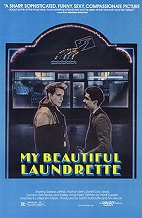
On Sept. 7, 1985 Stephen Frears' My Beautiful Laundrette (Working Title Films) (Channel Four Films) debuts, starring Gordon Warnecke as Omar Ali, a Pakistani immigrant in Battersea, Wandsorth, South London, who has a gay affair with street punk Johnny Burfoot (Daniel Day-Lewis) and end up running a you know what together; Saeed Jaffrey plays Omar's uncle Nasser Ali; does $2.45M box office on a £650K budget.
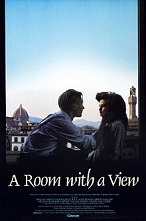
On Dec. 13, 1985 Ismail Merchant's and James Ivory's A Room with a View (Goldcrest Films) (FilmFour Internat.) debuts, based on the 1908 E.M. Forster novel about repressed upper-class Edwardian English in the countryside of gay Florence, starring Helena Bonham Carter (her breakthrough role) as Lucy Honeychurch, and Maggie Smith as her aunt Charlotte Bartlett, who hook up with novelist Miss Eleanor Lavish (Judi Dench) and the father-son Emersons (Denholm Elliot as father, and Julian Sands as son George); Daniel Day-Lewis plays Cecil Vyse; does $21M box office on a $3M budget.
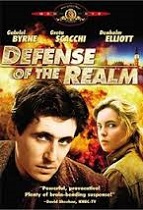
On Jan. 1, 1986 David Drury's Defence of the Realm (Hemdale Film Corp.) debuts, named after the 1914 British Defence of the Realm war powers act, starring Gabriel Byrne as British journalist Nicholas "Nick" Mullen, who tries to prove that MP Dennis Markham (Ian Bannen) is being framed on being an East German spy with the help of Markham's secy. Nina Beckman (Greta Scacchi) and older colleague Vernon Bayliss (Denholm Elliott), exposing a coverup over a near nuclear accident at a secret USAF base in Britain.
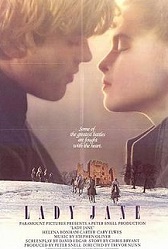
On Feb. 7, 1986 Trevor Nunn's Lady Jane (Paramount Pictures) debuts, starring Islington, London-born Helena Bonham Carter (1966-) in her film debut as Lady Jane Grey, Cary Elwes as Lord Guildford Dudley, and Jane Lapotaire as Queen Mary; a flop, doing $277.6K box office on an $8.5M budget.
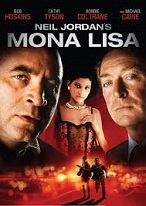
On June 13, 1986 Neil Jordan's Mona Lisa (HandMade Films) (Island Pictures) debuts, a neo-noir crime film starring Bob Hoskins as ex-con George, who is hired by his boss Denny Mortwell (Michael Caine) as a chauffeur-bodyguard for high-class call girl Simone (Cathy Tyson), and falls for her, until he finds out that she's in a lez relationship with teenie Cathy (Kate Hardie).
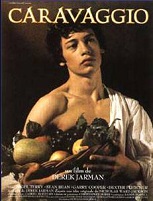
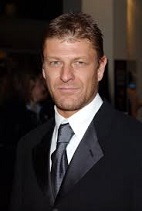
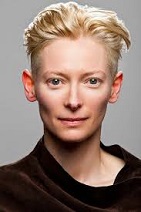
On Aug. 29, 1986 Derek Jarman's Caravaggio debuts, produced by Sarah Radclyffe, starring Nigel Terry as Italian Baroque painter Michelangelo Merisi da Caravaggio, who starts out a teenie street ruffian until rich Cardinal Del Monte (Michael Gough) adopts him and turns him bi, later starting a 3-way with gay bud Ranuccio, played by Sheffield-born Sean (Shaun Mark) Bean (1959-) in his film debut, and his babe Lena, played by London-born Katherine Matilda "Tilda" Swinton (1960-) in her film debut; Robbie Coltrane plays Scipione Borghese; to be more artsy-fartsy, the 16th cent. historical drama incl. electric lights and calculators, a truck, motorbike, car horns, and manual typewriter.
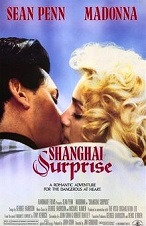
On Aug. 29, 1986 Jim Goddard's Shanghai Surprise (HandMade Films) (MGM) debuts, a stinker starring newlyweds Sean Penn and Madonna as salesman Glendon Wasey and nurse Gloria Tatlock, who try to steal opium in Shanghai; does $2.3M box office on a $17M budget.
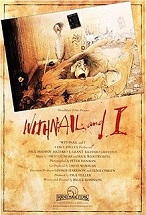
On Apr. 10, 1987 Bruce Robinson's Withnail and I (HandMade Films) (Cannon Group) debuts, a black comedy based on Robinson's life in 1960s Camden Town, London, England, starring Richard E. Grant as Witnall, and Paul McGann as I (Marwood), young unemployed actors who share a filthy Georgian flat and squander their money on booze, then go on a weekend holiday to a country cottage in the Lake District owned by Withnail's lecherous gay uncle Monty; does $1.5M U.S. and £565K U.K. on a £565K budget, gaining a cult following; watch movie.
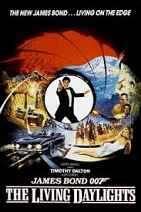
On June 27, 1987 John Glen's The Living Daylights (Eon Productions) (MGM/UA) (United Internat. Pictures) (James Bond 007 film #15), based on the 1966 novel "Octopussy and The Living Daylights" (last based on an Ian Fleming title until "Casino Royale" in 2006) stars Welsh-born Timothy Peter Dalton (1944-) as 007 James Bond (1st time), and Afghan hound-like Maryam d'Abo as viola-playing Bond girl Kara Milvoy to a French-horny theme song The Living Daylights by a-ha; also stars Jeroen Krabbe as Soviet Gen. Georgi Kostkov, Joe Don Baker as U.S. bad guy Brad Whitaker, John Rhys-Davies as Soviet Gen. Leonid Pushkin, Andreas Kosniewski as bad guy Necros, and Art Malik as Afghan mujahideen leader Kamran Shah; does $191M box office on a $40M budget.
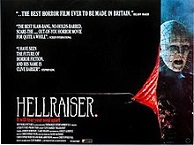
On Sept. 10, 1987 Clive Barker's Hellraiser (Sept. 10) (Film Futures) (New World Pictures) (Entertainment Film Distributors) debuts, based on the 1986 novella "The Hellbound Heart", starring Sean Chapman as Frank, who has his body torn to pieces by Cenobites (formerly human monsters who harvest human souls to torture in S&M experiments, opening a door to another dimension) led by Pinhead (Doug Bradley); Andrew Robinson plays Frank's brother Larry Cotton, Clare Higgins plays his wife Julia Cotton, and Ashley Laurence plays his daughter Kirsty Cotton; does $14M box office on a $1M budget; the dir. debut of Liverpool, England-born Clive Barker (1952-); spawns sequels incl. "Hellbound: Hellraiser II" (1988), "Hellraiser III: Hell on Earth" (1992), "Hellraiser: Bloodline" (1996), "Hellraiser: Inferno" (2000), "Hellraiser: Hellseeker" (2002), "Hellraiser: Deader" (2005), "Hellraiser: Hellworld" (2005), "Hellraiser: Revelations" (2011), "Hellraiser: Judgment" (2018); watch trailer; view clip.
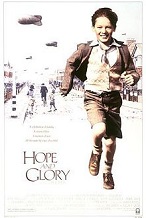
On Nov. 13, 1987 John Boorman's Hope and Glory (Goldcrest Films) (Columbia Pictures) debuts, about the Rohan family during the WWII Blitz, incl. Billy (Sebastian Rice-Edwards), Grace (Sarah Miles), Clive (David Hayman), Sue (Geraldine Muir), and Dawn (Sammi Davis).

On July 15, 1988 Charles Crichton's A Fish Called Wanda (MGM) debuts, written by Monty Python man John Cleese, about four thieves trying to retrieve $20M they've stolen from a safe deposit box; meanwhile barrister Archie Leach (Cleese) falls in love with female thief Wanda Gershwitz (Jamie Lee Curtis), and Otto (Kevin Kline) has a problem with stuttering and dead doggies; Maria Aitken plays Cleese's wife Wendy; does $62.5M box office; "A tale of murder, lust, greed, revenge, and seafood."
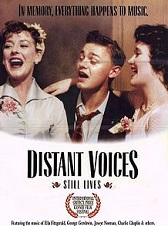
On Sept. 29, 1988 Terence Davies' Distant Voices, Still Lives debuts, based on Davies' life and produced by Jennifer Howarth consists of two films shot two years apart, about a working-class Roman Catholic family in Liverpool during the 1940s and 1950s and their consumption of popular music and cinema, starring Pete Postlethwaite as Father, Freda Dowie as Mother, and Lorraine Ashbourne as Maisie; "Memories are the sound of distant voices, and the echoes of still lives"; "In memory, everything happens to music"; watch trailer.
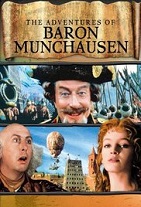
On Dec. 8, 1988 Terry Gilliam's The Adventures of Baron Munchausen (Allied Filmmakers) (Columbia Pictures) debuts, starring John Neville as the Baron of the Tall Tales in a film that somehow says goodbye to the 1980s?; Sarah Polley plays Sally Salt; Eric Idle plays Berthold/Desmond; Jonathan Pryce plays the Right Ordinary Horatio Jackson; Oliver Reed plays Vulcan; does $8M box office in the U.S. and way better in Europe on a $46.6M budget.
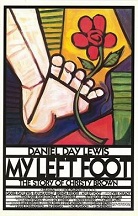
On Feb. 24, 1989 Jim Sheridan's My Left Foot (Granada Films) (Miramax Films) debuts, starring Daniel Day-Lewis as cerebral palsy sufferer Christy Brown, who learns how to use his you know what to paint with; Fina Shaw plays Dr. Eileen Cole, and Ruth McCabe plays nurse Mary Carr; does $14.7M box office on a £600K budget.
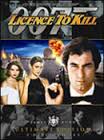
On June 13, 1989 John Glen's Licence to Kill (Eon Productions) (MGM/UA) (United Internat. Pictures) debuts (James Bond 007 Film #16) (first not to use the title of an Ian Fleming story) (last dir. by Glen) (first shot completely outside the U.K.) stars Timothy Dalton as a dark violent James Bond, who goes on a vendetta against the man who maimed his friend and killed his friend's wife on their wedding night, David Hedison as Felix Leiter, Carey Lowell as Pam Bouvier, Robert Davi as bad guy Latin Am. drug lord Franz Sanchez, Talisa Soto as his moll Lupe Lamore, Anthony Zerbe as his henchman Milton Krest, Wayne Newton as Sanchez's middleman Prof. Joe Butcher, Benicio del Toro as Sanchez's henchman Dario, and Everett McGill as corrupt DEA official Ed Killifer; "Don't you want to know what?; does $156M box office on a $32M budget; the Licence to Kill Theme is sung by Gladys Knight.
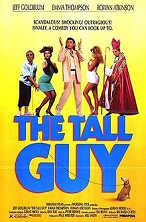
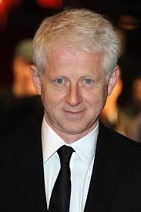
On June 23, 1989 Mel Smith's The Tall Guy (Virgin Vision) (Miramax Films) debuts, a British romantic comedy starring Jeff Goldblum as Am. actor Dexter King, who lives platonically with his nymphomaniac landlady Geraldine James in Camden Town, London, and falls for nurse Kate (Emma Thompson), who jilts him when he hooks up with married actress Kim Thomson; the feature film debut of Kiwi-born British screenwriter Richard Whalley Anthony Curtis (1956-), who goes on to become Britain's top comedy screenwriters, incl. "Four Weddings and a Funeral" (1994), "Notting Hill" (1999), "Mr Bean" (1990), and "Bridget Jones's Diary" (2001).

On Oct. 6, 1989 Kenneth Branagh's Henry V (BBC Films) (Samuel Goldwyn Co.) debuts, based on the Shakespeare play, starring Belfast, Northern Ireland-born Kenneth Charles Branagh (1960-) as Henry V, Robbie Coltrane as Sir John Falstaff, Emma Thompson as Katharine, and Derek Jacobi as Chorus; does $10.2M box office on a $9M budget; "The great adventure of a king who defied the odds to prove himself a man."

In 1989 Capitol Films is founded in the U.K., going on to produce 50+ films incl. "A Good Man in Africa" (1994), "Death and the Maiden" (1994), "Wilde" (1997), "Dancing at Lughnasa" (1998), "Gosford Park" (2001), "Elvis Has Left the Building" (2004), and "Lucky Number Sleven" (2006); in Jan. 2006 it is acquired by Am. Mobius Pictures, which goes bankrupt in Jan. 2012.
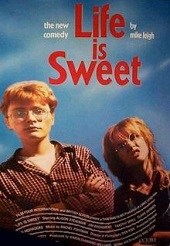
On Nov. 22, 1990 Mike Leigh's Life Is Sweet (Thin Man Films) (October Films) debuts, about a working-class North London family's life one summer, starring Jim Broadbent as cook Andy, Timothy Spall as family friend Aubrey, Alison Steadman as Wendy, Claire Skinner as Natalie, and Jane Horrocks as her bulimic twin sister Nicola. does $1.5M box office; first release from Thin Man Films, founded by dir. Mike Leigh and producer Simon Channing Williams, named after their non-thinness, which shares offices on Greek St., London with Potboiler Production, founded in 2000 by Williams and Gail Egan, which goes on to produce "Nicholas Nickleby" (2002) and "The Constant Gardener" (2005); Thin Man Films goes on to produce "Naked" (1993), "Secrets & Lies" (1995), "Career Girls" (1997), "Topsy-Turvy" (1999), "All or Nothing" (2002), "Vera Drake" (2004), "Happy-Go-Lucky" (2008), "Another Year" (2010), and "Mr. Turner" (2014).

On Dec. 19, 1990 Franco Zeffirelli's Hamlet (Nelson Entertainment) (Icon Productions) (Warner Bros.) debuts, based on the Shakespeare play (first film from Gibson's Icon Productions), starring Mel Gibson as Hamlet, Glenn Close as Queen Gertrude, Stephen Dillane as Horatio, and Helena Bonham Carter as Ophelia; does $20.7M box office.
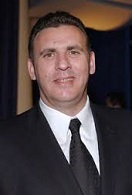
In 1990 GK Films (originally Initial Entertainment Group until 2008) is founded in Britain by Graham King (1961-), going on to produce "Liebestraum" (1991), "Rent-a-Kid" (1995), "Little City" (1997), "Family Plan:" (1997), "Walking Thunder" (1997), "Montana" (1998), "Savior" (1998), "Very Bad Things" (1998), "Traffic" (2000), "Ali" (2001), "The Dangerous Lives of Altar Boys" (2002), "Gangs of New York (2002), "Laws of Attraction" (2004), "The Aviator" (2004), "The Ballad of Jack and Rose" (2005), "An Unfinished Life" (2005), "The Departed" (2006), "Blood Diamond" (2006), "Next" (2007), "Gardener of Eden" (2007), "Bangkok Dangerous" (2008), "The Young Victoria" (2009), "Edge of Darkness" (2010), "The Town" (2010), "London Boulevard" (2010), "The Tourist" (2010), "Rango" (2011), "The Rum Diary" (2011), "Hugo" (2011), "In the Land of Blood and Honey" (2011), "Dark Shadows" (2012), "Argo" (2012), "World War Z" (2013), "Jersey Boys" (2014), "The 5th Wave" (201), "Allied" (2016), "High Noon" (2017), and "Tomb Raider" (2018).
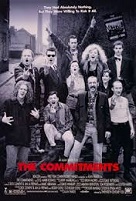
On Aug. 7, 1991 Alan Parker's The Commitments (Beacon Communications) (First Film Co.) (Dirty Hands Productions) (20th Cent. Fox) debuts, based on the 1987 novel by Roddy Doyle about a working class Am. (black) soul band in Northside, Dublin, Ireland, led by Jimmy Rabbitte (Robert Arkins), incl. Declan "Deco" Cuffe (Andrew Strong), Imelda Quirke (Angeline Ball), Natalie Murphy (Maria Doyle), Bernie McGloughlin (Bronagh Gallagher), and Joey "the Lips" Fagan (Johnny Murphy); does $14.9M box office on a $12M budget; it goes on to gain a cult following; watch trailer.
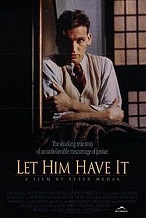
In 1991 Peter Medak's Let Him Have It (British Screen Productions) debuts, based on the 1952 case of 19-y.-o. illiterate retarded (IQ 66) Derek William Bentley (1933-53) (played by Christopher Eccleston) who is railroaded into the noose by justice-for-the-bobby British justice for shouting you know what at his friend 16-y.-o. Christopher Craig (1936-) (played by Paul Reynolds) on a roof while under arrest and restraint, followed by Craig killing a bobby; did he mean give him the cold steel or give him the hot lead, as if it should matter other than that it's a sacred cow who can shoot you with impunity and cover it up?
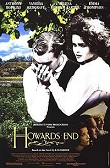
On Mar. 13, 1992 Ismail Merchant's and James Ivory's Howards End (Merchant Ivory Productions) debuts, based on the 1910 E.M. Forster novel, starring Emma Thompson and Helena Bonham Carter as freethinking English Schlegel sisters Margaret and Helen, who hook up with the wealthy conservative Wilcoxes (Vanessa Redgrave as Ruth and Anthony Hopkins as Henry) and low class Howard Bast (Samuel West), and suffer through the bast, er, Mr. Wilcox's attempts to thwart the bequest of Howards End estate to Margaret; does $26.1M box office on an $8M budget.
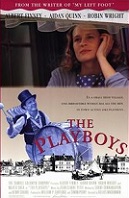
On Apr. 22, 1992 Gillies MacKinnon's The Playboys (Samuel Goldwyn Co.) debuts, starring Robin Wright as unwed Irish mother Tara in 1957, who is courted by Albert Finney as Sgt. Hegarty, and Aidan Quinn as Tom, part of a travelng troupe of actors called you know what; does $4.9M box office.

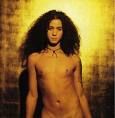
On Sept. 2, 1992 Neil Jordan's The Crying Game (Channel Four Films) debuts, based on the 1931 short story "Guests of the Nation" by Frank O'Connor, and whose title is based on a top-5 British hit of 1964 (played in 3 versions, incl. one by Boy George), starring Stephen Rea as IRA gunman Fergus, who kidnaps black British soldier Jody (Forest Whitaker) and befriends him, then lets him go after being ordered to kill him, only to see him get run over by his own troops, then sets out to find his girlfriend Dil, played by U.S.-born Jaye Davidson (Alfred Amey) (1968-), whom he falls in love with until she wipes off her mouth, takes off her clothes, and shows him her dick, never mind the white-black thang?; one of the seminal movie experiences of the dickade?; does $62.5M box office U.S. and £2M U.K. on a £2.3M budget; watch trailer.
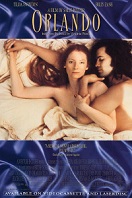
In Sept. 1992 Sally Potter's Orlando (Sony Pictures) debuts, based on the 1928 Virginia Woolf gender-bender novel and filmed in Khiva, Uzbekistan and its 18th cent. Djuma Mosque, starring Tilda Swinton as gender-switching longevity champ Orlando, Quentin Crisp as Elizabeth I, and Billy Zane as Marmaduke Bonthrop Shelmerdine, with music by gay composer Jimmy Somerville, who appears in a cameo as an angel; does $5.3M box office on a $4M budget; watch trailer.

On Dec. 18, 1992 Richard Attenborough's Chaplin (Carolco Pictures) (TriStar Pictures) debuts, based on Chaplin's autobio. and David Robinson's "Chaplin: His Life and Art", starring Robert Downey Jr. (after Robin Williams, Billy Crystal, and Jim Carrey are passed over) as Charlie Chaplin, Geraldine Chaplin as his mother Geraldine, Paul Rhys as his half-brother Sydney, Milla Jovovich as his 1st wife Mildred Harris, Marisa Tomei as Mabel Norman, Dan Aykroyd as producer Mack Sennett, Kevin Kline as actor Douglas Fairbanks Sr., Penelope Ann Miller as actress Edna Purviance and Kevin Dunn as J. Edgar Hoover; music score by John Barry; does $9.5M box office on a $31M budget.
In 1992 Kudos film and TV production co. is founded in London, England, going on to produce the BBC-TV spy drama "Spooks" (MI5) (2002-11), the TV series "Tin Star", and the films "Meeting People Is Easy" (1998), "Among Giants" (1998), "Pure" (2002), "Eastern Promises" (2007), "Miss Pettigrew Lives for a Day" (2008), "The Crimson Wing" (2008), "Death of a Ladies Man" (2009), "Brighton Rock" (2010), "Salmon Fishing in the Yemen" (2011), and "Spooks: The Greater Good" (2015);; in 2007 it is acquired by the Shine Group, which in 2011 is acquired by News Corp. (later 21st Cent. Fox).
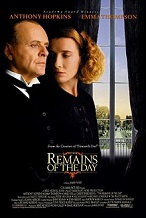
On Nov. 5, 1993 Ismail Merchant's and James Ivory's The Remains of the Day (Columbia Pictures) debuts, based on the E.M. Forster, er, 1989 Kazuo Ishiguro novel, starring Anthony Hopkins as perfect English butler Stevens, who prefers to wank off rather than betray his unworthy Nazi-leaning master Lord Darlington (James Fox), freaking out lonely and comely housekeeper Miss Sarah "Sally" Kenton (Emma Thompson) with his total inability to say cheese or make a pass or grab or get a stiffy for her; does $64M box office on a $15M budget; Christopher Reeve plays U.S. Rep. Jack Lewis; Hugh Grant plays Darlington's godson Regnald Cardinal - takes a gay dir. to pull this one off well?

On Jan. 20, 1994 Mike Newell's Four Weddings and a Funeral debuts, starring 32-timer Andie MacDowell (after Melanie Griffith and Brooke Shields turn down the role) as single Am. babe Carrie, and Hugh Grant as terribly English 9-timer bachelor Charles, who takes too long for his own wedding; features Rowan Atkinson as an Anglican priest; nobody seems to have a job or career?; "Fuck-a-doodle-do"; "Bugger, bugger, bugger, bugger"; grosses $245.7M worldwide and $52.7M in the U.S., becoming the highest-grossing British film (until ?), rocketing Grant (the English Clark Kent sans Superman side?) to internat. stardom (he had been about to give up acting when he got the part?).
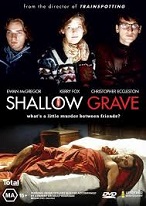
On May 17, 1994 Danny Boyle's Shallow Grave (Film4) (Gramercy Pictures) (PolyGram Entertainment) debuts, a British black comedy crime film starring Kerry Fox as physician Juliet Miller, who shares a flat in Edinburgh with accountant David Stephens (Charistopher Eccleston) and journalist Alex Law (Ewan McGregor), accepting new roommate Hugo (Keith Allen), who ends up dead in his room with a suitcase full of money, causing them to hatch a plot to dismember the body and bury it in the woods in a you know what and keep the money, only to end up being hunted by Hugo's associates, killing them then turning on each other; does $198M box office on a $2.5M budget; the dir. debut of English dir. Danny Boyle (1956-); watch trailer.
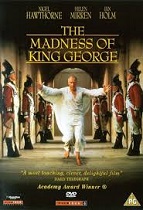
On Dec. 28, 1994 Nicholas Hytner's The Madness of King George (Samuel Goldwyn Co.) debuts, based on the Alan Bennett play, becoming the feature film debut of Tony Award winner ("Miss Saigon", "Carousel") Nicholas Hytner, starring Nigel Hawthorne as George III, Helen Mirren as Queen Charlotte, and Ian Holm as Dr. Willis; does $15.2M box office; watch trailer; watch movie.
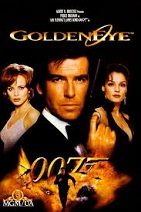
On Nov. 13, 1995 Martin Campbell's GoldenEye (Eon Productions) (MGM/UA) (United Pictures Internat.) debuts, (James Bond 007 film #17) (named after Iam Fleming's Jamaica estate) becoming the return after six years for British agent 007, played by too effeminate, chicken-legged, and tongue-in-you-know-what (Irish not British or Scot) (but better than colorless Timothy Dalton) Pierce Brendan Brosnan (1953-) (whose contract prohibits him from wearing a tuxedo in non-007 films); Judi Dench plays a new PC M; Sean Bean plays bad guy Alec Trevelyan slash Janus; the only good things are Bond wet dream girls Xenia Onatopp (Famke Janssen) and Natalya Simonova (Izabella Scorupco); #9 movie of 1995, grossing $99M in the U.S. and $352M worldwide; the GoldenEye Theme is sung by Tina Turner.

On Feb. 23, 1996 Danny Boyle's Trainspotting (PolyGram Pictures) debuts, written by John Hodge based on the 1993 Irvine Welsh novel set in late 1980s depressed Edinburgh, a black comedy starring Ewan McGregor as Mark "Rent Boy" Renton, a Scottish heroin addict who tries to give it up; also stars Ewen Bremner as dim Daniel "Spud" Murphy, Jonny Lee Miller as Sean Connery wannabe Simon "Sick Boy" Williamson, Kevin McKidd as curious clean athlete Thomas "Tommy" MacKenzie, Robert Carlyle as psycho Francis "Franco" Begbie, and Kelly Macdonald as Renton's 15-y.-o. girlfriend Diane Coulston; Welsh plays drug dealer Mikey Forrester; does $72M U.S. box office on a £1.5M budget; watch trailer; watch movie.
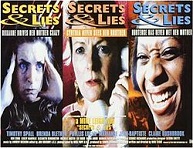
In May 1996 Mike Leigh's Secrets & Lies (Thin Man Films) (Film Four Distributors) (October Films) debuts, starring Camberwelll, London-born Marianne Ragipcien Jean-Baptiste (1967-) as Hortense Cumberbatch, an educated middle-class black London optometrist who traces her family history to working-class white mother Cynthia Rose Purley, with a dysfunctional family incl. brother and sister-in-law Maurice Purley (Timothy Spall) and Monica Purley (Phyllis Logan); does $13.4M box office on a $4.5M budget; Jean-Baptiste becomes the first black British actress nominated for an Oscar; watch trailer.
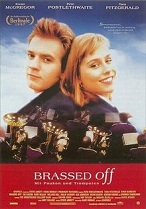
On Nov. 1, 1996 Mark Herman's Brassed Off (Channel Four Films) (Miramax Films) debuts, set in Grimley (really Grimethorpe) 10 years after the 1984-5 mineworkers strike in Britain in which they were you know what, starring Ewan McGregor and Tara Fitzgerald as brass band players Andy Barrow (tenor horn) and Gloria (flugelhorn), who fall in love; Pete Postlethwait plays Danny Ormondroyd; Jim Carter plays euphonium player Harry; does £3M box office on a £2.8M budget; watch clip.
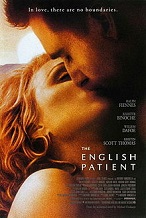
On Nov. 15, 1996 Anthony Minghella's The English Patient (Miramax Films) debuts, based on the 1992 novel by Michael Ondaatje, starring Ralph Fiennes as dying WWII burn patient Count Laszlo Almasy, who is taken care of by hot French-Canadian nurse Hana (Juliette Binoche) in an abandoned monastery in Tuscany while he reminisces about his lost love Katharine Clifton (Kristin Scott Thomas), whom he stole from fellow cartographer Geoffrey Clifton (Colin Firth); meanwhile British bomb disposal expert Kip (Naveen Andrews) (a sexy Sikh) falls in love with Hana, and thief-spy David Caravaggio (Willem Dafoe) arrives with a private score to settle with Almasy; does $232M box office on a $27M budget.
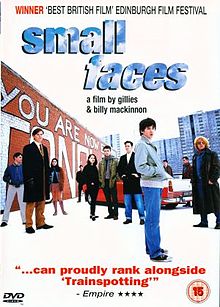
In 1996 Gillies MacKinnon's Small Faces (Evergreen Entertainment) debuts, about the Tongs teenie gang in 1960s Glasgow, starring Iain Robertson, Joseph McFadden, Kevin McKidd, Steven Duffy et al.; "can proudly rank alongside Trainspotting" (Empire); watch trailer.
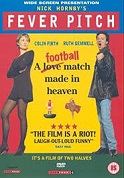
On Apr. 4, 1997 David Evans' Fever Pitch (Channel 4 Films) debuts, based on the 1992 Nick Hornby autobio. novel, starring Colin Firth as English North London teacher Paul Ashworth, whose obsession with the Arsenal soccer team gets in the way of his relationship with his teacher babe Sarah Hughes (Ruth Gemmell); features the May 26, 1898 title match with Liverpool along with the last-min. goal by Michael Thomas that secured their 2-0 win.
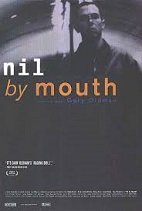
On May 8, 1997 Gary Oldman's Nil by Mouth (20th Cent. Fox) debuts, about a dysfunctional family living in South East London, England, starring Ray Winstone as Raymond, abusive husband of Valerie (Kathy Burke), and her drug addict brother Billy (Charlie Creed-Miles); Oldman's debut as writer and dir.; features a record 82 usages of the word "cunt" (until ?), and a record 428 uses of the word "fuck" (until "Summer of Sam" in 1999); does $266K box office on a $9M budget; watch trailer.
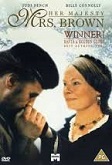
On July 18, 1997 John Madden's (Her Majesty,) Mrs (Mrs.) Brown (Buena Vista Internat.) (Miramax) debuts, starring Judi Dench as Queen Victoria, and over-the-top-Scottish Billy Connolly as her Scot-Scot-Scottish manservant John Brown, who forces Anthony Sher to play an even more over-the-top Disraeli; does $9.2M box office; watch trailer.
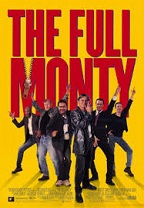
On Aug. 29, 1997 Peter Cattaneo's The Full Monty (Channel Four Films) (Fox Searchlight Pictures) debuts, a British comedy film set in 1972 Sheffield, England, about six unemployed steel workers incl. Gary "Gaz" Schofield (Robert Carlyle), Dave Horsefall (Mark Addy), Nathan Schofield (WIlliam Snape), Lomper (Steve Hulson), Gerald Athur Cooper (Tom Wilkinson), and Barrington "Horse" Mitchell (Paul Barber) who decide to strip for money, one-upping the Chippendales by going "the full monty"; does $258M box office on a $3.5M budget; watch trailer.
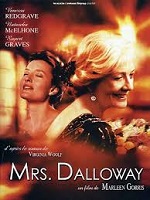
On Sept. 4, 1997 Marleen Gorris' Mrs (Mrs.) Dalloway (First Look Pictures) (BBC Films) debuts, based on the 1925 Virginia Woolf novel, starring Vanessa Redgrave as Mrs. Clarissa Dalloway, and Natascha McElhone as young Clarissa.
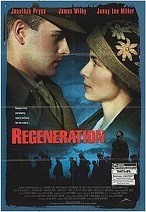
On Nov. 21, 1997 Gillies MacKinnon's Regeneration (Behind the Lines) is about British army officers at Craiglockhart War Hospital in WWI, starring Jonathan Pryce as Capt. William Rivers, James Wilby as 2nd Lt. Siegfried Sassoon, Jonny Lee Miller as 2nd Lt. Billy Prior, Stuart Bunce as 2nd Lt. Wilfred Owen, Tanya Allen as Sarah, and Dougray Scott as Capt. Robert Graves; watch trailer.
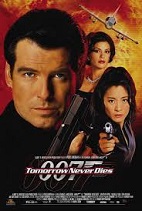
On Dec. 9, 1997 Roger Spottiswoode's Tomorrow Never Dies (Eon Productions) (MGM) (United Artists) (United Internat. Pictures) debuts (James Bond 007 film #18), starring Pierce Brosnan as James Bond, and Jonathan Pryce as bad guy media baron Elliot Carver, who tries to engineer WWIII so he can get exclusive coverage; Michelle Yeoh and Teri Hatcher sex the lame flick up as Col. Wai Lin and Paris Carver; too bad, it opens on the same day as "Titanic", hurting its box office; does $333M box office on a $110M budget; the best thing is the cool Tomorrow Never Dies Theme by Moby.
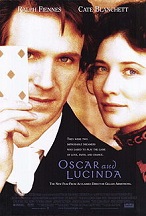
On Dec. 31, 1997 Gillian Armstrong's Oscar and Lucinda (Dec. 31) (AFFC) (Fox Searchlight Pictures), based on the 1988 Peter Carey novel stars Ralph Fiennes and Cate Blanchett as ex-Plymouth Brethren Anglican priest Oscar Hopkins and teenie Australian heiress Lucinda Leplastrier, who wants to build a church out of glass; does $4.9M box office on a $16M Australian budget; watch trailer.
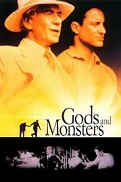
On Jan. 21, 1998 Bill Condon's Gods and Monsters (BBC Films) (Lions Gate Films) debuts, starring Ian McKellen as aging "Frankenstein" and "Bride of Frankenstein" dir. James Whale, who asks his handsome stud gardener Clayton Boone (Brendan Fraser) to model for him, not telling him that he's gay until it's too late; Lynn Redgrave plays Whale's maid Lynn Redgrave; Rosalind Ayres plays Elsa Lanchester; does $6.5M box office on a $10M budget; watch trailer.
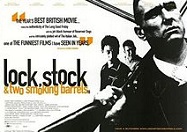

On Aug. 28, 1998 Guy Ritchie's Lock, Stock and Two Smoking Barrels (HandMade Films) (SKA Films) (PolyGram) debuts, a comedy crime film starring Nick Moran as genius card shark Eddy, who loses £500,000 to mob boss "Hatchet" Harry Lonsdale (P.H. Moriarty), causing him and his partners Tom (Jason Flemyng), Soap (Dexter Fletcher), and Bacon (Jason Statham) (former diver) to plan to rob a small-time gang that lives next door; co-stars Vinnie Jones (former Welsh soccer star) as Harry's debt collector Big Chris; does $28M box office on a $1.35M budget; the dir. debut of Hatfield, Hertfordshire-born Guy Stuart Ritchie (1968-); watch trailer.
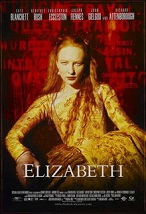
On Sept. 8, 1998 Shekhar Kapur's Elizabeth (PolyGram) (Working Title Films) debuts, starring Cate Blanchett as British Virgin Queen Elizabeth I in her years of struggle; also stars Kathy Burke as Mary I, Geoffrey Rush as Sir Francis Walsingham, Joseph Fiennes as her beau Robert Dudley, Richard Attenborough as Sir William Cecil, Fanny Ardant as Mary of Guise, Vincent Cassel as Duke Henry of Anjou, and gay John Gielgud as Pope Pius V; "I am married to England"; pisses-off the Catholic League for Religious and Civil Rights for alleged anti-Catholicism, making it more popular?; does $82.1M box office on a $30M budget; watch trailer.
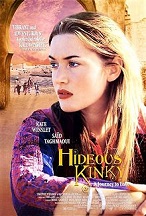
On Oct. 2, 1998 Gillies MacKinnon's Hideous Kinky (BBC) (Arts Council of England) debuts, based on the 1992 Esther Freud novel, starring Kate Winslet as an English mother with two daughters Lucy (Carrie Mullan) and Bea (Bella Riza), who moves to Morocco and hooks up with con man acrobat Bilal (Said Taghmaoui); features rock music from the 1960s incl. Richie Havens, Canned Heat, the Incredible String Band, and Jefferson Airplane; "It's not just an adventure... It's a love affair"; watch trailer.
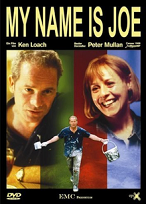
On Nov. 20, 1998 Ken Loach's My Name Is Joe debuts, starring Peter Mullan as unemployed alcoholic Joe Kavanagh in Glasgow, Scotland, who joins Alcoholic Anonymous and hooks up with rehabilitation worker Sarah Downie (Louise Goodall); David McKay plays Joe's friend Liam; watch trailer.

On Dec. 3, 1998 John Madden's Shakespeare in Love (Universal Pictures) debuts, written by Tom Stoppard and Marc Norman, starring Joseph Fiennes as William Shakespeare, who falls for hot babe Viola De Lesseps (Gwyneth Paltrow), and writes "Romeo and Juliet" for her, while she dresses as a man to act in it, and rival theater owner Philip Henslow (Geoffrey Rush) closes in; Colin Firth plays Viola's fiance the Earl of Wessex, a title that went defunct in 1066, causing Prince Edward to ask Elizabeth II to give it to him; Judi Dench plays Queen Elizabeth I; does $289.3M box office on a $25M budget; watch trailer.
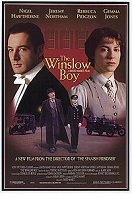
On Apr. 16, 1999 David Mamet's The Winslow Boy (Sony Pictures Classics), based on the 1946 Terence Rattigan play, starring Nigel Hawthorne as Arthur Winslow, Rebecca Pidgeon as Catherine Winslow, Guy Edwards as Ronnie Winslow, Gemma Jones as Grace Winslow, Matthew Pidgeon as Dickie Winslow, and Jeremy Northam as Sir Robert Morton; watch trailer; watch clip.
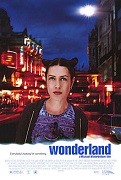
On May 13, 1999 Michael Winterbottom's Wonderland (USA Films) debuts, written by Lauence Corlat, about a London family over a Guy Fawkes Night weekend, starring Shirley Henderson as Debbie, Gina McKee as Nadia, Molly Parker as Molly, Ian Hart as Dan, John Simm as Eddie, Stuart Townsend as Tim, and Kika Markham as Eileen; "A modern-day London turn on Chekhov's 'The Three Sisters'." (New York Times); watch trailer.
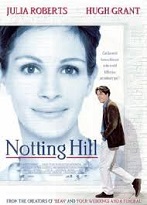
On May 21, 1999 Roger Michell's Notting Hill (PolyGram) (Workng Title Films) (Universal Pictures) debuts, written by "Four Weddings and a Funeral" writer Richard Curtis, starring Hugh Grant as divorced London bookshop owner William "Will" Thacker, and Julia Roberts as Hollywood star Anna Scott, who hooks up with him at his shop; the single When You Say Nothing at All by Ronan Keating becomes an internat. #1 hit; does $363.9M box office on a $43M budget; watch trailer.
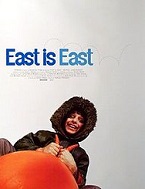
On Nov. 5, 1999 Darrien O'Donnell's East Is East (FilmFour) (Miramax Films) debuts, based on the 1996 play by Ayub Khan-Din, starring Om Puri as Pakistani Muslim Zaheed "George" Khan, who has lived in England since 1937 and is obsessed with the 1971 Bangladesh Liberation War, and is freaked that his children are giving up the Pakistani lifestyle to go British; Linda Bassett plays George's wife Ella Khan; does £10M box office on a £1.9M budget; watch trailer.
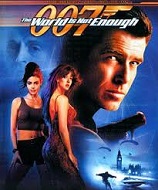
On Nov. 8, 1999 Michael Apted's The World Is Not Enough (Eon Productions) (MGM) (United Internat. Pictures) debuts (James Bond 007 film #19), based on the Bond family motto "Orbis non sufficit", starring Pierce Brosnan as James Bond, Sophie Marceau as oil heiress Elektra King, Robert Carlyle as pain-free Renard, and miscast Denise Richards as nuclear physicist Dr. Christmas Jones, who wears a tank top and hot pants to work, stinking Bond girls up?; the The World Is Not Enough Theme Song is performed by Garbage; takes in $361M box office on a $135M budget, becoming the highest grossing Bond film to date; "I always wanted to have Christmas in Turkey" (Bond).
In 1999 the British Film Inst. pub. the BFI List of the Top 100 British Films of the 20th Century, with David Lean being the most popular dir., followed by Michael Powell/Emeric Pressburger, John Schlesinge, Alexander Mackendrick, and Tony Richardson (no female dirs.); most popular actor is Alec Guinness, followed by Michael Caine; most popular actress is Julie Christie.
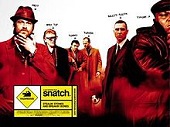
On Aug. 23, 2000 Guy Ritchie's Snatch (SKA Films) (Columbia Pictures) (Screen Gems) debuts, attempting to channel Quentin Tarantino with a Cockney accent, complete with an intricate double plot featuring numerous ironic plot twists, starring Benicio del Toro as gambler-thief Franky "Four-Fingers", who steals an 86-carat diamond in Antwerp and goes to London to see fence Doug "the Head" on behalf of New York City gangster Abraham Denovitz (Dennis Farina); meanwhile boxing promoter Turkish talks gangster Brick Top into putting boxer Gorgeous George in a match with One Punch Mickey "Pikey" O'Neill (Brad Pitt), who is paid to throw the fight but KOs his opponent with one punch; also Rade Serbedzija as arms dealer Boris "the Blade" Yurinov, and Vinnie Jones as bounty hunter Bullet-Tooth Tony; "Now, dicks have drive and clarity of vision, but they are not clever. They smell pussy and they want a piece of the action. And you thought you smelled some good old pussy, and have brought your two little mincey faggot balls along for a good old time. But you've got your parties muddled up. There's no pussy here, just a dose that'll make you wish you were born a woman. Like a prick, you are having second thoughts. You are shrinking, and your two little balls are shrinking with you. And the fact that you've got 'Replica' written down the side of your guns"; does $83.6M box office on a $10M budget; watch trailer.
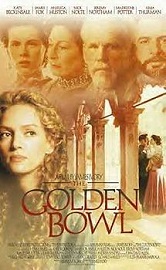
On Sept. 13, 2000 James Ivory's and Ismail Merchant's The Golden Bowl (Lionsgate) debuts, based on the 1904 Henry James novel, starring Jeremy Northam as Italian Prince Amerigo, who marries Maggie (Kate Beckinsale), daughter of U.S. billionaire Adam Verver (Nick Nolte), even though he really wants poor looker Charlotte Stant (Uma Thurman), but is hooked up by Maggie with her daddy; James Fox plays English col. Bob Assingham, and Anjelica Huston plays Fanny Assingham; does $5.7M box office on a $15M budget - meet Bob and Fanny Assingham?
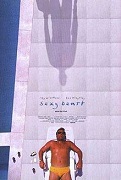
On Sept. 13, 2000 Jonathan Glazer's Sexy Beast (Film Four) (Fox Searchlight Pictures) debuts, starring Ray Winstone as safecracker Gary "Gal" Dove, who is released from priz after nine years and moves to Spain with his new ex-ho wife DeeDee Dove (Amanda Redman) to enjoy the retired life, only to be followed by London underworld recruiter Don Logan (Ben Kingsley), wh drags him back into the mess along with crime lord Teddy Bass (Ian McShane) and bisexual banker Harry (James Fox); does £31.76M box office on a £4.M budget; Glazer's dir. debut

On Apr. 13, 2001 Sharon Maguire's Bridget Jones's Diary (Universal Pictures) debuts, based on the 1996 Helen Fielding novel, starring Renee Zellweger as 32-y.-o. single Jones (who gains 20 lbs. for the role), Colin Firth as her boss Daniel Cleaver, and Hugh Grant as Mark Darcy, whom Bridget overhears telling his mother that she is "a verbally incontinent spinster who smokes like a chimney, drinks like a fish, and dresses like her mother", causing her to try to turn her life around, starting a you know what and discovering that he's her "true love"; does $282M box office on a $25M budget.
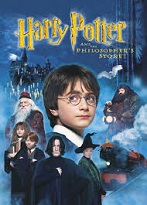
On Nov. 4, 2001 Chris Columbus' Harry Potter and the Philosopher's Stone (Warner Bros.), based on the 1997 J.K. Rowling novel is a box office smash with the kiddie set; stars Daniel Radcliffe as Harry Potter, Rupert Grint as Ron Weasley, Emma Watson as Hermione Granger, John Cleese as Nearly Headless Nick, Robbie Coltrane as Rubeus Hagrid, Warwick Davis as Filius Flitwick, Richard Griffiths as Vernon Dursley, Richard Harris as Albus Dumbledore, Ian Hart as Quirinus Quirrell, John Hurt as Mr. Ollivander, Alan Rickman (after Tim Roth turns it down for "Planet of the Apes") as Severus Snape, Fiona Shaw as Petunia Dursley, Maggie Smith as Minerva McGonagall, and Julie Walters as Molly Weasley; the #1 movie of 2001 ($318M U.S. and $974.8M worldwide box office on a $125M budget); followed by "Harry Potter and the Chamber of Secrets" (2002), "Harry Potter and the Prisoner of Azkaban" (2004), "Harry Potter and the Goblet of Fire" (2005), "Harry Potter and the Order of the Phoenix" (2007), "Harry Potter and the Half-Blood Prince" (2009), and "Harry Potter and the Deathly Hallows" (2010/2011).
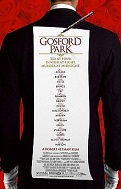
On Nov. 7, 2001 Robert Altman's Gosford Park (Shepperton Studios) (Capitol Films) (USA Films) debuts, an Agathie Christie-style whodunit set in 1932 in a wealthy English estate, written by Julian Fellowes, starring Maggie Smith, Kelly Macdonald, Jeremy Northam, Bob Balaban, Ryan Philippe, Kristin Scott Thomas, and Michael Gambon; music by Patrick Doyle; does $87.8M box office on a $19.8M budget; watch trailer.
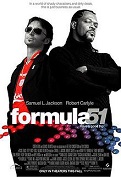
On Dec. 7, 2001 Ronny Yu's The 51st State (Formula 51) (Momentum Pictures) (Alliance Atlantis) debuts, starring Samuel L. Jackson as Am. chemist Elmo McElroy, who invents the hot new drug POS 51 and tries to score a once-in-a-lifetime drug deal in Liverpool until things go wrong; does $14.4M box office on a $27M budget; watch trailer.
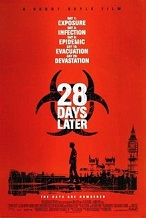
On Nov. 1, 2002 28 Days Later (DNA Films) (U.K. Film Council) (Fox Searchlight Pictures) debuts, about a post-apocalyptic world where a zombie-making virus has spread, becoming a hit and reinvigorating the zombie horror film genre; "Day 1: Explosion; Day 3: Infection; Day 8: Epidemic; Day 15: Evacuation: Day 20: Devastation"; does $85M box office on an $8M budget; followed by "28 Days Later" (2007); watch trailer.
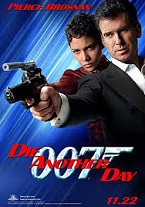
On Nov. 20, 2002 (40th anniv. of "Dr. No") Lee Tamahori's Die Another Day (Eon Productions) (MGM) (20th Cent. Fox) debuts (James Bond 007 film #20), starring Pierce Brosnan as James Bond (4th and last time), Halle Berry as Giacinta "Jinx" Johnson, Rosamund Pike (Oxford friend of Chelsea Clinton) in her film debut as double-agent temptress Miranda Frost, and Toby Stephens as bad guy Gustav Graves/Col. Moon; does a record $431.97M box office on a $142M budget; the Die Another Day Theme is sung by Madonna.
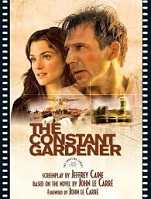
On Aug. 31, 2005 Fernando Meirelles' The Constant Gardener (Focus Features) debuts, written by Jeffrey Caine based on the 2001 John le Carre novel, starring Ralph Fiennes as British diplomat Justin Quayle, whose young activist wife Tessa (Rachel Weisz) is murdered in the veldt near Lake Turkana in Kenya, causing her black driver Arnold Bluhm (Hubert Kounde) to be suspected, until he turns out to be gay and murdered also, leading to a conspiracy involving sinister drug co. KHA Pharamaceuticals; "Love, at any cost"; does $82.5M box office on a $25M budget.
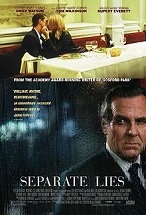
On Sept. 16, 2005 Julian Fellowes' Separate Lies (Fox Searchlight Pictures) debuts, based on the 1951 novel "A Way Through the Wood" by Nigel Balchim and the 1957 play "Waiting for Gillian", starring Tom Wilkinson as wealthy London doctor James Manning, and Emily Watson as his trophy wife Anne, who welcome bad apple William "Bill" Bule (Rupert Everett) into their happy lives.
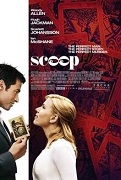
On July 28, 2006 Woody Allen's Scoop (BBC Films) (Focus Features) debuts, starring Scarlett Johansson as Sondra Pransky, an Am. journalism student in London who scoops a big story on the Tarot Card Killer serial ho murderer and has a fling with the suspect, aristocrat Peter Lyman (Hugh Jackman); Allen plays magician Sid Waterman "the Great Splenidini"; does $39M box office on a $4M budget.
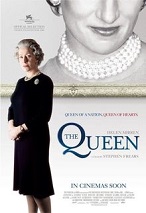
On Sept. 2, 2006 Stephen Frears' The Queen (Granada Productions) (Pathe Pictures) debuts, about the stiff royal reaction to Princess Diana's Aug. 31, 1997 death and the public's rage at the perceived lack of sympathy, causing the queen to stump to save the monarchy, starring Helen Mirren as Elizabeth II, James Cromwell as Prince Philip, Michael Sheen as Tony Blair, Helen McCrory as Cherie Blair, Sylvia Syms as the Queen Mother, and Alex Jennings as Prince Charles; does £77.9M box office on a £9.8M budget.

On Sept. 27, 2006 Kevin Macdonald's The Last King of Scotland (Fox Searchlight Pictures) debuts, starring Forrest Whitaker as man-boy-devil Idi Amin Dada, dictator of Uganda during the 1970s; James McAvoy plays Scottish physician Nicholas Garrigan, whom Amin takes under his wing because his time in the British army taught him to love all things Scottish as symbolic of resistance against the "British conqueror"; Garrigan falls for Amin's charm, then guess what?; the movie is run, manned, and acted by real Scots, and filmed in Uganda, making for an interesting dir.'s cut?; does $48.4M box office on a $6M budget; "We've got no monkeys in Scotland."
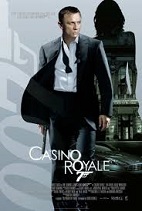

On Nov. 14, 2006 Martin Campbell's Casino Royale (Eon Productions) (Stillking Films) (Babelsberg Film) (MGM) (Columbia Pictures) debuts (James Bond 007 film #21), a reboot of the series, starring working class-looking Daniel Wroughton Craig (1938-) as James Blond, er, Bond, before he gets his 007 license, and Dame Judi Dench as M; Mads Mikkelsen plays the villain Le Chiffre, whom Bond must stop from winning a high stakes Texas Hold 'Em poker tournament at Casino Royale in Montenegro; doll-faced Eva Green stars as treasury agent Vesper Lynd (West Berlin); highest-grossing Bond film so far, taking in $167M in the U.S. (#10 movie of 2006), and $600M worldwide on a $150M budget; too bad, this new PC Bond is all about running fast and jumping high, and turns into an Alan Alda sensitive guy with women, complete with a woman boss, and literally gets his nuts cracked at the end and kind of wusses out for awhile, finally emerging looking bitter and damaged; the theme is You Know My Name, sung by Chris Cornell; followed by "Quantum of Solace" (2008), "Skyfall" (2012), and "Spectre" (2015).
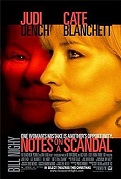
On Dec. 25, 2006 Richard Eyre's Notes on a Scandal (Fox Searchlight Pictures) debuts, based on the 2003 Zoe Heller novel, starring Cate Blanchett as Sheba Hart, and and Judi Dench as Barbara Covett, a young and an old teacher in London, who have a sick pseudo-lez affair while Sheba hooks up with 15-y.-o. student Steven Connolly (Andrew Simpson) and gets them both in trouble; soundtrack by Philip Glass; does $49.8M box office on a $15M budget.
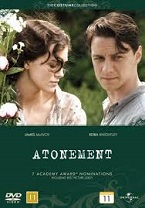
On Aug. 29, 2007 Joe Wright's Atonement (StudioCanal) (Relativity Media) (Working Title Films) (Focus Features), based on the 2001 Ian McEwan novel stars Saoirse Ronan (1994-) as 13-y.-o. Briony Tallis, who accuses the lover Robbie Turner (James McAvoy) of her older sister Cecilia (Keira Knightley) of a sex crime he didn't commit, ruining both of their lives, ending up writing a novel as a you know what; Dario Marianelli wins a best original score Oscar; does $129.3M box office on a $30M budget; "Joined by love, separated by fear, redeemed by hope"; watch trailer.

On Jan. 22, 2008 James Marsh's Man on Wire (BBC Storyville) (Discovery Films) (UK Film Council) (Magnolia Pictures), based on his book "To Reach the Clouds" debuts, a documentary about 1974 WTC tightrope walker Philippe Petit; does $5.3M box office on a $1.9M budget; "There is no why" (Petit); watch trailer.
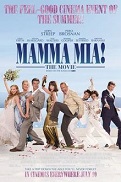
On June 30, 2008 Phyllida Lloyd's Mamma Mia! (Relativity Media) (Universal Pictures), written by Catherine Johnson debuts, a musical based on songs by ABBA and named after their 1975 hit, starring Amanda Seyfried as bride-to-be Sophie Sheridan, who invites three of her mother Donna's (Meryl Streep) former beaus to her wedding on Kalokairi Island in Greece hoping to ID one as her father, either Sam Carmichael (Pierce Brosnan), Harry Bright (Colin Firth), or Bill Anderson (Stellan Skarsgard); grosses $615.7M worldwide on a $52M budget, becoming the 5th highest grossing film of 2008, highest grossing musical until ?), and the most commercially successful British film (until ?); watch trailer.

On Aug. 30, 2008 Danny Boyle's Slumdog Millionaire (Film4) (Warner Bros.) (Celador Films) debuts, written by Simon Beaufoy based on the 2005 novel "Q&A" by Vikas Swarup, starring English-born Dev Patel (1990-) in his film debut as Mumbai slumdog Jamal Malik, who faces long odds to go all the way to 20M rupees on the Indian version of "Who Wants to Be a Millionaire?" to save his childhood sweetheart Latika (played by Rubina Ali and Freida Pinto), and ends up in trouble with the police in a complex story with flashbacks of his horrible childhood; the show's MC Prem Kumar is played by Anil Kapoor; after he proves to the police that he didn't cheat because every answer came from a life experience, the lovers do a Bollywood dance at the C.S.T. train station to the song Jai Ho; does $377.9M box office on a $15M budget; on Apr. 22, 2009 allegations that Rafiq Qureshi attempted to sell his 9-y.-o. daughter Rubina Ali (1999-) for $300K are dropped; on May 14, 2009 the home of 10-y.-o. star Azharuddin Mohammed Ismail (1999-) is bulldozed for pre-monsoon control.
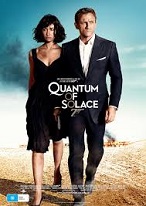
On Oct. 29, 2008 Marc Forster's Quantum of Solace (Eon Productions) (MGM) (Columbia Pictures) debuts (James Bond 007 film #22), the 2nd starring Daniel Craig, a sequel to the 1953 novel "Casino Royale", in which Bond battles Dominic Greene (Mathieu Amalric), a member of the evil Quantum org., who poses as an environmentalist to stage a coup in Bolivia and take control of its water supply, with the help of MI6 agent Strawberry Fields (Gemma Arterton); meanwhile Bond seeks revenge for his babe Vesper Lynd ("West Berlin") (Eva Green) (only woman other than future wife Tracy to whom he proposes), while his loyalty is questioned by M; does $586M box office on a $200M budget, incl. $70M office on opening weekend; the Quantum of Solace Theme is performed by Jack White and Alicia Keys.
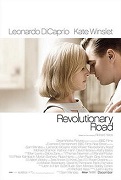
On Dec. 15, 2008 Sam Mendes' Revolutionary Road (DreamWorks Pictures) (BBC Films) debuts, based on the 1961 Richard Yates novel, starring Leonardi Di Caprio and Kate Winslow as salesman Frank Wheeler and his wife April, who live at 115 Revolutionary Road in Conn., where their dream marriage crumbles; does $75.2M box office on a $35M budget.
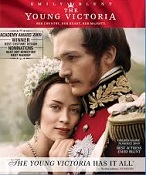
On Mar. 6, 2009 Jean-Marc Vallee's The Young Victoria (GK Films) (Momentum Pictures) debuts, starring Emily Blunt as Queen Victoria, and Rupert Friend as Prince Albert, featuring authentic costumes and sets; Jim Broadbent plays William IV; Paul Bettany plays Lord Melbourne; Michael Maloney plays Sir Robert Peel; Mark Strong plays Sir John Conroy; Miranda Richardson plays the Duchess of Kent; Thomas Kretschmann plays Leopold I of Belgium; does $27.4M box office on a $35M budget.
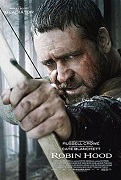
On May 12, 2010 Ridley Scott's Robin Hood (Imagine Entertainment) (Universal Pictures) debuts, starring Russell Crowe as Robin Longstride, Cate Blanchett as Marion Locksley, Max von Sydow as her father Sir Walter Locksley, Mark Addy as Friar Tuck, Oscar Isaac as nutso Prince John, and Danny Huston as his older brother Richard the Lionheart; does $321.7M box office on a $200M budget.
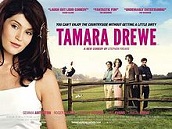
On May 18, 2010 Stephen Frears' Tamara Drewe (BBC Films) (Momentum Pictures) debuts, based on the Moira Buffini comic strip and Thomas Hardy's novel "Far from the Madding Crowd", set in Ewedown, Dorset, England, about young journalist Tamara Drewe (Gemma Arterton), who gets a nose job and returns to her hometown to sell her dead mother's house, turning on the local men incl. Andy Cobb (Luke Evans), Ben Sergeant (Dominic Cooper), and Nicholas Hardiment (Roger Allam), who is killed by stampeding cows; does $11.9M box office on a £6M budget.

On Sept. 6, 2010 Tom Hooper's The King's Speech (U.K. Film Council) (Momentum Pictures) debuts, written by David Seidler, starring miscast Colin Firth as English king George VI (Prince Albert, Duke of York), and Geoffrey Rush as Australian speech therapist Lionel Logue, who helps him overcome his stuttering p-p-problem; Helena Bonham Carter plays Queen Elizabeth (Duchess of York), Guy Pearce plays Edward VIII (Prince Edward of Wales), and Timothy Spall plays PM Winston Churchill; does $414.2M box office on a $15M budget; first release of See-Saw Films and Bedlam Productions of London, England.

On Mar. 12, 2011 Joe Cornish's Attack the Block (Film4 Productions) (StudioCanal) (UK Film Council) (Screen Gems) debuts, about a teenie street gang in South London on Guy Fawkes Night defending themselves from aliens from outer space, starring John Boyega as Moses, Alex Esmail as Pest, Franz Drameh as Dennis, Leeon Jones as Jerome, and Jodie Whitaker as nurse Samantha Adams; does £4.1M box office on an £8M budget; watch trailer.
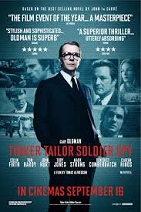
On Sept. 5, 2011 Tomas Alfedson's Tinker Tailor Soldier Spy (StudioCanal) (Working Title Films) (Focus Features) debuts, based on the 1974 John le Carre novel, starring Gary Oldman as George Smiley (Beggarman), who is forced to retire in Oct. 1973 after agent Jim Prideaux (Mark Strong) is sent to Budapest to meet a defecting Hungarian gen. and is captured, causing Percy Alleline (Tinker) (John Hurt) to become the new Control, with Bill Haydon (Tailor) (Colin Firth) as his deputy, launching Operation Witchcraft to exchange Soviet intel for U.S. intel with the CIA, after which Smiley comes out of retirement to catch a suspected mole; Ciaran Hinds plays Roy Bland (Soldier), David Dencik plays Toby Esterhase (Poorman), Toby Jones as Sir Percy Alleline (Tinker), Mark Strong plays Haydon's lover Jim Prideaux; Benedict Cumberbatch plays Smiley's asst. Peter Guillam; does $80.6M box office on a $21M budget; "The fanatic is always concealing the secret doubt."
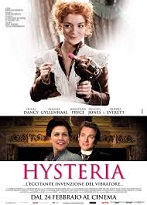
On Sept. 15, 2011 Tanya Wexler's Hysteria (Beachfront Films) (Chimera Films) debuts, a British comedy starring Jonathan Pryce as Dr. Robert Dalrymple, and Hugh Dancy as Dr. Mortimer Granville, who invent the vibrator in 1880 to cure female hysteria, becoming wealthy, with Mortimer marrying Dalrymple's feminist daughter Charlotte Dalrymple (Maggie Gyllenhaal); does $9.5M box office.
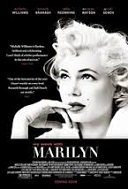
On Oct. 9, 2011 Simon Curtis' My Week with Marilyn (BBC Films) (Weinstein Co.)) debuts, written by Adrian Hodges, starring Michelle Williams as Marilyn Monroe, and Kenneth Branagh as Laurence Olivier (who later claims that the experiment killed his desire to direct again) during a week in 1957 while filming "The Prince and the Showgirl" when he she is being escorted around London by Oliver's asst. Colin Clark (Eddie Redmayne) after her hubby Arthur Miller (Dougray Scott) returns to the U.S., falling for her and getting his heart broken; Judi Dench plays dowager queen Sybil Thorndike; does $35M box office on a £6.4M budget.
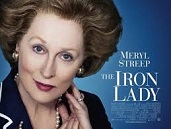
On Dec. 26, 2011 Phyllida Lloyd's The Iron Lady (20th Cent. Fox) (Weinstein Co.) (Icon Productions) debuts, starring Meryl Streep as British PM Margaret Thatcher, Jim Broadbent as her hubby Denis, and Anthony Head as PM Sir Geoffrey Howe; does $115M box office on a $10.6M budget.
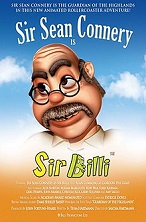
On Apr. 13, 2012 Sascha Hartmann's Sir Billi debuts, becoming the first CGI animated flick from Scotland, about an aging skateboarding veterinarian who fights a war to save Bessie Boo, the last beaver in Scotland; the final role for Sean Connery as Sir Billi.
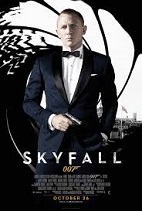
On Oct. 23, 2012 Sam Mendes' Skyfall (Eon Productions) (MGM) (Columbia Pictures) (James Bond 007 film #23) debuts, named after his Scottish estate, starring Daniel Craig as James Bond 007, and Javier Barden as Julian Assange clone blonde bad guy Raoul Silva, a former MI6 agent gone cyberterrorist out to kill M (Judi Dench); Ben Whishaw plays Q, and Naomie Harris plays a black Miss Eve Moneypenny; Albert Finney (after the idea of casting Sean Connery is discarded) plays Kincade the gamekeeper; Ralph Fiennes plays Gareth Mallory, who takes over the M job at the end of the film; the Skyfall Theme Song is performed by Adele; features the reappearance of the original Aston Martin DB5; does $1.1B box office on a $200M budget, #7 of all time, and #1 in the U.K.

On Aug. 28, 2013 Alfonso Cuaron's Gravity (Heyday Films) (Esperanto Filmoj) (Warner Bros.) debuts, starring George Clooney and Sandra Bullock as NASA astronauts Matt Kowalski and Ryan Stone, who are stranded on the damaged Space Shuttle mission STS-157, and must engage in hair-raising space acrobatics to make it to the ISS and the Chinese Tiangong space station to make it back to Earth; does $723.2M box office on a $100M budget. "Don't let go"; watch trailer.
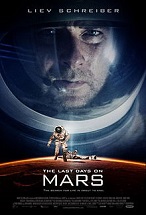
On Dec. 6, 2013 Ruairi Robinson's The Last Days on Mars (British Film Inst.) debuts, based on the short story "The Animators" by Sydney J. Bounds and shot in Jorden and Elstree Studios, starring Liev Schreiber, Elias Koteas, Romola Garai, Johnny Harris et al. as crewmembers of Martian research base Tantalus, who are 19 hours away from the arrival of their rescue spacecraft Aurora when crewmate Marko Petrovic (Goran Kostic) discovers a life form that turns them into zombies; does $24M box office on a $10.6M budget.
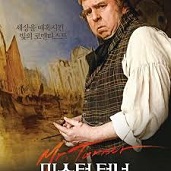
On May 15, 2014 Mike Leigh's Mr. Turner (May 15) (Film4) (Focus Features Internat.) (Thin Man Films) debuts, starring Timothy Spall as English Romantic painter J.M.W. Turner (1775-1851) in his last 25 horny crotchety years; does $17.8M box office on an £8.4M budget; watch trailer.
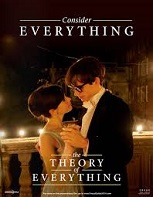
On Sept. 7, 2014 James Marsh's The Theory of Everything (Focus Features) (Universal Pictures) debuts, written by Anthony McCarten based on the memoir "Travelling to Infinity: My Life with Stephen" by Jane Wilde Hawking, starring Eddie Redmayne as Stephen Hawking, and Felicity Jones as his babe Jane Wilde; does $123.7M box office on a $15M budget; watch trailer.
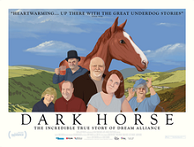
In 2014 Louise Osmond's Dark Horse: The Incredible True Story of Dream Alliance debuts, a British documentary set in South Wales about a racehorse who wins the Welsh Grand National.
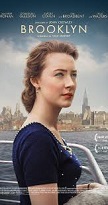
On Jan. 26, 2015 John Crowley's Brooklyn (BBC Films) (20th Cent. Fox) debuts, based on the 2009 Colm Toibin novel set in 1951-2 starring Saoirse Ronan as young Irish woman Ellis Lacy, who emigrates from Enniscorthy, County Wexford to Brooklyn, N.Y., hooking up with Anthony "Tony" Fiorello (Emory Cohen); Jim Broadbent plays Father Flood; does $62.1M box office on a $11M budget; watch trailer.
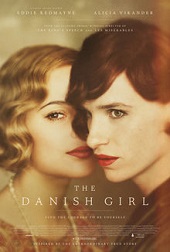
On Sept. 5, 2015 Tom Hooper's The Danish Girl (Focus Features) (Universal Pictures) debuts, based on the 2000 novel by David Ebershoff and the lives of Danish painters Lili Elbe and Gerda Wegener, starring Alicia Vikander (after Charlize Theron, Gwyneth Palstrow, and Marion Cotillad pass it up) as 1920s Copenhagen portraitist Gerda Wegener, who asks her hubby Einar (Eddie Redmayne) to pose in drag, causing him to realize he's really a woman named Lili Elbe, causing them to relocate to Paris and sell the portraits to art dealer Hans Axgil (Matthias Schoenaerts), starting a love triangle that screws with their heads, causing Lili and Gerda to seek the help of German Dr. Kurt Warnekros (Sebastian Koch), who performs a pioneering sex reassignment surgery on Lili, which proves fatal; does $64.2M box office on a $15M budget.
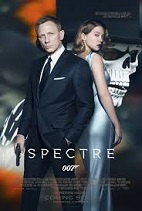
On Oct. 26, 2015 Sam Mendes' Spectre (Eon Productions) (MGM) (Columbia Pictures) debuts (James Bond 007 film #24), starring Daniel Craig as 007 (4th time), and Christoph Waltz as Spectre head Ernst Stavro Blofield, who turns out to be Bond's stepbrother; Dave Bautista plays Spectre assassin Mr. Hinx; Jesper Christensen plays traitor MI6 agent Mr. White, and Lea Seydoux plays his pshrink daughter Madeleine Swann; Ben Whishaw plays Q; Naomie Harris plays Eve Moneypenny; opens with a Day of the Dead Parade in Mexico City, which they didn't actually have, causing them to start one on Oct. 29, 2016; does a record $529 worldwide ($248M in the U.S.) on its opening weekend; does $881M box office worldwide on a $245M budget; the theme is Writing's on the Wall, performed by Sam Smith, winning a best original song Oscar.
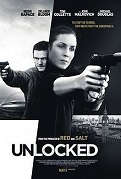
On May 5, 2017 Michael Apted's Unlocked (Di Bonaventura Pictures) (Lionsgate) stars Noomi Rapace as CIA super-spy Alice Racine, who works for station chief Eric Lasch (Michael Douglas) and division chief Bob Hunter (John Malkovich) to track down Am. Muslim convert terrorist David Mercer (Michael Epp) before he can release biological weapons for radical Islamic preacher Imam Yazid Khaleel (Makram Khoury); also stars Orlando Broom as bad guy Jack Alcott, and Philip Brodie as bad guy John Wilson; too bad, the critics pan it for telling too much truth about Islam, and it only does $4.7M box office; watch trailer.
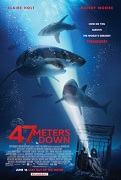
On June 16, 2017 Johannes Roberts' 47 Meters Down (Entertainment Studios) debuts, starring Mandy Moore and Claire Holt as sisters Lisa and Kate, who go in holiday in Mexico and get suckered into a shark cage dive, only to end up trapped on the ocean floor while being stalked by great whites; does $52M box office on a $5M budget.

On July 13, 2017 Christopher Nolan's Dunkirk (Syncopy Inc.) (Warner Bros.) debuts, about the Dunkirk evacuation of May 26-June 4, 1940, ignoring the action in the town for the action on the beach, with first-person visual effects making the audience seasick and airsick at the same time; stars Fionn Whitehead as British Army Pvt. Tommy, and Kenneth Branagh as pier master Cmdr. Bolton; does $525.6M box office on a $100M budget, becoming the highest grossing WWII film so far (unti ?).
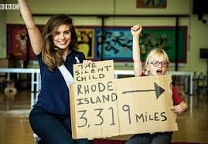
On Aug. 8, 2017 Chris Overton's The Silent Child (Slick Films) (20 min.) debuts, about 4-y.-o. British deaf girl Libby (Maisie Sly), who learns sign language from social worker Joanne (Rachel Shenton).
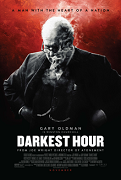
On Sept. 1, 2017 Joe Wright's Darkest Hour (Perfect World Pictures) (Focus Features) debuts, starring Gary Oldman as Sir Winston Churchill taking on Hitler; best performance of Oldman's career?; "A man with the heart of a nation"; view trailer.
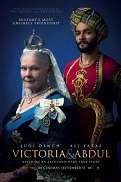
On Sept. 3, 2017 Stephen Fears' Victoria & Abdul (BBC Films) (Universal Pictures) debuts, based on the book by Shrabani Basu, starring Dame Judi Dench as Queen Victoria, and Ali Fazal as Indian clerk Abdul Karim, who travels to England to present her with a mohur (gold coin) for her Golden Jubilee in 1887 and ends up moving in, threatening to Islamize her; does $65.4M box office.
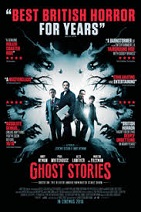
On Oct. 8, 2017 Andy Nyman's and Jeremy Dyson's Ghost Stories (Attitude Film Entertainment) (Lionsgate Films) debuts, based on the 2010 stage play, starring Nyman as Jewish psychic debunker Philip Goodman, becoming the best British horror film of the year; does $3.9M box office; watch trailer.
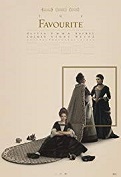
On Aug. 30, 2018 Yorgos Lanthimos' The Favourite (Element Pictures) (Film4 Productions) (Fox Searchlight Pictures) debuts, set during the reign of British Queen Anne (Olivia Colman) co-stars Emma Stone as Abigail Hill and Rachel Weisz as Sarah Churchill, Duchess of Marlborough, who vie for the queen's favor, sexual and otherwise; does $26.8M box office on a $15M budget; watch trailer; view clip.
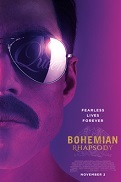
On Oct. 23, 2018 Bryan Singer's and Dexter Fletcher's Bohemian Rhapsody (20th Cent. Fox) (New Regency) (GK Films) debuts, starring Rami Malek as Queen frontman Freddie Mercury after Sacha Baron Cohen is fired; does $743.7M box office on a $55M budget; watch trailer.
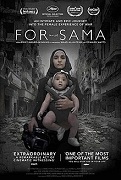
On Mar. 11, 2019 Waad Al-Kateab's For Sama (PBS Frontline) (Channel 4 News) (ITN Productions) debuts, documenting the journey of the director and her hubby Hamza Al-Kateab, one of the last doctors left in Aleppo as they try to raise their young daughter Sama; does $662K box office; becomes the most-nominated feature documentary of BAFTA (4 categories).
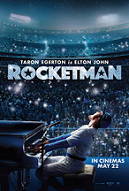
On May 16, 2019 Dexter Fletcher's Rocketman (New Repub. Pictures) (Marv Films) (Rocket Pictures) (Paramount Pictures) debuts, starring Taron Egerton as British gay pop star Elton John AKA Reginald Kenneth "Reggie" Dwight (b. 1947), Jamie Bell as his straight songwriter friend Bernie Taupin; does $25M box office on a $40M budget; watch trailer.
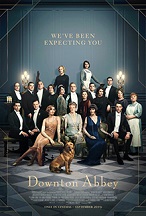
On Sept. 13, 2019 Michael Engler's Downton Abbey (Perfect World Pictures) (Carnival Films) (Focus Features), based on the BBC-TV series set in 1927 sees a lily white cast enthrall a mainly lily white audience with visions of the glory days; stars Hugh Bonneville and Elizabeth McGovern as the Earl and Countess of Grantham, Simon Jones as George V, and Gerldine James as Queen Mary; does ? box office on a $13M budget; watch trailer.